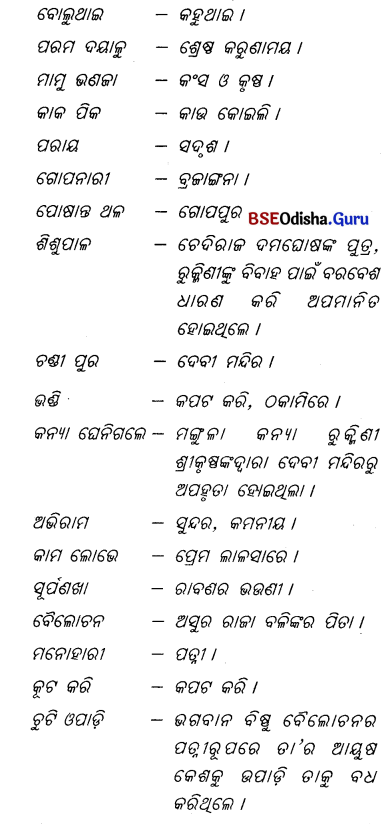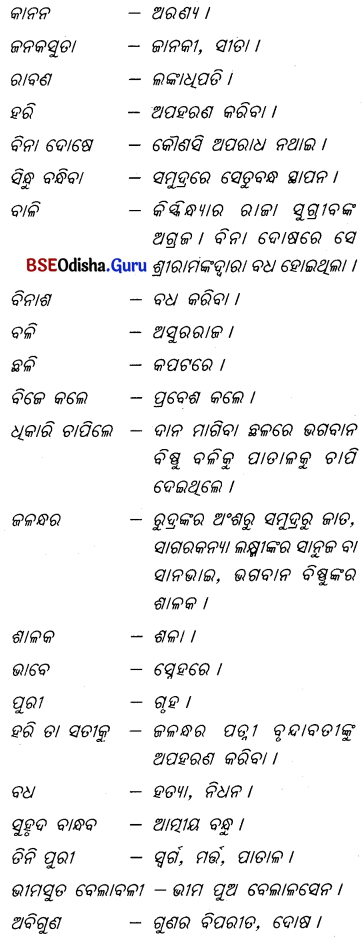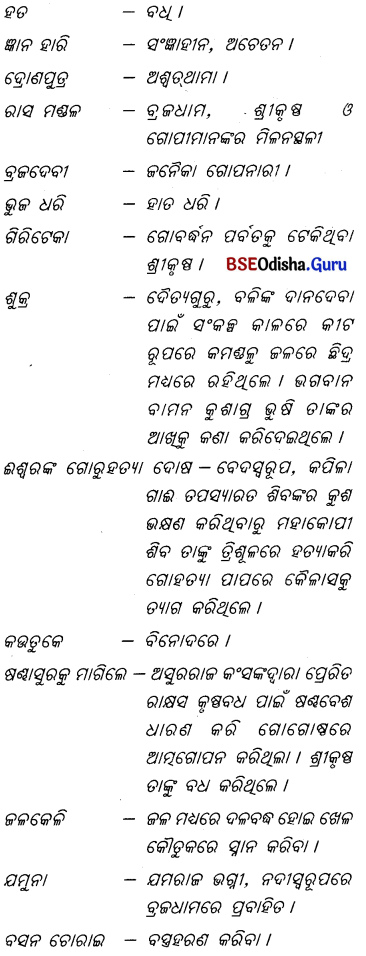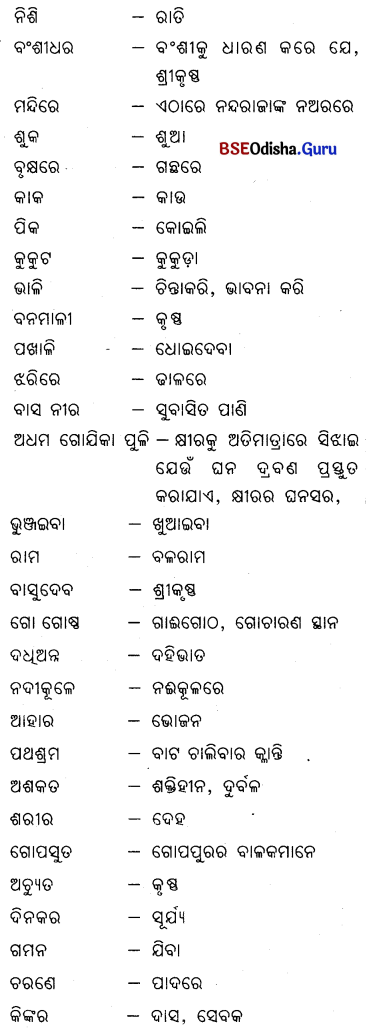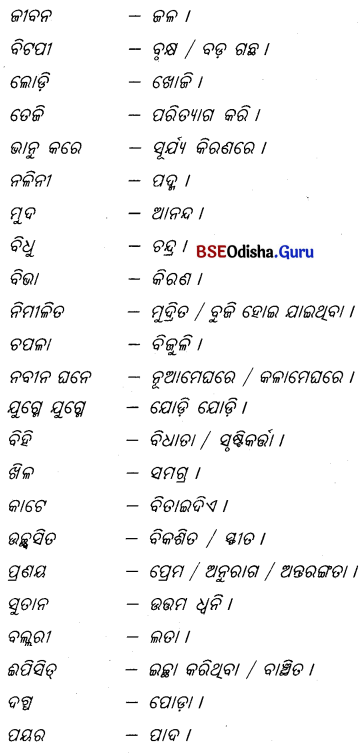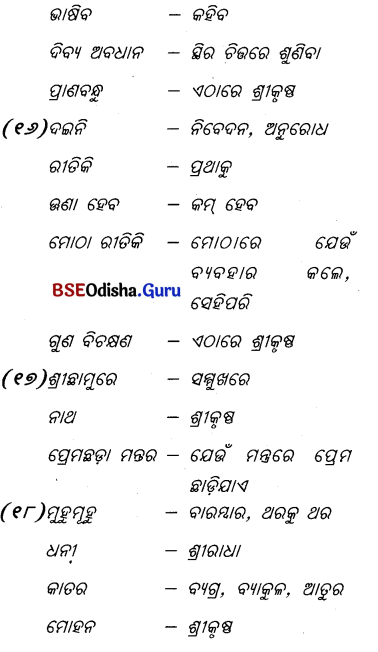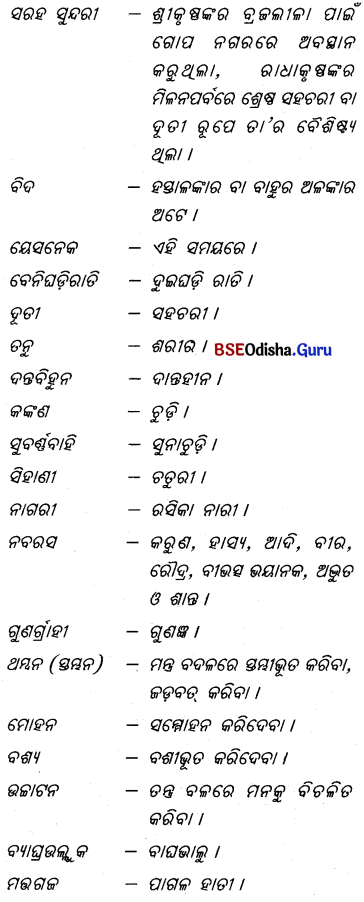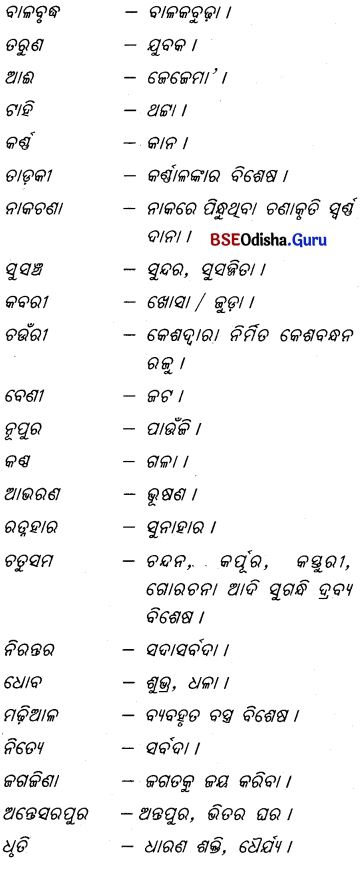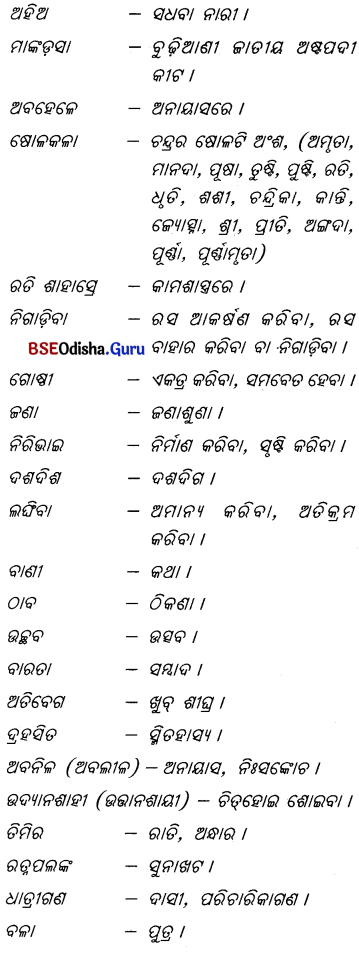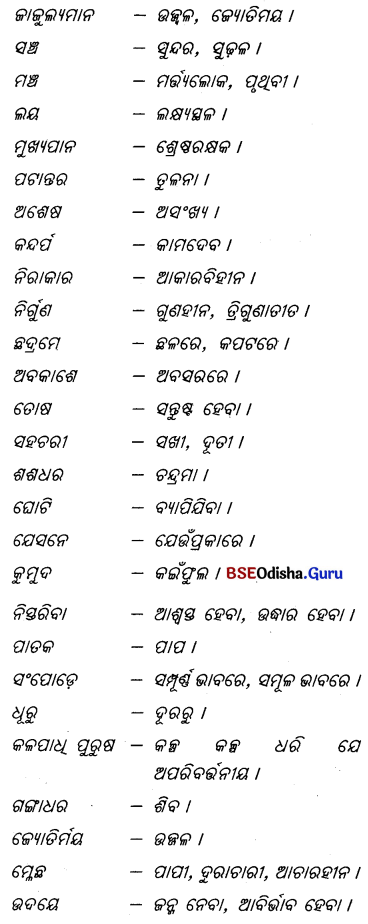Odisha State Board CHSE Odisha Class 12 Odia Solutions Chapter 10 ସଭ୍ୟ ଜମିଦାର Textbook Exercise Questions and Answers.
CHSE Odisha Class 12 Odia Chapter 10 ସଭ୍ୟ ଜମିଦାର Question Answer
ପାଠ୍ୟପୁସ୍ତକସ୍ଥ ପ୍ରଶ୍ନବଳୀର ଉତ୍ତର
(କ) ସଂକ୍ଷିପ୍ତ ଉତ୍ତରମୂଳକ ପ୍ରଶ୍ନ । ଚାରିଗୋଟି ସମ୍ଭାବ୍ୟ ଉତ୍ତର ମଧ୍ୟରୁ ଠିକ୍ ଉତ୍ତରଟି ବାଛି ଲେଖ । ପ୍ରଶ୍ନର ମୂଲ୍ୟ ୧ ନମ୍ବର ।
Question ୧।
କଲିକତା ଆମଦାନି ମାଲ ମଧ୍ୟରେ କିଏ ପ୍ରଧାନ ଥିଲା ?
ସବାଇଘାସ, ଧୂଆଁପତ୍ର, ହଳଦୀପତ୍ର, ତେଜପତ୍ର ।
Answer:
ଧୂଆଁପତ୍ର
Question ୨ ।
ମହାଜନ ବାବୁ ବଳରାମ ବଳଙ୍କର ଘର ଓଡ଼ିଶାର କେଉଁ ଅଞ୍ଚଳରେ ?
ବାଲେଶ୍ଵର, ଯାଜପୁର, କେନ୍ଦ୍ରାପଡ଼ା, କେନ୍ଦୁଝର ।
Answer:
ଯାଜପୁର
Question ୩ ।
ମହାଜନ ବଳରାମ ଜଣେ ସଉଦାଗରଠାରୁ କେଉଁ ମୋହର କିଣିଥିଲେ ?
କାବୁଲୀ, ଆକବରୀ, ବର୍ଦ୍ଧମାନୀ, ସାହାଜାହାନୀ ।
Answer:
ଆକବରୀ
Question ୪।
ବାବୁ ବଳରାମଙ୍କ ଚାକରର ନାମ କ’ଣ ଥିଲା ?
ଗୋବିନ୍ଦା, ମାଧୁଆ, ପଦିଆ, ବିଦିଆ ।
Answer:
ବିଦିଆ
Question ୫।
କେଉଁ ହୁକାରେ ବାବୁ ବଳରାମ ଗୁଡ଼ାଖୁ ପିଅନ୍ତି ?
ରୂପାବନ୍ଧା, ସୁନାବନ୍ଧା, ପିତଳବନ୍ଧା, ତମ୍ବାବନ୍ଧା ।
Answer:
ରୂପାବନ୍ଧା
Question ୬।
କଲିକତାକୁ ଠିକ୍ କେଉଁ ଖଣି ବୋଲି କୁହାଯାଇଛି ?
ହରିଲୁଟ୍ ଖଣି, ଚୋରାଖଣି, ତଣ୍ଟିକଟା ଖଣି, ଗଣ୍ଠିକଟା ଖଣି ।
Answer:
ଗଣ୍ଠିକଟା ଖଣି

Question ୭ ।
ବାବୁ ବଳରାମ କେବଳ କେଉଁ ବ୍ରାହ୍ମଣ ହାତରୁ ଖାଉଥା’ନ୍ତି ?
ଓଡ଼ିଆ, ବଙ୍ଗାଳୀ, ବିହାରୀ, କାଶି ।
Answer:
ଓଡ଼ିଆ
Question ୮ ।
ଗୋପାଳର ନାଁ ‘ବାବୁ ଗୋପାଳ ଚନ୍ଦ୍ର ମହାପାତ୍ର’ ବୋଲି କିଏ ଲେଖୁଥାଏ ?
ମୋହରୀର, ଗୁମାସ୍ତା, ମୁସ୍ତରୀ, ମେନେଜର ।
Answer:
ଗୁମାସ୍ତା
Question ୯।
ମହାପାତ୍ରେ, ବାବୁ ବଳରାମଙ୍କ ବ୍ୟବସାୟର କେତେ ଅଂଶୀଦାର ଥିଲେ ?
ଚାରିପଣୀ, ଆଠପଣୀ, ଦୁଇପଣୀ, ଛଅପଣୀ ।
Answer:
ଚାରିପଣୀ
Question ୧୦ ।
ଦେବୀ ଓଝା କିଏ ?
ସରପଞ୍ଚ, ୱାର୍ଡ଼ମେମ୍ବର, ଅବଧାନ, ଦୋକାନୀ ।
Answer:
ଅବଧାନ
Question ୧୧ ।
‘କୁସଂସ୍କାର – ବିମର୍ଦ୍ଦିନୀ’ ସଭାର ଅଧୂବେଶନ କେଉଁଦିନ ହୋଇଥାଏ ?
ରବିବାର, ସୋମବାର, ମଙ୍ଗଳବାର, ଗୁରୁବାର ।
Answer:
ମଙ୍ଗଳବାର
Question ୧୨ ।
ଶନିବାର ଦିନ କେଉଁ ସଭାର ଅଧିବେଶନ ହୋଇଥାଏ ?
ନାରୀ ମଙ୍ଗଳ କାରିଣୀ, ନାରୀ ସ୍ଵାଧୀନତା ବିବର୍ତ୍ତନୀ, ନାରୀ ସଶକ୍ତିକାରିଣୀ, କୁସଂସ୍କାର ବିମର୍ଦ୍ଦିନୀ ।
Answer:
ନାରୀ ସ୍ଵାଧୀନତା ବିବର୍ତ୍ତନୀ
Question ୧୩ ।
କେଉଁ ବେମାରୀରେ ଗୋପାଳ ଚନ୍ଦ୍ରଙ୍କର ମୃତ୍ୟୁ ହୋଇଥିଲା ?
ବସନ୍ତ, ଯକ୍ଷ୍ମା, ସନ୍ନିପାତ, ଝାଡ଼ାବାନ୍ତି ।
Answer:
ସନ୍ନିପାତ
Question ୧୪।
‘ଗଙ୍ଗାଲାଭ’ ବୋଇଲେ କ’ଣ ବୁଝ ?
ବ୍ରତ, ପୁଣ୍ୟ, ସ୍ନାନ, ମୃତ୍ୟୁ ।
Answer:
ମୃତ୍ୟୁ
Question ୧୫ ।
ଯାହାର ଧନ, ଜ୍ଞାନ ଅଛି, ସେ କ’ଣ କଲେ ତା’ ଜୀବନ ଧ୍ଵ ହୋଇଯାଏ ବୋଲି ସଭାରେ କୁହାଯାଇଥିଲା ?
ଘରେ ବସି ରହିଲେ, ବ୍ୟବସାୟ କଲେ, ଚାକିରି କଲେ, ବେକାର ହୋଇଗଲେ ।
Answer:
ଚାକିରି କଲେ
Question ୧୬ ।
କେଉଁ ନାମ ଶୁଣି ‘ନୂଆ ଜମିଦାର’ଙ୍କ ମନ ଭାରି ଖୁସି ହୋଇଥୁଲା ?
ସଭା, ସ୍କୁଲ, ଗାଆଁ, ଜମିଦାରୀ ।
Answer:
ସଭା
Question ୧୭ ।
ତାଲୁକ କିଣାଠାରୁ ରଙ୍ଗାଧର ମହାନ୍ତି କେଉଁ କାମରେ ଥିଲେ ?
ମୁଖ୍ୟ ଗୁମାସ୍ତା, ଛାମୁକରଣ, ଶେଠ ପାଞ୍ଜିଆ, ଗଦି ସରକାର ।
Answer:
ଶେଠ ପାଞ୍ଜିଆ
Question ୧୮ ।
ତାଲୁକ ମଧ୍ୟରେ କେଉଁ ଗ୍ରାମଟି ସବୁଠାରୁ ବଡ଼ ଥିଲା ?
ମଦନପୁର, ମାନପୁର, ନରଣପୁର, ଶ୍ୟାମପୁର ।
Answer:
ଶ୍ୟାମପୁର
Question ୧୯ ।
‘ନୂଆ ଜମିଦାର’ ବାବୁ ଶ୍ୟାମପୁର ଗ୍ରାମରେ କେଉଁ ଲୋକଙ୍କୁ ଖୋଜି ବସିଥିଲେ ?
ଶିକ୍ଷିତ ବେକାର, ଶିକ୍ଷିତ ସମାଜସେବୀ, ଶିକ୍ଷିତ ସମାଜ-ସଂସ୍କାରକ, ଶିକ୍ଷିତ କୁସଂସ୍କାର ବର୍ଜିତ ।
Answer:
ଶିକ୍ଷିତ କୁସଂସ୍କାର ବର୍ଜିତ
Question ୨୦ ।
ଏ ଦେଶର ଦୁଃଖଦୁର୍ଦ୍ଦଶାର କାରଣ ଲୋଡ଼ିଲେ ତାହା କେଉଁପରି ଜଣାଯିବ ବୋଲି ନୂଆ ଜମିଦାର ବକ୍ତୃତାରେ କହିଥିଲେ ?
ଡାହାଣୀ ଆଲୁଅ, ଦିନ ଆଲୁଅ, ଆତସବାଜୀ ଆଲୁଅ, ଲଣ୍ଠନ ଆଲୁଅ ।
Answer:
ଦିନ ଆଲୁଅ

Question ୨୧ ।
ସୁଶିକ୍ଷିତ ଜମିଦାର ମହୋଦୟଙ୍କ ପ୍ରସ୍ତାବକୁ କିଏ ଦୁତୀୟ କରିଥିଲେ ?
ଗାହ୍ଲବ ପଟ୍ଟନାୟକ, ବହୁଭ ରାୟ, ହରିବୋଲ ପଟ୍ଟନାୟକ, ରଙ୍ଗାଧର ମହାନ୍ତି ।
Answer:
ହରିବୋଲ ପଟ୍ଟନାୟକ
Question ୨୨ ।
‘ନୂଆ ଜମିଦାର’ଙ୍କ ବିବାହ ପାଇଁ କେଉଁଠାରେ କନ୍ୟା ଠିକ୍ ହୋଇଥିଲା ?
କଟକ, କଲିକତା, ବାଲେଶ୍ଵର, ଯାଜପୁର ।
Answer:
କଲିକତା
Question ୨୩ ।
କନ୍ୟାପିତା ମକ୍ରା ମଳିକ ଆସାମ ଚା’ ବଗିଚାରେ ପଦୋନ୍ନତି ପାଇ ଶେଷରେ କ’ଣ ହୋଇଥିଲା ?
ଖାନସମା, ବବୁର୍ଚି, କୁଲିସର୍ଦାର, ମେନେଜର ।
Answer:
ଖାନସମା
Question ୨୪ ।
ସାଆନ୍ତାଣୀଙ୍କର ବିଶ୍ଵାସୀ ପୋଇଲି କିଏ ?
ଫୁଲ, କନି, ରାଧୀ, ପଦୀ
Answer:
ରାଧୀ
Question ୨୫ ।
କୁମ୍ଭୀର କ୍’ଣ ଖୋଜିଥାଏ ବୋଲି କୁହାଯାଇଛି ?
ଲୁଣି ପାଣି, କାଦୁଆ ପାଣି, ଗୋଳିଆ ପାଣି, ପଙ୍କୁଆ ପାଣି ।
Answer:
ଗୋଳିଆ ପାଣି
(ଖ) ସଂକ୍ଷିପ୍ତ ଉତ୍ତରମୂଳକ ପ୍ରଶ୍ନ । ଗୋଟିଏ ବାକ୍ୟରେ ଉତ୍ତର ଲେଖ । ପ୍ରତ୍ୟେକ ପ୍ରଶ୍ନର ମୂଲ୍ୟ ୧ ନମ୍ବର ।
Question ୧ ।
କଲିକତା ବଡ଼ବଜାରରେ ବାବୁ ବଳରାମଙ୍କର ପରିଚୟ କ’ଣ ଥିଲା ?
Answer:
କଲିକତା ବଡ଼ବଜାରରେ ବାବୁ ବଳରାମଙ୍କର ପରିଚୟ ଗଦିଆନି ମହ।ଜଳ ଥିଲା
Question ୨ ।
‘ଦୋକ୍ତା’ କାରବାର କାହା ସହ ସମାନ ବୋଲି ମହାଜନେ କହିଥା’ନ୍ତି ?
Answer:
‘ଦୋକ୍ତା’ କାରବାର ଗୋଖର ସାପ ଖେଳାଇବା ସହ ସମାନ ବୋଲି ମହାଜନେ କହିଥା’ନ୍ତି ।
Question ୩ ।
କଲିକତା ମାଲ୍ ଆମଦାନି ରପ୍ତାନି କେଉଁଥିରେ ହେଉଥିଲା ?
Answer:
କଲିକତା ମାଲ୍ ଆମଦାନି ରପ୍ତାନି ବାଲେଶ୍ଵର ଜାହାଜରେ ହେଉଥିଲା ।
Question ୪।
ବଳରାମ ବଳଙ୍କର ଓଡ଼ିଶାରେ କାହିଁକି ନାମଡାକ ଥିଲା ?
Answer:
ବଳରାମ ବଳଙ୍କର ଓଡ଼ିଶାରେ ଜଣେ ଚିହ୍ନରା ଦଣ୍ଡିଦାର ଭାବରେ ନାମ ଡାକ ଥିଲା ।
Question ୫ ।
କଲିକତାରେ କେତେବେଳେ ତୋପ ପଡ଼େ ବୋଲି କୁହାଯାଇଛି ?
Answer:
କଲିକତାରେ କୁକୁଡ଼ା ଡାକ ଆଗରୁ ତୋପ ପଡ଼େ ବୋଲି କୁହାଯାଇଛି ।
Question ୬ ।
କପାଳିଆ ଲୋକକୁ କ’ଣ ମିଳିଥାଏ ବୋଲି କୁହାଯାଇଛି ?
Answer:
କପାଳିଆ ଲୋକକୁ ଆକବରୀ ମୋହର ମିଳିଥାଏ ବୋଲି କୁହାଯାଇଛି।
Question ୭ ।
କେଉଁଦିନରୁ ଦିନକୁ ଦିନ ଗୋପାଳର ଘର ବଢୁଥିଲା ?
Answer:
ପହରା ପଡ଼ିବା ଦିନରୁ ଦିନକୁ ଦିନ ଗୋପାଳର ଘର ବଢୁଥିଲା ।
Question ୮ ।
କେଉଁ କଥା ଗୋପାଳ ବେଶ୍ ଜାଣିଗଲାଣି ବୋଲି କୁହାଯାଇଛି ?
Answer:
ମାଲ କିଣାବିକା ଛକଛାକ ଗୋପାଳ ବେଶ୍ ଜାଣିଗଲାଣି ବୋଲି କୁହାଯାଇଛି ।
Question ୯ ।
ଗୋପାଳ, ବେପାରରେ ବାବୁ ବଳରାମଙ୍କର କ’ଣ ପରି ଥିଲା ?
Answer:
ଗୋପାଳ ବେପାରରେ ବାବୁ ବଳରାମଙ୍କର ଡାହାଣ ହାତ ପରିଥିଲା ।
Question ୧୦ ।
ଗଦିରେ ଗୋପାଳର ଡାକନାମ କ’ଣ ହୋଇଥିଲା ?
Answer:
ଗଦିରେ ଗୋପାଳର ଡାକନାମ ସାନବାବୁ ହୋଇଗଲା ।
Question ୧୧ ।
ବେପାରରେ ଲାଭ କେଉଁ ଜାଗାରେ ବୋଲି ମହାପାତ୍ରେ, ମହାଜନ ବଳଙ୍କୁ କହିଛନ୍ତି ?
Answer:
ବେପାରରେ ଲାଭ କିଣାଜାଗାରେ ବୋଲି ମହାପାତ୍ରେ, ମହାଜନ ବଳଙ୍କୁ କହିଛନ୍ତି ।
Question ୧୨ ।
ଗଦିର କେଉଁସବୁ କଥା ମହାପାତ୍ରଙ୍କ ହାତରେ ଥିଲା ?
Answer:
ଗଦିର ମାମଲତ ତହବିଲ କଥା ମହାପାତ୍ରଙ୍କ ହାତରେ ଥିଲା ।
Question ୧୩ ।
‘ବଳେ’, ତୁନି ହୋଇ ଗଦିରେ କ’ଣ କରିଥା’ନ୍ତି ବୋଲି କୁହାଯାଇଛି ?
Answer:
‘ବଳେ’, ତୁନି ହୋଇ ଗଦିରେ ମାଳା ଗଢ଼ାଉଥା’ନ୍ତି ବୋଲି କୁହାଯାଇଛି ।
Question ୧୪ ।
ମହାପାତ୍ରଙ୍କଠାରୁ ଅବଧାନେ କେତେ ଟଙ୍କା ପୁରସ୍କାର ପାଇଥିଲେ ?
Answer:
ମହାପାତ୍ରଙ୍କଠାରୁ ଅବଧାନେ ପାଞ୍ଚୋଟି ଟଙ୍କା ପୁରସ୍କାର ପାଇଥିଲେ ।
Question ୧୫ ।
ବଳବାବୁ ମହାଜନ ଗଦି ସାଙ୍ଗରେ କାହାର କାରବାର ଥିଲା ?
Answer:
ବଳବାବୁ ମହାଜନ ଗଦି ସାଙ୍ଗରେ ବଡ଼ ବଡ଼ ଇଂରାଜୀ ସଉଦାଗର ହାଉସ୍ମାନଙ୍କର କାରବାର ଥିଲା ।
Question ୧୬ ।
ଗଦିର ସରକାର କେଉଁଠାରେ ରାଜୀବବାବୁଙ୍କ ନାମ ଲେଖାଇ ଦେଇ ଆସିଥିଲେ ?
Answer:
ଗଦିର ସରକାର କୋଲ୍ଡକାଟା ଏଣ୍ଟ୍ ଏକାଡ଼େମୀରେ ରାଜୀବବାବୁଙ୍କ ନାମ ଲେଖାଇ ଦେଇ ଆସିଥିଲେ ।

Question ୧୭ ।
କେଉଁ କଥାଟା କଲିକତାର ନିୟମ ବୋଲି କୁହାଯାଇଛି ?
Answer:
ସଭାର ସମସ୍ତ ବ୍ୟୟ ବହନ କରିବା ସମ୍ପାଦକ ପକ୍ଷରେ ଉଚିତ କଥାଟା କଲିକତାରେ ନିୟମ ବୋଲି କୁହାଯାଇଛି।
Question ୧୮।
ପିତାଙ୍କ ମୃତ୍ୟୁରେ କେଉଁ କଥାଟା କୁସଂସ୍କାର ବୋଲି ରାଜୀବଲୋଚନ କହିଛନ୍ତି ?
Answer:
ପିତାଙ୍କ ମୃତ୍ୟୁରେ ଡକାପକାଇ କାନ୍ଦିବା ଗୋଟାଏ କୁସଂସ୍କାର ବୋଲି ରାଜୀବଲୋଚନ କହିଛନ୍ତି ।
Question ୧୯ ।
ଗୋପାଳ ଚନ୍ଦ୍ର ମହାପାତ୍ର ତିଆରି କରିଥିବା ମନ୍ଦିରରେ କେଉଁ ମୂର୍ତ୍ତି ସ୍ଥାପିତ ହୋଇଥିଲା ?
Answer:
ଗୋପାଳ ଚନ୍ଦ୍ର ମହାପାତ୍ର ତିଆରି କରିଥିବା ମନ୍ଦିରରେ ରାଧାକୃଷ୍ଣ ଯୁଗଳ ମୂର୍ତ୍ତି ସ୍ଥାପିତ ହୋଇଥିଲା ।
Question ୨୦ ।
କେଉଁ ସଂସ୍ଥାରୁ ଯେପରି ବ୍ୟବସ୍ଥା ଆସିବ, ସେପରି ବିଭା ହେବ ବୋଲି କୁହାଯାଇଛି ?
Answer:
ବିହାର ବିବାହ-ବ୍ୟୟ-ସଂକ୍ଷେପଣୀ ସଭାରୁ ଯେପରି ବ୍ୟବସ୍ଥା ଆସିବ, ସେପରି ବିଭା ହେବ ବୋଲି
Question ୨୧ ।
କଲିକତା ଗୋଟିଏ ବିଚିତ୍ର ଜାଗା ବୋଲି କାହିଁକି କୁହାଯାଇଛି ?
Answer:
କଲିକତା ଗୋଟିଏ ବିଚିତ୍ର ଜାଗା ବୋଲି କୁହାଯାଇଛି, କାରଣ ଟଙ୍କା ଦେଲେ ସେଠାରେ ମା’ ବାପା ଛଡ଼ା ସବୁ ମିଳିବ ।
Question ୨୨ ।
କଲିକତାର ମହାଜନ ସଭ୍ୟ ଜମିଦାରଙ୍କୁ ଦଶ ହଜାର ଟଙ୍କା କରଜ ଦେଇଥିଲେ କିପରି ?
Answer:
ଖୁବ୍ କାଇଦା କଟକଣାରେ ଜମିଦାରୀ ଲେଖୁଇ କଲିକତାର ମହାଜନ ସଭ୍ୟ ଜମିଦାରଙ୍କୁ ଦଶ ହଜାର ଟଙ୍କା କରଜ ଦେଇଥିଲା ।’
Question ୨୩ ।
ପୁଅ-ବୋହୂ ହାତ ଧରାଧରି ହୋଇ କୁଆଡ଼େ ବାହାରିଥିବାର କୁହାଯାଇଛି ?
Answer:
ପୁଅ-ବୋହୂ ହାତ ଧରାଧରି ହୋଇ ମା’ ସାଆନ୍ତାଣୀଙ୍କ ସହିତ ସାକ୍ଷାତ କରିବାକୁ ବାହାରିଥିବାରୁ କୁହାଯାଇଛି ।
Question ୨୪ ।
ମା’ ସ୍ଵାଆନ୍ତାଣୀ କେଉଁ କଥା ଶୁଣି ଚମକି ପଡ଼ି ଠିଆ ହୋଇଗଲେ ?
Answer:
ବୋହୂର ଗୋଡ଼ରେ ଲେଡ଼ିଜୋତା ଏଡ଼ିର ଠକ୍ ଠକ୍ ଶବ୍ଦ ଶୁଣି ମା’ ସାଆନ୍ତାଣୀ ଚମକିପଡ଼ି ଠିଆ
Question ୨୫ ।
ମା’ ସାଆନ୍ତାଣୀ ଘରୁ ବାହାରିଯାଇ କେଉଁଠି ରହିଥିର ସମ୍ବାଦ ଆସିଥିଲା ?
Answer:
ମା’ ସାଆନ୍ତାଣୀ ଘରୁ ବାହାରି ଯାଇ ପୁରୀର ମାତାମଠରେ ରହିଥିବାର ସମ୍ବାଦ ଆସିଥିଲା ।
Question ୨୬ ।
ବୋହୂ-ସାଆନ୍ତାଣୀଙ୍କୁ କେଉଁ ନାମରେ ଡାକିବାକୁ ଜମିଦାରବାବୁ ଚାହୁଁଥିଲେ ?
Answer:
ବୋହୂ-ସାଆନ୍ତାଣୀଙ୍କୁ ମିସେସ୍ ମହାପାତ୍ର ନାମରେ ଡାକିବାକୁ ଜମିଦାରବାବୁ ଚାହୁଁଥିଲେ ।
Question ୨୭ ।
ଗୋରୁଗୁହ କେଉଁଠି ଢଳାଯାଇଛି ଶୁଣି ଜମିଦାରବାବୁ ଖପା ହୋଇଥିଲେ ?
Answer:
ଗୋରୁଗୁହ ବବୁର୍ଜିଖାନାରେ ଢଳାଯାଇଛି ଶୁଣି ଜମିଦାର ବାବୁ ଖପା ହୋଇଥିଲେ ।
Question ୨୮ ।
ମିଷ୍ଟର ଓ ମିସେସ୍ ମହାପାତ୍ର ଘରେ ଆଉ ରହିପାରିଲେ ନାହିଁ କାହିଁକି ?
Answer:
ମିଷ୍ଟର ଓ ମିସେସ୍ ମହାପାତ୍ର ଡିକ୍ରୀଜାରି ପିଆଦା ଜୁଲମରେ ଆଉ ଘରେ ରହିପାରିଲେ ନାହିଁ ।
Question ୨୯ ।
ଜମିଦାରବାବୁ ପାଞ୍ଚ ଛ’ ବର୍ଷ ପରେ କ’ଣ କରୁଥିବାର ଶୁଣାଯାଇଥିଲା ?
Answer:
ଜମିଦାରବାବୁ ପାଞ୍ଚ ଛ’ ବର୍ଷ ପରେ ତାଙ୍କ ଶ୍ଵଶୁର କାମରେ ଆସାମରେ ଖାନସମାଗିରି କାମ କରୁଥିବାର ଶୁଣାଯାଇଥିଲା ।
Question ୩୦ ।
ବୋହୂ-ସାଆନ୍ତାଣୀଙ୍କ ପ୍ରକୃତ ନାମ କ’ଣ ଥିଲା ?
Answer:
ବୋହୂ-ସାଆନ୍ତାଣୀଙ୍କ ପ୍ରକୃତ ନାମ ‘ନୟନତ।ରା – ଦୁଃଖପାସୋରା’ ଥିଲା ।
(ଗ) ସଂକ୍ଷିପ୍ତ ଉତ୍ତରମୂଳକ ପ୍ରଶ୍ନ । ଦୁଇଟି ବାକ୍ୟରେ ଉତ୍ତର ଲେଖ । ପ୍ରଶ୍ନର ମୂଲ୍ୟ ୨ ନମ୍ବର । ଲେଖା ଓ ଲେଖକଙ୍କ ସୂଚନା ପାଇଁ ୧ ନମ୍ବର ଓ ଠିକ୍ ଉତ୍ତର ପାଇଁ ୧ ନମ୍ବର ।
ଗଳ୍ପ – ସଭ୍ୟ ଜମିଦାର, ଗାଳ୍ପିକ – ଫକିରମୋହନ ସେନାପତି
Question ୧।
ଧୂଆଁପତ୍ର କାରବାର ସମ୍ପର୍କରେ କ’ଣ କୁହାଯାଇଛି ?
Answer:
ଧୂଆଁପତ୍ର କାରବାର ବଡ଼ କଠିନ ବୋଲି କୁହାଯାଇଛି ।
Question ୨ ।
ଗୋପାଳ କିପରି କଲିକତା ଯାଇଥିଲା ?
Answer:
ଗୋପାଳକୁ ମହାଜନ ଦୟାକରି ସାଙ୍ଗରେ କଲିକତା ନେଇଯାଇଥିଲେ ।
Question ୩ ।
କଲିକତା ଗଦିରେ ଗୋପାଳ ପ୍ରଥମେ କିପରି ଥିଲା ?
Answer:
କଲିକତା ଗଦିରେ ଗୋପାଳ ଖାଉଛି ତ ଖାଉଛି, ଅଛି ତ ଅଛି, ତାକୁ କେହି ଦେଖାଶୁଣା କରିବାକୁ ନ ଥିଲେ ।
Question ୪ ।
ମୋହର ପୋଟଳା ଦେଖୁ ଗୋପାଳ କ’ଣ କରିଥିଲା ?
Answer:
ମୋହର ପୋଟଳା ଦେଖୁ ଗୋପାଳ ତାହାକୁ ହାତରେ ଧରି ବାବୁଙ୍କ ପାଖକୁ ଧାଇଁଲା ଏବଂ ବାବୁଙ୍କୁ ନ ପାଇ ତାହାକୁ ତାଙ୍କ ପଲଙ୍କ ତକିଆ ତଳେ ଥୋଇଦେଲା ।
Question ୫ ।
କୁକୁଡ଼ା ଡାକ ଆଗରୁ ଗଦିଆନ ଧାର୍ମିକ ହିନ୍ଦୁ ମହାଜନମାନେ କ’ଣ କରିଥା’ନ୍ତି ?
Answer:
କୁକୁଡ଼ା ଡାକ ଆଗରୁ ଗଦିଆନ ଧାର୍ମିକ ହିନ୍ଦୁ ମହାଜନମାନେ ଗଙ୍ଗାସ୍ନାନକୁ ବାହାରିଯା’ନ୍ତି ।

Question ୬ ।
କପାଳିଆ ଲୋକକୁ କ’ଣ ମିଳିଥାଏ ଓ ସେ ଗଲେ କ’ଣ ହୋଇଥାଏ ?
Answer:
କପାଳିଆ ଲୋକକୁ ଆକବରୀ ମୋହର ମିଳିଥାଏ ଓ ସେ ଗଲେ ଲକ୍ଷ୍ମୀ ଛାଡ଼ି ଯାଇଥାଏ ।
Question ୭ ।
ରୋଷେଇଆ ବ୍ରାହ୍ମଣ ସମ୍ପର୍କରେ କ’ଣ କୁହାଯାଇଛି ?
Answer:
ରୋଷେଇଆ ବ୍ରାହ୍ମଣ, ବାବୁଙ୍କ ସିନ୍ଦୁକର ତାଲା ଭାଙ୍ଗି, ସେଥୁରୁ ପାଞ୍ଚଶହ ଟଙ୍କାର ଥଳିଟା ନେଇ ଚାଲିଯାଇଥିଲା ।
Question ୮ ।
ଗୋପାଳ କେମିତି ରାନ୍ଧି ଶିଖୂଲା ବୋଲି କହିଛି ?
Answer:
ପୂଝାରୀ ରାନ୍ଧୁଥୁଲାବେଳେ ଗୋପାଳ ଦେଖୁ ଦେଖୁ ରନ୍ଧା ଶିଖୁ ବୋଲି କହିଛି ।
Question ୯ ।
ବାବୁ ବଳରାମ ଗାଁକୁ ଯାଇ ପ୍ରଥମେ ଗୋପାଳ ପାଇଁ କ’ଣ କରିଥିଲେ ?
Answer:
ବାବୁ ବଳରାମ ଗାଁକୁ ଯାଇ ପ୍ରଥମେ ଗୋଟିଏ ଘର ବନାଇ ଦେଇ, ଗୋପାଳକୁ ବିଭା କରାଇଦେଲେ ।
Question ୧୦ ।
ରନ୍ଧାବଢ଼ା ସାରି ଗୋପାଳ ଗଦିରେ କ’ଣ କରିଥାଏ ?
Answer:
ରନ୍ଧାବଢ଼ା ସାରି ଗୋପାଳ ଗଦିରେ ସବୁବେଳେ ବାବୁଙ୍କ ପାଖେ ପାଖେ ଥାଏ ଏବଂ କାମରେ ସାହାଯ୍ୟ ଉ କରିଥାଏ ।
Question ୧୧ ।
ଦିନେ ବେଳ ଉଣ୍ଡି ମହାଜନ ବଳଙ୍କୁ ମହାପାତ୍ର କ’ଣ ଜଣାଇଥିଲେ ?
Answer:
ଦିନେ ବେଳ ଉଣ୍ଡି ମହାଜନ ବଳଙ୍କୁ ମହାପାତ୍ର ଜଣାଇଲେ, ‘ଆଜ୍ଞା ବେପାର ଲାଭ ବିକା ଜାଗାରେ ନୁହେଁ, କିଣା ଜାଗାରେ ।’
Question ୧୨ ।
ସାନବାବୁଙ୍କ ସମ୍ପର୍କରେ ଅବଧାନେ ମହାପାତ୍ରକୁ କ’ଣ କହିଛନ୍ତି ?
Answer:
ସାନବାବୁଙ୍କ ସମ୍ପର୍କରେ ଅବଧାନେ ମହାପାତ୍ରଙ୍କୁ କହିଛନ୍ତି, ‘ସାନବାବୁ ଖୁବ୍ ବୁଦ୍ଧିଆ ଓ ଭାରି ପାଠୁଆ ଏବଂ ଖଡ଼ି ପାଠ, ପୋଥ୍ୟାଏଁ ସରିଲାପରେ ଆଉ ତାଙ୍କୁ ପଢ଼ାଇବାକୁ ପାଠ ନାହିଁ ।’’
Question ୧୩ ।
ରାଜୀବ ସମ୍ପର୍କରେ ସାଆନ୍ତାଣୀ ସାଆନ୍ତଙ୍କୁ କ’ଣ କହିଛନ୍ତି ?
Answer:
ରାଜୀବ ସମ୍ପର୍କରେ ସାଆନ୍ତାଣୀ ସାଆନ୍ତଙ୍କୁ କହିଛନ୍ତି, ରାଜୀବ ତାଙ୍କ ବୋଲ ନ ମାନି ଦିନଯାକ ଗାଁ ଟୋକାଙ୍କ ସାଙ୍ଗରେ ବୁଲୁଛି ଏବଂ ତାକୁ ସାଙ୍ଗରେ ନେଇଯିବା ପାଇଁ କହିଛନ୍ତି ।
Question ୧୪ ।
ମହାପାତ୍ର ବାବୁ କୋଠିର ବଡ଼ ବଡ଼ ସାହେବଙ୍କ ପାଖକୁ ଗଲେ ତାଙ୍କର କ’ଣ ଅସୁବିଧା ହୁଏ ?
Answer:
ମହାପାତ୍ର ବାବୁ କୋଠିର ବଡ଼ ବଡ଼ ସାହେବଙ୍କ ପାଖକୁ ଗଲେ ଭାଷା ସମ୍ବନ୍ଧୀୟ ଅସୁବିଧା ହୋଇଥାଏ, କାରଣ ବାବୁ ଇଂରାଜୀ ଜାଣନ୍ତି ନାହିଁ, ସାହେବ ବି ଓଡ଼ିଆ ବୁଝନ୍ତି ନାହିଁ ।
Question ୧୫ ।
ବାବୁ ରାଜୀବ କେଉଁ ବିଷୟରେ ପକ୍କା ହୋଇଗଲେଣି ବୋଲି କୁହାଯାଇଛି ?
Answer:
ଚାରି ପାଞ୍ଚ ବର୍ଷ ଭିତରେ ଇଂରେଜୀ ପଢ଼ା ନ ହେଉ ପଛକେ ବାବୁ ରାଜୀବ ସଭାସମିତିରେ ଉପସ୍ଥିତି, ଥ୍ଟର ଆଉ ସୁସ୍ଥାନ କୁସ୍ଥାନ ଭ୍ରମଣ ବିଷୟରେ ପକ୍କା ହୋଇଗଲେଣି ବୋଲି କୁହାଯାଇଛି ।
Question ୧୬ ।
କେଉଁ ଦିନ ହୋଟେଲ ବାଲାର ବେଶ୍ ଆୟ ହୋଇଥାଏ ?
Answer:
ସମ୍ପାଦକ ରାଜୀବ ବାବୁ ଯେଉଁଦିନ ସଭାରେ ବକ୍ତୃତା ଦେଲାବେଳେ, ବହୁତ ହାତତାଳି ଦିଆଯାଏ, ସେହିଦିନ ହୋଟେଲବାଲାର ବେଶ୍ ଆୟ ହୋଇଥାଏ ।
Question ୧୭ ।
ରାଜୀବଙ୍କ କେଉଁ ଇଚ୍ଛା ମହାଜନ ବଳବାବୁ ସଫଳ କରିନଥିଲେ ?
Answer:
ରାଜୀବଙ୍କର ଇଚ୍ଛା ଥିଲା ବ୍ରାହ୍ମଣ ଡାକି ଶ୍ରାଦ୍ଧ କରିବା କୁସଂସ୍କାର, କେବଳ ସଭାଗୃହରେ ଭୋଜି, ଦରିଦ୍ରମାନଙ୍କୁ ଅର୍ଥ ବିତରଣ, ଡାକ୍ତରଖାନାରେ ଚାନ୍ଦାଦେବା କାମ ମହାଜନ ବଳବାବୁ ସଫଳ କରିନଥିଲେ ।
Question ୧୮।
ପାଞ୍ଜିଆ ଗୁମାସ୍ତା ପ୍ରଜାପାଟକମାନେ ନୂଆ ଜମିଦାରଙ୍କ ପାଇଁ କ’ଣ କରିଥିଲେ ?
Answer:
ପାଞ୍ଜିଆ ଗୁମାସ୍ତା ପ୍ରଜାପାଟକ ନୂଆ ଜମିଦାରଙ୍କ ପାଇଁ ଗୋଟିଏ ସଭା କରିବାକୁ ସ୍ଥିର କରିଥିଲେ ।
Question ୧୯ ।
ଶାମପୁର ଗାଁଲୋକ ଓ ଗ୍ରାମପିଲାଙ୍କର ଗୋପାଳବାବୁ କି ଉପକାର କରିଥିଲେ ?
Answer:
ଶାମପୁର ଗାଁଲୋକଙ୍କୁ ଗୋପାଳବାବୁ କଲିକତାରେ ନାନା କାମରେ ଲଗାଇ ଦେଇ ରୋଜଗାର କରାଇ ଦେଉଥିଲେ ଓ ଗ୍ରାମପିଲାମାନଙ୍କୁ ଶିକ୍ଷିତ କରିବାପାଇଁ କଟକରେ ରଖୁ ପଢ଼ାଉଥିଲେ ।
Question ୨୦ ।
ନୂଆ ଜମିଦାରଙ୍କ ଆହ୍ବାନରେ ଶାମପୁର ଗ୍ରାମରେ କ’ଣ ଘଟିଥିଲା ?
Answer:
ନୂଆ ଜମିଦାରଙ୍କ ଆହ୍ଵାନରେ ଶାମପୁର ଗ୍ରାମରେ ଜମିଦାରୀ କଚେରୀ ଘରେ ଅନେକ ପ୍ରାଇମେରୀ, ଅପର ପ୍ରାଇମେରୀ ପାସ ତଥା ଛାତ୍ରବୃରି ଫେଲ, ଶିକ୍ଷିତ ସ୍ଵାଧୀନମନା ଲୋକଙ୍କୁ ନେଇ ସଭା କରାଇଲେ ।
Question ୨୧ ।
ହରିବୋଲ ବାବୁ କେଉଁ ଦୁଇଟି ସଭାର ସମ୍ପାଦକ ଥିଲେ ଓ କାହିଁକି ?
Answer:
ଜମିଦାରଙ୍କ ବିଚାରରେ ହରିବୋଲବାବୁ ଯୋଗ୍ୟ ଲୋକ ହୋଇଥିବାରୁ ସେ ‘ଜ୍ଞାନବର୍ଷିନୀ’ ଓ ‘ସ୍ତ୍ରୀ ସ୍ଵାଧୀନତାବର୍ଷିନୀ’ ସଭାର ସମ୍ପାଦକ ଥିଲେ ।
Question ୨୨ ।
ସଭାକାର୍ଯ୍ୟ ଶେଷ ହେବାକୁ ଅଧ୍ବକ ରାତ୍ରି ହୋଇଗଲେ ସଭ୍ୟମାନେ କ’ଣ କରିଥା’ନ୍ତି ?
Answer:
ସଭାକାର୍ଯ୍ୟ ଶେଷହେବାକୁ ଅଧ୍ଵ ରାତ୍ରି ହୋଇଗଲେ ସଭ୍ୟମାନେ ଘରକୁ ଯାଇପାରନ୍ତି ନାହିଁ ଓ କଚେରୀ
Question ୨୩ ।
ପଟ୍ଟନାୟକଙ୍କୁ କାହିଁକି ବରଖାସ୍ତ କରାଯାଇଥିଲା ?
Answer:
ପଟ୍ଟନାୟକ ଅଯୋଗ୍ୟ, କୁସଂସ୍କାରୀ, ସଭାର ବିଘ୍ନକାରୀ ଥିଲେ । ତେଣୁ ତାଙ୍କୁ ବରଖାସ୍ତ କରାଯାଇଥିଲା ।
Question ୨୪ ।
ନୂଆ ଜମିଦାରଙ୍କ ମଙ୍ଗଳକୃତ୍ୟ ସମ୍ପର୍କରେ ପଟ୍ଟନାୟକ ସାଆନ୍ତାଣୀଙ୍କୁ କ’ଣ କହିଛନ୍ତି ?
Answer:
ନୂଆ ଜମିଦାରଙ୍କ ମଙ୍ଗଳକୃତ୍ୟ ସମ୍ପର୍କରେ ପଟ୍ଟନାୟକ ସାଆନ୍ତାଣୀଙ୍କୁ କହିଛନ୍ତି, “ବାବୁଙ୍କ କଥାନୁସାରେ ଦେଶୀ କନ୍ୟାଗୁଡ଼ିକ ଅଶିକ୍ଷିତା, କୁସଂସ୍କାରୀ ଓ ଲୁଗାଖଣ୍ଡେ ପିନ୍ଧି ଆସେ ନାହିଁ, ତେଣୁ ତାଙ୍କପାଇଁ କଲିକତାରେ କନ୍ୟା ଠିକ୍ ହେଲାଣି ।.
Question ୨୫ ।
ପଟ୍ଟନାୟକ ନୂଆ ଜମିଦାରଙ୍କ ବିବାହ ବିଷୟରେ ଆଉ କିଛି କହିଲେ ନାହିଁ କାହିଁକି ?
Answer:
ଜମିଦାର ଯେତେବେଳେ କହିଲେ ବିହାର ବିବାହ-ବ୍ୟୟ-ସଂକ୍ଷେପଣୀ ସଭାକୁ ଇଂରାଜୀ ଅଫିସିଏଲ ଚିଠି ଯାଇଛି, ସେଠାରୁ ଯେପରି ବ୍ୟବସ୍ଥା ଆସିବ, ସେପରି ବିଭାହେବ, ସେତେବେଳେ ନୂଆ ଜମିଦାରଙ୍କ ବିବାହ ବିଷୟରେ ପଟ୍ଟନାୟକ ଆଉ କିଛି କହିଲେ ନାହିଁ ।
Question ୨୬ ।
କନ୍ୟାଟିର ନାମ କ’ଣ ଥିଲା ଏବଂ ବାବୁ ରାଜୀବ ସେଠି ପ୍ରତ୍ୟକ୍ଷରେ କ’ଣ ଦେଖିଲେ ?
Answer:
କନ୍ୟାଟିର ନାମ ‘ନୟନତାରା-ଦୁଃଖପାସୋରା’ ଥିଲା ଏବଂ ରାଜୀବବାବୁ ସେଠି ପ୍ରତ୍ୟକ୍ଷରେ ଦେଖିଲେ, କନ୍ୟା ସୁନ୍ଦରୀ, ସଭ୍ୟା, ସ୍ଵାଧୀନା, ଶିକ୍ଷିତା ।
Question ୨୭ ।
‘ନୟନତାରା-ଦୁଃଖପାସୋରା’ ବିବାହପାଇଁ ତା’ର ବାପା-ମା’ କେଉଁ ଅସୁବିଧାରେ ପଡ଼ିଥିଲେ ?
Answer:
‘ନୟନତାରା-ଦୁଃଖପାସେରା’ ବାପା ମା’ର ଜାତି କୁଳ, ଦେଶର ପତ୍ତା ନ ଲାଗିବାରୁ, ସେମାନେ ଅସୁବିଧାରେ ପଡ଼ିଥିଲେ ।
Question ୨୮ ।
ପୁଅ ବୋହୂ ସାକ୍ଷାତ କରିବାକୁ ଗଲାବେଳେ ମା’ ସାଆନ୍ତାଣୀ କ’ଣ କରୁଥିଲେ ?
Answer:
ପୁଅବୋହୂ ସାକ୍ଷାତ କରିବାକୁ ଗଲାବେଳେ ମା’ ସାଆନ୍ତାଣୀ ଠାକୁରଙ୍କ ଆଗରେ ମାଳିଟି ହାତରେ ଧରି ଆଖ୍ ବୁଜି ବସି ଫୁସ୍ ଫୁସ୍ ‘ହରେକୃଷ୍ଣ, ହରେକୃଷ୍ଣ…’ ନାମ ଜପୁଥିଲେ ।
Question ୨୯ ।
‘ଲେଡ଼ିକୁ ଇନସଲ୍ଟ’ ବୋଲି ନୂଆ ଜମିଦାର କାହିଁକି କହିଥିଲେ?
Answer:
ପୁଅବୋହୂ ଶାଶୁକୁ ଦେଖିବାକୁ ଯିବାବେଳେ ବୋହୂ ପାଦରେ ଯୋତାପିନ୍ଧି ଯାଇଥିବାରୁ, ମନ୍ଦିର ଅପ୍ରତିଷ୍ଠା ହେଲାବୋଲି ଶାଶକୁ ପାଟି କରିଥିଲେ ଏବଂ ତାକୁ ବାହାର କରିଦେବାକୁ କହିଥିଲେ; ସେଥିପାଇଁ ଲେଡ଼ିକୁ ଇସଲ୍ଟ ବୋଲି ନୂଆ ଜମିଦାର କହିଥିଲେ ।
Question ୩୦ ।
ନୂଆ ଜମିଦାରଙ୍କର ଶୋଇବାକୁ ବେଳ ନଥୁଲା କାହିଁକି ?
Answer:
ନୂଆ ଜମିଦାର ରାତିସାରା ବକ୍ତୃତା ଓ ପାନାହାରରେ କାଟି ଦେଉଥିବାରୁ, ତାଙ୍କର ଶୋଇବାକୁ ବେଳ ନଥିଲା ।
Question ୩୧ ।
ମିସେସ୍ ମହାପାତ୍ର କେଉଁ କଥାରେ ହସିପକାଇ ବଡ଼ ଖୁସି ହୋଇଥା’ନ୍ତି ?
Answer:
ପୋଇଲି ଆଉ ମୂର୍ଖ ଚାକରମାନେ ମିସେସ୍ ମହାପାତ୍ର ବଦଳରେ ମିସ୍ତ୍ରୀ ମହାପାତ୍ର, କିସ୍ମିସ୍ ମହାପାତ୍ର, ଫିସ୍ଫିସ୍ ମହାପାତ୍ର କହିଲେ, ମିସେସ୍ ମହାପାତ୍ର ସେମାନଙ୍କ କଥାରେ ହସି ପକାଇ ବଡ଼ ଖୁସି ହୁଅନ୍ତି ।
Question ୩୨ ।
ପୋଇଲୀ ପଦୀ କାହିଁକି ଭାରି ପାଟିଟାଏ କରିଥିଲା ?
Answer:
ମିସେସ୍ ମହାପାତ୍ର ଯୋତା ମାଡ଼ି ହାଣ୍ଡିଶାଳରେ ପଶିବାରୁ ପୋଇଲୀ ପଦୀ ଭାରି ପାଟିଟାଏ କରିଥିଲା ।
Question ୩୩ ।
ସଭାର ସଭ୍ୟମାନେ ଆଉ ମିଷ୍ଟର ଓ ମିସେସ୍ ମହାପାତ୍ରଙ୍କ ନିକଟକୁ ଆସିଲେ ନାହିଁ କାହିଁକି ?
Answer:
ସଭାର ସଭ୍ୟମାନେ ଆଗରୁ ଏକଘରକିଆ ହୋଇ, ଗୋବର ପାଣି ପିଇ ଜାତିରେ ମିଶିଥିବାରୁ ସେମାନେ ଆଉ ମିଷ୍ଟର ‘ମହାପାତ୍ର ଓ ମିସେସ୍ ମହାପାତ୍ରଙ୍କ ନିକଟକୁ ଆସିଲେ ନାହିଁ ।
(ଘ) ସଂକ୍ଷିପ୍ତ ଉତ୍ତରମୂଳକ ପ୍ରଶ୍ନ । ୩୦ଟି ଶବ୍ଦରେ ଉତ୍ତର ଲେଖ । ପ୍ରଶ୍ନର ମୂଲ୍ୟ ୩ ନମ୍ବର । ଲେଖା ଓ ଲେଖକଙ୍କ ସୂଚନା ପାଇଁ ୧ ନମ୍ବର ଓ ଉତ୍ତର ପାଇଁ ୨ ନମ୍ବର ରହିବ ।
ଗଳ୍ପ – ସଭ୍ୟ ଜମିଦାର, ଗାଳ୍ପିକ – ଫକିରମୋହନ ସୋନପତି
Question ୧ ।
କଲିକତି ଧୂଆଁପତ୍ରର ନାମ ବାଲେଶ୍ଵରୀ ବୋଲି କାହିଁକି କୁହାଯାଇଥିଲା ?
Answer:
ସେ ସମୟରେ କଲିକତାର ଧୂଆଁପତ୍ର ବାଲେଶ୍ଵର ଜାହାଜରେ ଆସୁଥିଲା । ବାଲେଶ୍ଵରରୁ ଶଗଡ଼ରେ ଉତ୍କଳର ସମସ୍ତ ସ୍ଥାନକୁ ଚାଲାଣ ହେଉଥିଲା । ସେଥିପାଇଁ ସମସ୍ତ ଉତ୍କଳରେ କଲିକତି ଧୂଆଁପତ୍ରର ନାମ ବାଲେଶ୍ଵରୀ ଥିଲା ।
Question ୨ ।
ଗୋପାଳ କିପରି ମହାଜନ ବଳରାମଙ୍କ କଲିକତା ଗଦିରେ ପହଞ୍ଚିଲା ?
Answer:
ମହାଜନ ବଳରାମ ତାଙ୍କ ଘର ଯାଜପୁରର କୌଣସି ଏକ ଗାଁକୁ ଯାଇଥିଲାବେଳେ, ଦଶବାର ବର୍ଷର ଛେଉଣ୍ଡ ପିଲା ଭାବରେ ଗୋପାଳ ଗାଁରେ ବୁଲୁଥିଲା । ଜାତି ପୁଅଟା ଅନାସ୍ଥା ହୋଇ ବୁଲୁଛି ଦେଖ୍, ମହାଜନ ଦୟାକରି ସାଙ୍ଗରେ ନେଇଥିଲେ ଓ ଗୋପାଳ କଲିକତା ଗଦିରେ ପହଞ୍ଚିଲା ।
Question ୩ ।
କେଉଁ କଥାକୁ ହେଜ ନ ଥାଇ ବାବୁ ବଳରାମ ଗଦି ବନ୍ଦକରି ଉଠି ଯାଇଥିଲେ ?
Answer:
ମହାଜନ ବାବୁ ବଳରାମ ଜଣେ ସୌଦାଗରଠାରୁ ପାଞ୍ଚଟି ଆକବରୀ ମୋହର କିଣିଥିଲେ ଏବଂ ସେଥିପାଇଁ ତାଙ୍କ ମନ ଖୁସିଥିଲା । କାରଣ ସେହି ମୋହରକୁ ବାକ୍ସରେ ରଖ୍ ପୂଜା କରିବାକୁ ଚାହିଁଥିଲେ । ମାତ୍ର ଅନ୍ୟମନସ୍କ ଭାବରେ ମୋହରଟିକୁ ତଳେ ଥୋଇ ଦେଇଥିଲେ ଏବଂ ସେହି କଥାକୁ ଦେହନଥାଇ ବାବୁ ବଳରାମ ଗଦି ବନ୍ଦକରି ଉଠି ଯାଇଥିଲେ ।
Question ୪ ।
କେଉଁ କଥା କଲିକତାର ସବୁ ଗଦିର ଦସ୍ତୁର ବୋଲି କୁହାଯାଇଛି ?
Answer:
ସବୁଗଦିର ଦସ୍ତୁର ହେଉଛି, ରୂପାବନ୍ଧା ହୁକାରେ ଭଡ଼ରଭଡ଼ର କରି ଗୁଡ଼ାଖୁ ପିଉଥୁଲେ ମହାଜନମାନେ । ସେମାନଙ୍କ ଆଗରେ ଦୁଇ କଡ଼ା କଣା କଉଡ଼ି ବନ୍ଧା ବ୍ରାହ୍ମଣ ହୁକା, କାୟସ୍ଥ ହୁକା, ନବଶାଖା ହୁକା କଂସା ବଇଠାରେ ଥୁଆ ହୋଇଥାଏ ।
Question ୫ ।
ବାବୁ ବଳରାମ କାହିଁକି ଗୋପାଳକୁ ଦଣ୍ଡଯାଏ ଅନାଇଥିଲେ ?
Answer:
ବାବୁ ବଳରାମ ଆକବରୀ ମୋହର ଖୋଜା ଖୋଜି କରୁଥିବା ସମୟରେ ଗୋପାଳ ହସିହସି ମୋହର ଅଛି ବୋଲି କହିଥିଲା । ବାବୁ ଧାଇଁ ଆସି ଗୋପାଳକୁ କୁଣ୍ଢାଇ ପକାଇଥିଲେ । ଗୋପାଳ ମୋହର କାଢ଼ିଦେଇ, ପାଇବାର ହାଲ୍ ସବୁ କହିବାରୁ, ଗୋପାଳର ସରଳତା ପାଇଁ ବାବୁ ବଳରାମ ଗୋପାଳକୁ ଦଣ୍ଡେଯାଏ ଅନାଇଥିଲେ ।
Question ୬ ।
ଗୋପାଳ ପ୍ରତି ବଳରାମଙ୍କ ଶ୍ରଦ୍ଧା ସମ୍ପର୍କରେ କ’ଣ କୁହାଯାଇଛି ?
Answer:
ଗୋପାଳ ବାବୁଙ୍କ ମୋହର ପାଇ ଦେବା ଦିନଠାରୁ, ସେ ତୁଚ୍ଛାଟାରେ ଦଶଥର ‘ଗୋପାଳରେ, ଗୋପାଳରେ’ ଡାକ ପକାଉଥିଲେ । ଭୋଜନ ସମୟରେ ଗୋପାଳ ଅବଖୁରାରେ ଜଳଥୋଇ ନ ଦେଲେ ବାବୁଙ୍କୁ ଭଲ ଲାଗେ ନାହିଁ । ବାବୁଙ୍କ ବିଡ଼ିଆ ଗୋପାଳ ଭାଙ୍ଗି ଦେଉଥିଲା ଓ ଶେଯପାରି ଦେଉଥିଲା । ବାବୁ ଗୋପାଳକୁ ଏହିପରି ଶ୍ରଦ୍ଧା କରୁଥିଲେ ।
Question ୭ ।
କେଉଁ ପରିସ୍ଥିତିରେ ଗୋପାଳ ରନ୍ଧାବଢ଼ା ଦାୟିତ୍ଵ ନେଇଥିଲା ?
Answer:
ହଠାତ୍ ଦିନେ ରୋଷେଇଆ ବ୍ରାହ୍ମଣ, ବାବୁଙ୍କ ସିନ୍ଦୂକରୁ ପାଞ୍ଚଶହ ଟଙ୍କା ଚୋରିକରି ପଳାଇ ଯାଇଥିଲା । ବାବୁ ବଙ୍ଗାଳୀ ବ୍ରାହ୍ମଣ ହାତରୁ ଖାଆନ୍ତି ନାହିଁ । ଏଡ଼େ ଚଞ୍ଚଳ ଓଡ଼ିଆ ବ୍ରାହ୍ମଣ ମିଳିବା ଅସମ୍ଭବ । ଏଭଳି ପରିସ୍ଥିତିରେ ବାବୁଙ୍କଠାରୁ ଅନୁମତି ପାଇ ଗୋପାଳ ରନ୍ଧାବଢ଼ା ଦାୟିତ୍ଵ ନେଇଥିଲା ।

Question ୮ ।
ବେପାରରେ ଗୋପାଳ କିପରି, ବାବୁଙ୍କର ଡାହାଣ ହାତ ହୋଇଥିଲା ?
Answer:
ଗୋପାଳ ରୋଷେଇ ସହିତ ମାଲ୍ କିଣାବିକାରେ ସାହାଯ୍ୟ କରୁଥିଲା । ବାବୁ ବହୁଥର ଦେଖୁଲେଣି ଗୋପାଳକୁ ବେପାରରେ କେହି ଠକି ଦେବେ ନାହିଁ । ତେଣୁ ଆଗ ଅପେକ୍ଷା ବେଶି ଦି ପଇସା ଲାଭ ହୁଏ । ଫଳରେ ଗୋପାଳ ଆଉ ରୋଷେଇଆ ନ ହୋଇ ବାବୁଙ୍କର ବେପାରରେ ଡାହାଣ ହାତ ହୋଇଥିଲା ।
Question ୯ ।
ବାବୁ ଗୋପାଳ ଚନ୍ଦ୍ର ମହାପାତ୍ର କେଉଁ କଥାସବୁ ସନ୍ଧାନକରି ବୁଝିଥିଲେ ?
Answer:
ବାବୁ ଗୋପାଳ ଚନ୍ଦ୍ର ମହାପାତ୍ର ସନ୍ଧାନ କରି ବୁଝିଥିଲେ, ଯଶୋର, ମୋତିହାର, ପାବନା ଅଞ୍ଚଳରୁ ଯେଉଁସବୁ ହଳଦୀ ଧୂଆଁପତ୍ର, ସରକ ଆସେ, ତାହାକୁ ଚାଷୀଠାରୁ କିଣେ ବୁଲା ବେପାରୀ, ସେ ବିକେ ପାଇକାରକୁ, ପାଇକାର ହାତରୁ କିଣେ ଗୋଦାମବାଲା, ଦଣ୍ଡିଦାର ତା’ପାଖରୁ ମାଲ କିଣି ଚାଲାଣ ଦିଏ। କଲିକତାରେ ମାଲ ପହଞ୍ଚିଲା ବେଳକୁ ତିନିଟା ହାତରେ ଲାଭ ଲାଗିଯାଏ ।
Question ୧୦ ।
ମହାପାତ୍ରଙ୍କ ଅନୁମତି ଘେନି ସାନବାବୁ ଗୋପାଳ ଚନ୍ଦ୍ର କ’ଣ କରିଥିଲେ ?
Answer:
ମହାପାତ୍ରଙ୍କ ଅନୁମତି ଘେନି ସାନବାବୁ ସିଧା ଠିକଣା ଜାଗା ଅର୍ଥାତ୍ ଚାଷୀମାନଙ୍କ ପାଖକୁ ଚାଲିଗଲେ । ମଝିରେ ଆଉ କାହାରିକୁ ନଗା ନ ରଖ୍ ଚାଷମୁଣ୍ଡରେ ଚାଷୀମାନଙ୍କଠାରୁ ସଉଦା କରିଥିଲେ । ଏହିପରି ଦୁଇବର୍ଷ କାମ କରିବାରୁ ପୂର୍ବ ଅପେକ୍ଷା ଦୁଇଗୁଣ ଲାଭ ହୋଇଥିଲା ।
Question ୧୧ ।
‘‘ବଳେ ଏବେ ତୁନି ହୋଇ ଗଦିରେ ମାଳା ଗଡ଼ାଉଥା’ନ୍ତି?’ ଏହା କେଉଁ ପ୍ରସଙ୍ଗରେ କୁହାଯାଇଛି ?
Answer:
ଚାଷୀଙ୍କଠାରୁ ମାଲ କଣିଲାପରେ ଆଗ ଅପେକ୍ଷା ଦୁଇଗୁଣ ଲାଭ ହେଲା । ଫଳରେ ମହାପାତ୍ର ଆଉ ଚାକର ନ ହୋଇ ଲାଭରେ ଚାରିପଣୀ ଅଶୀଭାଗ ହେଲା । ଏହିପରି ପାଞ୍ଚ ସାତବର୍ଷ କାମକରି ଗଦିର ସବୁମାମଲତ ତହବିଲ ଚାବି ମହାପାତ୍ରଙ୍କ ହାତରେ ରହିଲା । ଫଳରେ ବଳେ କେବଳ ତୁନି ହୋଇ ଗଦିରେ ବସି ମାଳ ଗଡ଼ାଇଲେ ।
Question ୧୨ ।
ରାଜୀବଙ୍କ ସମ୍ପର୍କରେ ଅସଲ କଥାଟି କ’ଣ ଥିଲା ?
Answer:
ରାଜୀବଙ୍କର ପାଠପଢ଼ା ସମ୍ପର୍କରେ ଅବଧାନ ତାରିଫ୍ କରିଥିଲେ ଏବଂ ସେଠାରୁ ତାକୁ ନେଇଯିବାକୁ କହିଥିଲେ । ମାତ୍ର ଅସଲ କଥାଟି, ରାଜୀବ ଭାରି ଦୁଷ୍ଟ ଓ ଚାଟଶାଳୀରେ ବଡ଼ ଉତ୍ପାତ କରେ । ଅବଧାନଙ୍କ ସଙ୍ଗରେ ବି ସେ ତୋଖଡ଼ ମୋଖଡ଼ କରେ । ବଡ଼ଲୋକ ପୁଅ, ଜମିଦାର ପୁଅବୋଲି ଅବଧାନେ କିଛି କହିପାରନ୍ତି ନାହିଁ ବରଂ ଡରିଯ।ଥାନ୍ତି।
Question ୧୩ ।
ବାପ-ପୁଅ ଦୁହିଁଙ୍କ ମନ କାହିଁକି ଖୁସି ହୋଇଥିଲା ?
Answer:
ଗୋପାଳବାବୁ ପୁଅକୁ ପାଠ କଥା ପଚାରିବାରୁ, ପାଠ ନ ପଢ଼ୁଥିଲେ ମଧ୍ୟ ବାପାଙ୍କୁ କୌଣସି ପ୍ରକାରେ ରାଜୀବ ଭୁଲାଇ ଦେଇଥିଲା । ଇଂରାଜୀରେ ଗୋଟାଏ ପାସ୍ ଅଛି ବୋଲି ଗୋପାଳ ମହାପାତ୍ର ଶୁଣିଥିଲେ । ପୁଅକୁ କହିଲେ, ତୁ ବେଶି ବେଶି ପାସ୍ କରି ପକା, ଯେତେ ଟଙ୍କା ଲାଗିବ ଲାଗୁ । ଏଥରେ ବାପ-ପୁଅ ଦୁହିଁଙ୍କ ମନ ଖୁସି ହୋଇଥିଲା ।
Question ୧୪ ।
ବାବୁ ରାଜୀବଙ୍କ ଇଂରାଜୀ ପାଠପଢ଼ାର ପରବର୍ତ୍ତୀ ଘଟଣା କ’ଣ ଥିଲା ?
Answer:
ବାବୁ ରାଜୀବଙ୍କ ଇଂରାଜୀ ପାଠପଢ଼ାର ପରବର୍ତୀ ଘଟଣା, ସେ ବହୁତ ସଭାସମିତିରେ ଉପସ୍ଥିତ ହେଲା । ଥ୍ଟର ଆଉ ସୁସ୍ଥାନ କୁସ୍ଥାନ ଭ୍ରମଣରେ ପକ୍କା ହୋଇଗଲା । ସମାଜ ପରିବର୍ତ୍ତନ ପାଇଁ କୁସଂସ୍କାର-ବିମର୍ଦ୍ଦିନୀ’ ଓ ‘ନାରୀ ସ୍ଵାଧୀନତା ବିବର୍ଣନୀ ସଭାକରି ସବୁବ୍ୟୟକୁ ନିଜେ ବହନ କରିଥିଲା ।
Question ୧୫ ।
ପିତାଙ୍କ ମୃତ୍ୟୁପରେ ରାଜୀବଲୋଚନ କ’ଣ କହିଥିଲେ ?
Answer:
ପିତାଙ୍କ ମୃତ୍ୟୁପରେ ଡକାପକାଇ କାନ୍ଦିବା ଗୋଟାଏ କୁସଂସ୍କାର ବୋଲି ରାଜୀବ କହିଥିଲେ । ଶୋକ ପ୍ରକାଶ ଲାଗି ସଭାରେ ତିନିଦିନ ବକ୍ତୃତା ଦେବା ସହିତ ହାତରେ ଖଣ୍ଡେ କଳାକନା ସେ ବାନ୍ଧିଥିଲେ । ବ୍ରାହ୍ମଣ ଡାକି ଶ୍ରଦ୍ଧା କରିବାଟା ଗୋଟାଏ କୁସଂସ୍କାର ଏବଂ ସଭାଗୃହରେ ଭୋଜି, ଦରିଦ୍ରମାନଙ୍କୁ ଅର୍ଥ ବିତରଣ, ଡାକ୍ତରଖାନାମାନଙ୍କୁ ଚାନ୍ଦା ଦିଆଯିବା କଥା ସେ କହିଥିଲେ ।
Question ୧୬ ।
ମହାଜନ ବଳବାବୁ ରାଜୀବଙ୍କ ଭବିଷ୍ୟତ ପାଇଁ କ’ଣ ଚିନ୍ତା କରିଥିଲେ ?
Answer:
ମହାଜନ ବଳବାବୁ ରାଜୀବଙ୍କୁ ପିତୃକାର୍ଯ୍ୟର ଉତ୍ତରାଧ୍ୟାକାରୀ ହେଉ ବୋଲି ଇଚ୍ଛା କରିଥିଲେ । ଯେହେତୁ ସେ ଇଂରାଜୀ ପାଠ ପଢ଼ିଛି, ସେଥିପାଇଁ ଆଶାକରିଥିଲେ, ବାପାଙ୍କ ଠାରୁ ବଳିଯିବ । ମହାଜନ ପାଖରେ ବସାଇ କାମ ଶିଖାଇବାକୁ ଲାଗିଲେ ଏବଂ ଶିଖାଇବାପାଇଁ କର୍ମଚାରୀଙ୍କୁ ଉପଦେଶ ଦେଲେ ।
Question ୧୭ ।
ବାବୁ ରାଜୀବ ଗଦିରେ ବସିବାର ପରିଣତି କ’ଣ ହୋଇଥିଲା ?
Answer:
ବାବୁ ରାଜୀବଙ୍କୁ ଗଦିରେ ବସାଇବାକୁ ଚାହିଁଲେ ମଧ୍ୟ, ତାଙ୍କର ବସିବାକୁ ମନ ନଥିଲା । ମହାଜନ ଧରାଧରି କରି ବସାଇଥିଲେ ! କାମରେ ମନ ନଥିଲା, ମଙ୍ଗଳବାର ଓ ଶନିବାର ରାତିରେ କୁଆଡ଼େ ଚାଲି ଯାଉଥିଲେ । ବଳବାବୁ ମନେ କଲେ, ହାତରେ ପାଇଟି ପଡ଼ିଲେ ହୁଏତ ବାଟକୁ ଆସିବ । ମାତ୍ର ଯେଉଁ କାମଦେଲେ, ଲାଭ ଥାଉ, ମୂଳରୁ ତ୍ରୁଟି କରିବସିଲା ।
Question ୧୮ ।
ବାବୁ ରାଜୀବଙ୍କ ମନରେ କେଉଁ କଥାଟା ଲାଖୁ ଯାଇଥିଲା ?
Answer:
ଲାଗଲାଗ ଯୋଡ଼ାଏ ସଭାରେ ସମ୍ପାଦକ ଅନୁପସ୍ଥିତ ରହିବାରୁ ସଭ୍ୟମାନେ ଅସନ୍ତୁଷ୍ଟ ହେଲେ । ଅନୁପସ୍ଥିତିର କାରଣ ସେମାନେ ଜାଣିପାରି, ସଭାରେ ସ୍ଵାଧୀନତା ବିଷୟରେ କହିଲେ, ଶିକ୍ଷିତ ଜମିଦାର ସନ୍ତାନପକ୍ଷରେ ପର ଅଧୀନରେ ଚାକିରି କରିବା ଉଚିତ ନୁହେଁ । ବକ୍ତୃତା ସହିତ କବିତା ପାଠରେ ମଧ୍ୟ ସେହି କଥା କହିଲେ । ରାଜୀବବାବୁଙ୍କ ମନରେ ଏହି କଥାଟା ଲାଗିଗଲା ।
Question ୧୯ ।
ଗଙ୍ଗାଧର ମହାନ୍ତିଙ୍କ ସମ୍ପର୍କରେ କ’ଣ କୁହାଯାଇଛି ?
Answer:
ଗଙ୍ଗାଧର ମହାନ୍ତି ଠିକ୍ ନିରୂପିତ ବେଳରେ ନୂଆ ଜମିଦାରଙ୍କୁ ଗାଦିରେ ବସାଇ ଦେଲେ । ତାଲୁକ କିଣା ଦିନଠାରୁ ମହାନ୍ତି ଶେଠ ପାଞ୍ଜିଆ କାମରେ ଥିଲେ । ସେ ଥିଲେ ବିଶ୍ଵାସୀ, କାମିକା ଲୋକ ଓ ସାଆନ୍ତାଣୀଙ୍କର ଡାହାଣ ହାତ । ତାଙ୍କ ଯତ୍ନରେ ଜମିଦାରୀ ଖୁବ୍ ବଢ଼ିଛି । ଜମିଦାର ସବୁଦିନ କଲିକତାରେ ରହୁଥିବାରୁ, ସାଆନ୍ତାଣୀ ଏହାକୁ ଧରି ସବୁ ମାମଲତ ବୁଝୁଥିଲେ ।
Question ୨୦ ।
ନୂଆ ଜମିଦାରଙ୍କ ଆହ୍ବାନରେ ଶାମପୁର ଗ୍ରାମରେ କ’ଣ ଘଟିଥିଲା ?
Answer:
ନୂଆ ଜମିଦାରଙ୍କ ଆହ୍ବାନରେ ଶାମପୁର ଗ୍ରାମରେ ଶିକ୍ଷିତ କୁସଂସ୍କାରବର୍ଜିତ ଲୋକମାନଙ୍କୁ ନେଇ କଚେରୀ ଘରେ ସନ୍ଧ୍ୟା ସମୟରେ ପ୍ରଥମ ସଭା ବସିଥିଲା । ସେଥିରେ ଏ ଦେଶରେ ଦୁଃଖ ଦୁର୍ଦ୍ଦଶାର ମୂଳ ହେଉଛି କୁସଂସ୍କାର ଓ ନାରୀମାନଙ୍କୁ ଗୃହ କଣରେ ଲୁଚାଇ ରଖ୍ ବୋଲି କହିଥିଲେ ।
Question ୨୧ ।
ନୂଆ ଜମିଦାରଙ୍କ ଆଦ୍ୟ ବକ୍ତୃତାର ସାରମର୍ମ କ’ଣ ଥିଲା ?
Answer:
ନୂଆ ଜମିଦାରଙ୍କ ଆଦ୍ୟ ବକ୍ତୃତାର ସାରମର୍ମ ଥିଲା, ‘ଏ ଦେଶର ଦୁଃଖ ଦୁର୍ଦ୍ଦଶାର କାରଣ ହେଉଛି ମୂର୍ଖତା, କୁସଂସ୍କାର, ଅବଳା, ଭଗିନୀମାନଙ୍କୁ ଘର ଭିତରେ ଲୁଚାଇ ରଖୁ। ଏ ସମସ୍ତ ଦୂରକରିବା ସର୍ବାଗ୍ରେ ଉଚିତ ।
Question ୨୨ ।
ବାବୁ ହରିବୋଲ କାହିଁକି ଚାକିରି ଛାଡ଼ି ଦେଇଥିଲେ ?
Answer:
ବାବୁ ହରିବୋଲଙ୍କ ମତରେ, ସେ ବିଦୁପୁର ପୋଷ୍ଟ ଅଫିସରେ ସବ୍ ପୋଷ୍ଟ ମାଷ୍ଟର ଥିଲେ । ସେଠାକାର ପିଅନ ଓ ଅନ୍ୟାନ୍ୟ କର୍ମଚାରୀ ବଡ଼ ଚୋରଥିଲେ । ବାବୁ ସେମାନଙ୍କୁ ଶାସନ କରିବାରୁ ସେମାନେ ସରକାରୀ ତହବିଲ ଟ ୧୬୨୪ ଙ୍କା ଚୋରିକରି ବାବୁଙ୍କ ନାମରେ ଦେଲେ । ବାବୁ ବିରକ୍ତ ହୋଇ ପରଅଧୀନରୁ ଚାକିରି ଛାଡ଼ି ଦେଇଥିଲେ ।
Question ୨୩ ।
ହରିବୋଲବାବୁ କାହାର ସମ୍ପାଦକ ହୋଇଥିଲେ ଓ ତାଙ୍କ ଦାୟିତ୍ଵରେ ସଭାକାର୍ଯ୍ୟ କିପରି ଚାଲିଥିଲା ?
Answer:
ହରିବୋଲବାବୁ ଜମିଦାରଙ୍କ ଦୃଷ୍ଟିରେ ଯୋଗ୍ୟ ଲୋକ ହୋଇଥିବାରୁ, ସେ ‘ଜ୍ଞାନବର୍ଷିନୀ’ ଓ ‘ସ୍ତ୍ରୀ ସ୍ଵାଧୀନତା ବିବର୍ଷିନୀ’ ସଭାର ସମ୍ପାଦକ ହୋଇଥିଲେ । ପ୍ରତିଦିନ ସଭାକାର୍ଯ୍ୟ ଚାଲିଲା । ସଭାକାର୍ଯ୍ୟ ଶେଷହେବାକୁ ଅଧ୍ଵକ ରାତି ହେବାରୁ, ସଭ୍ୟମାନଙ୍କ ପାଇଁ କଚେରୀ ଘରେ ପାନ ଭୋଜନର ବନ୍ଦୋବସ୍ତ ହେଉଥିଲା ।
Question ୨୪ ।
ପଟ୍ଟନାୟକଙ୍କୁ ମା’ ସାଆନ୍ତାଣୀ ନୂଆ ଜମିଦାରଙ୍କ ସମ୍ପର୍କରେ କ’ଣ କହିଥିଲେ ?
Answer:
ପଟ୍ଟନାୟକଙ୍କୁ ମା’ ସାଆନ୍ତାଣୀ ନୂଆ ଜମିଦାରଙ୍କ ସମ୍ପର୍କରେ କହିଥିଲେ, ‘‘ନିଜେ ମୂର୍ଖ କିଛି ବୁଝିବାର ନାହିଁ, ମୁଲକରେ ଚୋର ରୁଣ୍ଡ, ଟିକିଏ ଧର୍ମଭାବ ଭଲଥାଆନ୍ତା । ଏ ଘରେ ପୁଣି ମଦମାଂସ । ରାଧେକୃଷ୍ଣ ରାଧେକୃଷ୍ଣ । ପଟ୍ଟନାୟକ ତୁମେ ଅଲଗା ହୋଇଯାଅ ।’’
Question ୨୫ ।
ହରିବୋଲବାବୁ ଉଭୟ ସଭା ଓ ଜମିଦାରୀ କାର୍ଯ୍ୟ କିପରି ତୁଲାଉଥିଲେ ?
Answer:
ହରିବୋଲବାବୁ ଉଭୟ ସଭା ଓ ଜମିଦାର କାର୍ଯ୍ୟ ନିର୍ଭୟରେ ତୁଲାଉଥିଲେ । ଏଣିକି ସୁନ୍ଦର କାର୍ଯ୍ୟ ସାଙ୍ଗକୁ, ଟଙ୍କାର ଅଭାବ ନ ଥିଲା । ବାଧା ଦେବାକୁ କେହି ନଥିଲେ । ଅମଲା ପଧାନମାନଙ୍କ ପ୍ରତି ସଫାହୁକୁମ, ଟଙ୍କା ଦାଖଲ । କୌଣସି ଉପାୟରେ ଖର୍ଚ୍ଚକରି ସେ ଉଭୟ ସଭା ଓ ଜମିଦାରୀ କାର୍ଯ୍ୟ ତୁଲାଉଥିଲେ ।
Question ୨୬ ।
ମା-ସାଆନ୍ତାଣୀଙ୍କ ଦିନ କିପରି କଟୁଥିଲା ?
Answer:
ମା-ସାଆନ୍ତାଣୀ ଘରୁବାହାରି ଉଆସ ଆଗରେ ଥିବା ରାଧାକୃଷ୍ଣ ମନ୍ଦିରରେ ରହିଥିଲେ । ପ୍ରତିଦିନ ସନ୍ଧ୍ୟା ସମୟରେ ବକତେ ଠାକୁର ପ୍ରସାଦ ହବିଷ୍ୟାନ୍ନ ଖାଉଥିଲେ । ପ୍ରତିଦିନ ସନ୍ଧ୍ୟାଠାରୁ ରାତି ଅଧଯାଏ ଭାଗବତ ପାଠହୁଏ । ମା’ ସାଆନ୍ତାଣୀ ଦିନଯାକ ଠାକୁର ଆଗରେ ଆଖ୍ ବୁଜି ବସି ମାଳି ଗଢ଼ାଉଥା’ନ୍ତି ।
Question ୨୭ ।
ଦେଶୀକନ୍ୟାଙ୍କ ସମ୍ପର୍କରେ ରାଜୀବ ଲୋଚନ ପଟ୍ଟନାୟକଙ୍କୁ କ’ଣ କହିଥିଲେ ?
Answer:
ଦେଶୀକନ୍ୟାଙ୍କ ସମ୍ପର୍କରେ ରାଜୀବ ଲୋଚନ ପଟ୍ଟନାୟକଙ୍କୁ କହିଥିଲେ, ‘ଦେଶୀକନ୍ୟାଗୁଡ଼ିକ ଅଶିକ୍ଷିତା କୁସଂସ୍କାର ଅସଭ୍ୟତାରେ ବୁଡ଼ିଛନ୍ତି, ଲୁଗାଖଣ୍ଡେ ପିନ୍ଧି ଜାଣନ୍ତି ନାହିଁ, ଅଧଲଙ୍ଗଳା ହୋଇଥା’ନ୍ତି, ମୁହଁ ଢାଙ୍କି ମୂଷାପରି ଗାତରେ ଲୁଚିଥା’ନ୍ତି ।’
Question ୨୮ ।
ବରଯାତ୍ରୀ ଓ ରୋଶନ ସମ୍ପର୍କରେ ନୂଆ ଜମିଦାର ପଟ୍ଟନାୟକଙ୍କୁ କି ଉତ୍ତର ଦେଇଥିଲେ ।
Answer:
ପଟ୍ଟନାୟକ ବରଯାତ୍ରୀ ଓ ରୋଶନ କଥା କହିବାର, ନୂଆ ଜମିଦାର କହିଲେ, ତୁମମାନଙ୍କ ପରି ଅଶିକ୍ଷିତ ଲୋକ କେତେ ଜମିଦାର ଘରବୁଡ଼ାଇଲେଣି । ବିହାର ବିବାହ-ବ୍ୟୟ ସଂକ୍ଷେପଣୀ ସଭାକୁ ଇଂରାଜୀ ଅଫିସିଏଲ ଚିଠି ଯାଇଛି, ସେଠାରୁ ଯେପରି ବ୍ୟବସ୍ଥା ଆସିବ, ସେହିପରି ବିଭାହେବ ।’
Question ୨୯ ।
ଖଦିରପୁର ଗାର୍ଡନରିଚରେ ବିଭାଘରର ପ୍ରସ୍ତୁତ କିପରି ଥିଲା ?
Answer:
ଖଦିରପୁର ଗାର୍ଡନରିଚରେ ଗୋଟାଏ ବଡ଼ ଦୋତାଲାଘରେ ଝାଡ଼ଲଣ୍ଡନ ଦେବାଲଗିରି ଶହେଖଣ୍ଡ ଦିନ ଆଲୁଅ ପରି ଜଳୁଥୁଲା ! ତଳେ ଗାଲିଚା ଶତରଞ୍ଜି ବିଛଣା ପଡ଼ିଥିଲା । ରାତିରେ ଦୁଇତରଫା ଖେମଟା ନାଚ ହେଉଥିଲା । ଦୀୟତା-ପୀୟତାଂ ଚାଲିଥିଲା । ଆଖପାଖ ବଜାର ଲୋକେ ଜାଣିଥିଲେ ଓଡ଼ିଶାର ଗୋଟିଏ ରାଜାପୁଅର ବିଭାଘର ।
Question ୩୦ ।
କେଉଁ କଥାରେ କନ୍ୟାର ବାପା ମା’ କିଛି କରିପାରୁ ନ ଥିଲେ ?
Answer:
କନ୍ୟାଟିକୁ ଦେଖିଲାପରେ ଜମିଦାର ବାବୁ ବିମୋହିତ ହୋଇଥିଲେ । ଚାରିଦିନ ହେଲା ବରକନ୍ୟା ମଧ୍ୟରେ ପୂର୍ବାଳାପ ଅର୍ଥାତ୍ Courtship ଚାଲିଛି । ବଗିଚଢ଼ି କେତେଜାଗା ବୁଲି ଆସିଲେଣି । କନ୍ୟା ବାପା ମା’ଙ୍କୁ ଏହା ଭଲ ଲାଗୁ ନଥୁଲେ ବି, ସେ କିଛି କରିପାରୁ ନଥିଲେ । କାଳେ ଜମିଦାର ପୁଅଟା ହାତରୁ ଖସିଯିବ, ସେହି ଡରରେ କିଛି କହି ପାରୁ ନଥିଲେ ।
Question ୩୧ ।
କନ୍ୟାର ବାପା ମା’ଙ୍କ ସମ୍ପର୍କରେ ଲେଖକ କି ପରିଚୟ ପାଇଥିଲେ ?
Answer:
କନ୍ୟାର ବାପା ମକ୍ରା ମଳିକ । ସେ ଆସାମ ଚା’ ବଗିଚାର ମେନେଜରଙ୍କ ପାଖରେ ବୁବୁର୍ଚି ଓ ପରେ ପଦୋନ୍ନତି ପାଇ ଖାନସମା ହୋଇଥିଲା । ସେହି ବଗିଚାରେ ୩୦/୪୦ ବର୍ଷ ହେଲା ସାହେବଙ୍କ ପାଖରେ ରହିଥିଲା । ଗ୍ରାମ, ଘର, ଜାତି, କୁଳ କିଛି ଜଣାନାହିଁ । ସେହିଠାରେ ଗୋଟିଏ କୁଲିଆଣୀକୁ ବିବାହ କରିଥିଲା ଏବଂ ତାଙ୍କର କନ୍ୟା ହେଉଛି ଜମିଦାରଙ୍କ ପତ୍ନୀ ।
Question ୩୨ ।
କନ୍ୟାଟିର ପାଠପଢ଼ା ସମ୍ପର୍କରେ କ’ଣ କୁହାଯାଇଛି ?
Answer:
ଚା’ ବଗିଚା ପାଖରେ ଗୋଟିଏ ସ୍କଟିଶ୍ ବ୍ୟାପଟିଷ୍ଟ ଅର୍ଟେନ ବାଳିକା ସ୍କୁଲ ଥିଲା ଏବଂ ସେହି ସ୍କୁଲରେ ନୟନତାରା ଦୁଃଖ ପାସୋରା ପାଠ ପଢ଼ିଥିଲା । ସ୍କୁଲରେ ସେ ଇଂରାଜୀରେ କଥାବାର୍ତ୍ତା ଶିଖିଛି, ମୋଜାବୁଣା ଶିଖୁଛି ଏବଂ ଗୀତ ନାଚ ଶିଖିଛି । ସ୍କୁଲରେ ପାଠ ପଢ଼ିଥିବାରୁ ଖୁବ୍ ସ୍ଵାଧୀନ । ପୁରୁଷମାନଙ୍କୁ ସେ ଖାତିର କରେ ନାହିଁ ।
Question ୩୩ ।
ମେନେଜର ହରିବୋଲ ବାବୁ ଖର୍ଚ୍ଚ ଟଙ୍କାର ହିସାବ ଦେଇ ପାରି ନ ଥିଲେ କାହିଁକି ?
Answer:
ମେନେଜର ହରିବୋଲ ବାବୁଙ୍କ ହାତରେ ରହିଥିଲା ତହବିଲ । ନାନା କାର୍ଯ୍ୟରେ ବ୍ୟସ୍ତ ଏବଂ ଜମିଦାରଙ୍କ ସ୍ଵାସ୍ଥ୍ୟ ନିମନ୍ତେ ସଭ୍ୟ ଦେଶ ନିୟମାନୁସାରେ ପାନର ମାତ୍ର କିଛି ବଳି ପଡ଼ିବାରୁ ଖର୍ଚ୍ଚ ଟଙ୍କାର ହିସାବ ରଖୁବାକୁ ବେଳ ପାଇ ନ ଥିଲେ, ତେଣୁ ସେ ହିସାବ ଦେଇ ପାରି ନ ଥିଲେ ।
Question ୩୪ ।
ଶାଶୁବୋହୂଙ୍କର ପ୍ରଥମ ଦେଖା କିପରି ଥିଲା ?
Answer:
ବୋହୂ ଆସିଲା ବେଳକୁ ଶାଶୁ ଠାକୁରଙ୍କ ଆଗରେ ମାଳିଟି ହାତରେ ଧରି ଆଜି ‘ହରେକୃଷ୍ଣ’ ନାମ ଜପୁଥିଲା । ସେହି ସମୟରେ ବୋହୂ ଦେଖା କରିବାକୁ ଯାଇଥିଲା । ବୋହୂ ଜୋତାର ଠକ୍ ଠକ୍ ଶବ୍ଦଶୁଣି ଶାଶୁ ଚମକି ପଡ଼ି ଠିଆ ହୋଇଗଲେ । ବୋହୂ ଟିକିଏ ହସି ହସି ‘ଓ ଆମର ପ୍ରିୟଶାଶୁ’ କହି ନମସ୍କାର ହେଲାବେଳକୁ ଶାଶୁ ପାଟିକରି ଉଠିଲେ । ଛୁ ନା ଛୁ ନା ବୋଲି କହିଥିଲେ ।
Question ୩୫ ।
ମିସେସ୍ ମହାପାତ୍ରଙ୍କ କେଉଁ କଥାରେ ଦାସୀ ପଦୀ ଏକମୁହାଁ ହୋଇ ଚାଲିଯାଇଥିଲା ?
Answer:
ମିସେସ୍ ମହାପାତ୍ର ବବୁର୍ବିଖାନା ତଦାରଖ କରିବାକୁ ଯାଇଥିଲେ । ସେହି ସମୟରେ ଦାସୀ ପଦୀ ଗୋବର କନାରେ ଚୁଲି ଲିପୁଥିଲା । ଯୋତାର ଠକ୍ ଠକ୍ ଶବ୍ଦ ଶୁଣି, ସେ ଚମକି ପାଟିଟିଏ କଲା । ‘ଆଲୋ ମୋ’ ମା’ ଲୋ ! ଆଲୋ ମୋ’ ବାପା ଲୋ ! ଯୋତାମାଡ଼ ହାଣ୍ଡିଶାଳରେ ପଶିଲା ଲୋ। ହାଣ୍ଡିଶାଳ ମାରୁଗଲା ଲୋ ।’’ କନା ଖଣ୍ଡ ଫୋପାଡ଼ି ଦେଇ ଏକମୁହାଁ ହୋଇ ଚାଲିଯାଇଥିଲା, ଆଉ ଉଆସରେ ତାକୁ କେହି କେବେ ଦେଖୁନାହିଁ ।
Question ୩୬ ।
ମିସେସ୍ ମହାପାତ୍ର ବବୁର୍ଜିଖାନାରେ କ’ଣ ସବୁ କରିଥିଲେ ?
Answer:
ମିସେସ୍ ମହାପାତ୍ର ବବୁର୍ଜିଖାନାରେ ଗୋବର ଲିପାକୁ ଦେଖ୍, ଏକାବେଳକେ ଶିଶିଏ ଲେଭଣ୍ଡର ଦେହଯାକ ଢାଳି ହୋଇଛନ୍ତି । ରାଜୀବବାବୁ କହିଲେ, ସେ ଘରେ ରୋଷେଇ ହେଲେ ଲେଡ଼ିଙ୍କୁ ଖାନା ରୁଚିବ ନାହିଁ ବାନ୍ତି କରିପକାଇବେ ।
(ଙ) ଦୀର୍ଘ ଉତ୍ତରମୂଳକ ପ୍ରଶ୍ନ । ପ୍ରତ୍ୟେକ ପ୍ରଶ୍ନର ଉତ୍ତର ପ୍ରାୟ ୧୫୦ ଶବ୍ଦରେ ଦେବାକୁ ହେବ। ପ୍ରଶ୍ନର ମୂଲ୍ୟ ୫ ନମ୍ବର ।
Question ୧ ।
ପଠିତ ଗଳ୍ପରୁ ବାବୁ ବଳରାମ ବଳଙ୍କର ଅ।ଧୁନିକ ବ୍ୟବସାୟ ସମ୍ପର୍କରେ ଉଲ୍ଲେଖ କର ।
Answer:
ବ୍ୟାସକବି ଫକୀରମୋହନ ସେନାପତି ଆଧୁନିକ ଓଡ଼ିଆ କ୍ଷୁଦ୍ରଗଳ୍ପର ଜନକ ଭାବରେ ଥିଲେ ସୁପରିଚିତ । ତାଙ୍କ ଗଛର ମୂଳ ପୃଷ୍ଠଭୂମି ଥିଲା ସମାଜ । ସେ ସମାଜର ବିଭିନ୍ନ ଦିଗକୁ ଗଳ୍ପରେ ପରିପ୍ରକାଶ କରି ସେଥୁରେ, ପରିବର୍ତ୍ତନ ଆଣିଛନ୍ତି । କଥାବସ୍ତୁକୁ ଆଗେଇ ନେବାପାଇଁ ସେ ସୁନ୍ଦର ପରିବେଶ ତିଆରି କରାଇଛନ୍ତି । ସେଭଳି ପରିବେଶ ବର୍ଣ୍ଣନାରେ ଗାଳ୍ପିକ ସେନାପତିଙ୍କର ସିଦ୍ଧହସ୍ତତାର ପରିଚୟ ଦେଇଥାଏ ।
ବଳରାମବାବୁ କଲିକତା ବଡ଼ ବଜାରର ଜଣେ ଗଦିଆନ ମହାଜନ । ଉତ୍କଳର ସମସ୍ତ ଧୂଆଁପତ୍ର ବେପାରୀଙ୍କର ସେ ଦଣ୍ଡୀଦାର । ଫଳରେ ସମସ୍ତ ମାଲ୍ ଆମଦାନି, ରପ୍ତାନି ତାଙ୍କ ହାତବାଟ ଦେଇ ଯାଉଥିଲା । ଧୂଆଁପତ୍ର ବ୍ୟବସାୟ ନୁହେଁ । ସେଥିପାଇଁ ଗାଳ୍ପିକ କହିଛନ୍ତି – ‘‘ଘୋଡ଼ାଚଢ଼ା ମହାଜନ କଥାପଦରେ ଘାସ କାଟେ – ଘାସକଟା ଘୋଡ଼ା ଚଢ଼େ । x × x । ଚିହ୍ନରା ଦଣ୍ଡିଦାର ନ ଧରି ଲୋକେ ଧୂଆଁପତ୍ର କିଣିବାକୁ ଭରସନ୍ତି ନାହିଁ । ବଳରାମ ବଳେ ଜଣେ ଚିହ୍ନରା, ଏଥିପାଇଁ ଓଡ଼ିଶାରେ ନାମ ଡାକ ।’’
ମହାଜନ ବଳରାମ ବଳ ଥରେ ନିଜ ଘର ଯାଜପୁରକୁ ଯାଇ, ଗାଁର ଛେଉଣ୍ଡ ପିଲା ଗୋପାଳକୁ ସାଙ୍ଗରେ ନେଇ ଆସିଥିଲେ । ମାତ୍ର ଗୋପାଳ ନିଜର ବୁଦ୍ଧି, କର୍ମନିଷ୍ଠା ଓ ସାଧୁତା ପାଇଁ ବଳଙ୍କର ପ୍ରିୟ ହୋଇଯାଇଥିଲା । ଗୋପାଳ ରୋଷେଇ କାମ କରିବା ସହିତ, ଧୂଆଁପତ୍ର ବ୍ୟବସାୟରେ ମହାଜନଙ୍କୁ ସାହାଯ୍ୟ କରୁଥିଲା । ଥରେ ଗୋପାଳ ସନ୍ଧାନ କରି ବୁଝିଲା, ମାଲ ତାଙ୍କ ପାଖକୁ ଆସିଲା ବେଳକୁ ତିନିଜାଗା ଲାଭ ରହିଯାଉଥିଲା । ଗୋପାଳ, ବାବୁଙ୍କଠାରୁ ସ୍ଵୀକୃତି ପାଇ ସଳଖେ ସଳଖେ ଠିକଣା ଜାଗାକୁ ଚାଲିଗଲା । ମଝିରେ ଆଉ କାହାର ସହାୟତା ନ ନେଇ ସେ ସିଧା ଚାଷୀଙ୍କ ପାଖରେ ପହଞ୍ଚିଲା ଓ ଚାଷୀଙ୍କଠାରୁ ସଉଦା କଲା । ଦୁଇବର୍ଷ ଏହିପରି କାମ କରିବାରୁ, ପୂର୍ବଠାରୁ ଦୁଇଗୁଣ ଲାଭ ହେଲା । ଫଳରେ ମହାପାତ୍ରେ ଏବେ ବଳଙ୍କର ଚାକର ନ ହୋଇ, ଲାଭରେ ଚାରିଅଣା ଅଂଶୀଭାଗୀ ।
କଥାଶିଳ୍ପୀ ଫକୀରମୋହନ ମହାଜନ ବଳରାମ ବଳଙ୍କର ଧୂଆଁପତ୍ର ବ୍ୟବସାୟ କିପରି କ୍ରମଶଃ ଉନ୍ନତି କରିଥିଲା ତାହା ଉଲ୍ଲେଖ କରିଛନ୍ତି ।
Question ୨ ।
‘ସଭ୍ୟ ଜମିଦାର’ ଗଳ୍ପ ଆଧାରରେ ଗୋପାଳର ଚରିତ୍ର ଚିତ୍ରଣ କର ।
Answer:
ଆଧୁନିକ ଓଡ଼ିଆ କଥା ସାହିତ୍ୟର ଜନକ ବ୍ୟାସକବି ଫକୀର ମୋହନ ସେନାପତି । ସେ ସମାଜର ବିଭିନ୍ନ ଦିଗକୁ ନେଇ ଗଳ୍ପ ରଚନା କରିଛନ୍ତି, କାରଣ ସମାଜ ସଂସ୍କାର ତାଙ୍କ ଗଳ୍ପ ରଚନାର ମୂଳ ଉଦ୍ଦେଶ୍ୟ । ସେ ମଧ୍ୟ କଞ୍ଚିତ ଚରିତ୍ର ମାଧ୍ୟମରେ ସମାଜକୁ ଦିଗ୍ଦର୍ଶନ ଦେବାକୁ ‘ଚେଷ୍ଟା କରିଥା’ନ୍ତି । ଆଲୋଚ୍ୟ ଗଳ୍ପ ‘ସଭ୍ୟ ଜମିଦାର’ ରେ ଗୋପାଳକୁ ଏକ ସରଳ ଓ ଆଦର୍ଶ ଚରିତ୍ରଭାବେ ବର୍ଣ୍ଣନା କରିଛନ୍ତି ।
ଗଳ୍ପର ଆରମ୍ଭରେ ଗୋପାଳ, ମହାଜନ ବଳରାମ ବଳଙ୍କ ଦୟାରେ କଲିକତାରେ ପହଞ୍ଚିଛି । ସେଇଠି କେବଳ ଖାଇପିଇ ରହିବାପାଇଁ ଯାଇଥିଲେ ବି ସେ ନିଜର ସାଧୁ ସ୍ଵଭାବ ଓ କର୍ମପ୍ରବଣତାପାଇଁ ଜଣେ ପ୍ରତିଷ୍ଠିତ ବ୍ୟକ୍ତି ପାଲଟି ଯାଇଛି । ସରଳ ସ୍ଵଭାବପାଇଁ ସେ ଆକବରୀ ମୋହର ପାଇ ମଧ୍ୟ, ସେଥିରେ ଲୋଭ କରିନାହିଁ । ବରଂ ମହାଜନଙ୍କୁ ତାହା ଧରାଇ ଦେଇ, ଜଣେ ଆଦରର ମଣିଷ ପାଲଟି ଯାଇଛି । ଯେଉଁ ସମୟରେ ମହାଜନ ରୋଷେଇଆ ବିନା ହଇରାଣ ହୋଇଛନ୍ତି, ସେତେବେଳେ ସେ ରୋଷେଇ କରି, ମହାଜନଙ୍କର ପ୍ରିୟପାତ୍ର ହୋଇଛି । କମ୍ ସମୟରେ ବାବୁଙ୍କ ମନଜାଣି ରୋଷେଇ କରିଦେବା, ବିଡ଼ିଆ ଭାଙ୍ଗିବା, ବିଛଣା ପାରିବା ସବୁକାମକୁ ହାତକୁ ନେଇ ସେ ବିଶ୍ଵାସୀ ମଣିଷ ପାଲଟି ଯାଇଛି । ଯାହାଫଳରେ ମହାଜନ ଗୋପାଳକୁ ବାବୁ ଭାବରେ ପରିଚିତ କରାଇଛନ୍ତି ।
ବ୍ୟବସାୟ କାମରେ ମଧ୍ୟ ଗୋପାଳ ବେଶ୍ ସଚ୍ଛୋଟ ଏବଂ ପରିଶ୍ରମୀ । ସେ କାହାକୁ ଠକିବାକୁ ଚେଷ୍ଟାକରେ ନାହିଁ କିମ୍ବା ଠକି ହୁଏନାହିଁ । ରୋଷେଇ ସାଙ୍ଗକୁ ବ୍ୟବସାୟ ଦେଖୁ ଦେଖୁ ସେ ପୋଖତ ବ୍ୟବସାୟୀ ପାଲଟି ଯାଇଛି । ଅନୁମାନ କରି ଜାଣିପାରିଛି, ଗୋଦାମରୁ ମାଲ୍ ଆଣି ବ୍ୟବସାୟ କରିବା ଅପେକ୍ଷା, ଚାଷୀଙ୍କଠାରୁ ମାଲ୍ ଆଣି ବିକିବା ଭଲ । ତେଣୁ ସେ ମହାଜନଙ୍କଠାରୁ ଅନୁମତି ନେଇ, ଚାଷୀମାନଙ୍କଠାରୁ ମାଲ୍ ଖରିଦ କରି ବ୍ୟବସାୟ କରିଛି । ଫଳରେ ଆଗ ଅପେକ୍ଷା ବ୍ୟବସାୟରେ ଅଧ୍ଵ ଲାଭ ହୋଇଛି । ମହାଜନଙ୍କ ଦୃଷ୍ଟିରେ ଗୋପାଳ ହେଉଛି ସଚ୍ଚା ମଣିଷ । ସେଥପାଇଁ ସେ ତା’ପାଇଁ ସବୁ ବ୍ୟବସ୍ଥା କରିଦେଇଛନ୍ତି । ମାତ୍ର ଗୋପାଳର କୌଣସିଥ୍ରେ ମନନଥାଏ । ଗାଳ୍ପିକ ଏହାକୁ ବର୍ଣ୍ଣନା କରି ଲେଖୁଛନ୍ତି, ‘ଗୋପାଳର ବଡ଼ଲୋକି ଚାଲିଚଳଣ ନାହିଁ, ଦିନରାତି କାମରେ ଲାଗିଥିଲେ ଆନନ୍ଦ । ଗଦିର ସବୁ ମାମଲତ ତହବିଲ ଚାବି ମହାପାତ୍ରଙ୍କ ହାତରେ ।’’ ଏଥିରେ କର୍ମ ପ୍ରବଣତା ମଣିଷକୁ କିପରି ଛୋଟରୁ ବଡ଼ କରିଥାଏ, ତାହା ଗେ।ପାନ ଚରିତ୍ର ମାଧ୍ୟମରେ ଦେଖ।ଇଚ୍ଛନ୍ତି ।
ଏତେଗୁଡ଼ିଏ ସୁଗୁଣର ଅଧିକାରୀ ହେଲେ ବି ସେ ନିଜର ପାରିବାରିକ ଜୀବନରେ ସଫଳ ମଣିଷ ହୋଇ ପାରିନାହିଁ । ପିତା ହିସାବରେ ପୁତ୍ର ରାଜୀବ ଲୋଚନଙ୍କ ପ୍ରତି ଯଥାର୍ଥ ନଜର ରଖ୍ ପାରିନାହିଁ । ସେହି ସୁଯୋଗରେ ପୁଅ ରାଜୀବ ଅମଣିଷ ହୋଇ ଯାଇଛି । ସେ ପୁଅକୁ ପାଠ ପଢ଼ିବା ପାଇଁ ସବୁ ବ୍ୟବସ୍ଥା କରିଦେଲେ ବି ତାହାକୁ ଠିକ୍ ରୂପେ ନିୟନ୍ତ୍ରଣ କରିପାରି ନାହାଁନ୍ତି । ଫଳରେ ତାଙ୍କ ପରେ ପୁଅ ରାଜୀବର ଘଟିଛି ଦାରୁଣ ବିପର୍ଯ୍ୟୟ ।
ମୋଟ ଉପରେ କଥାକାର ଗୋପାଳ ଚରିତ୍ର ମାଧ୍ୟମରେ ସଚ୍ଚାମଣିଷ ଜୀବନରେ କିପରି ଉନ୍ନତି କରିପାରେ, ତାହା ଦେଖାଇବାକୁ ଚେଷ୍ଟା କରିଛନ୍ତି ।
Question ୩ ।
ପଠିତ ଗଳ୍ପ ଅବଲମ୍ବନରେ ରାଜୀବଲୋଚନଙ୍କ ଉତ୍ଥାନ ଓ ପତନର ଚିତ୍ର ଦିଅ ।
Answer:
ଚରିତ୍ରମାନେ ହିଁ କଥାଶିଳ୍ପୀର ମାନସ ସନ୍ତାନ । କଥାଶିଳ୍ପୀ ଯାହା କହିବାକୁ ଚାହେଁ, ଯାହା ଦିଗ୍ଦର୍ଶନ ଦେବାକୁ ଚାହେଁ, ତାହା ସେ ଚରିତ୍ର ମାଧ୍ୟମରେ ହିଁ ପରିପ୍ରକାଶ କରେ । ସୁତରାଂ ଚରିତ୍ରମାନେ ହିଁ କଥାଶିଳ୍ପୀର ବାର୍ଭାବହ । ପୁନଶ୍ଚ ଆଧୁନିକ ଓଡ଼ିଆ ସାହିତ୍ୟର କଥାକାର ବ୍ୟାସକବି ଫକୀରମୋହନ ସେନାପତି ଜଣେ ସମାଜ ସଚେତନ କଥାଶିଳ୍ପୀ । ସମାଜର ପ୍ରତ୍ୟେକ ଦିଗ ଓ ଦୋଷତ୍ରୁଟିକୁ ସେ ତାଙ୍କର କଚ୍ଛିତ ଚରିତ୍ର ମାଧ୍ୟମରେ ହିଁ ପ୍ରକାଶ କରନ୍ତି । ତାଙ୍କର ଚରିତ୍ରମାନେ ହୋଇଯାଇଥା’ନ୍ତି ଗୋଟିଏ ଗୋଟିଏ ପ୍ରତୀକ । ଆଲୋଚ୍ୟ ଗଳ୍ପ ‘ସଭ୍ୟଜମିଦାର’ରେ କଥାକାର ତତ୍କାଳୀନ ଇଂରେଜ ଶିକ୍ଷିତ ଓ ନୂଆ ହୋଇ ଜମିଦାରୀ ଗ୍ରହଣ କରିଥିବା ବ୍ୟକ୍ତିମାନେ କିପରି ସ୍ୱେଚ୍ଛାଚାରୀ, ସଂସ୍କାର ନାମରେ କୁସଂସ୍କାରୀ, ମଦ୍ୟପ ହୋଇ ନିଜର କରୁଣ ପରିଣତିର କାରଣ ହୋଇଥିଲେ, ତାହାକୁ ସୁନ୍ଦର ଭାବରେ ବର୍ଣ୍ଣନା କରିଛନ୍ତି ।
ରାଜବୀଲୋଚନ ‘ବିଛୁଆତି ଦୁଇ ପତ୍ରରୁ କୁଣ୍ଡାଇ ହୁଏ’ ଭଳି ପିଲାଦିନରୁ ଥିଲେ ସ୍ୱେଚ୍ଛାଚାରୀ । ଧନୀଘରର ପିଲା, ଜମିଦାରର ପୁଅ ହିସାବରେ ନିହାତି ଦୁଷ୍ଟ ସ୍ବଭାବର ଥିଲେ। ତେଣୁ ଗ୍ରାମରେ ପାଠ ପଢ଼ାଉଥିବା ଅବଧାନ କୌଣସି ପ୍ରକାର ନିଜ ପାଖରୁ ବିଦା କରିଦେବାର ଯୋଜନା କରିଛି । ରାଜୀବଲୋଚନ ସବୁପାଠ ସାରିଦେଲାଣି ଏବଂ ତା’କୁ ନେଇ ଯିବାପାଇଁ କହିବା ମୂଳରେ ରହିଛି ପ୍ରଚ୍ଛନ୍ନ ଉଦ୍ଦେଶ୍ୟ । ମାତ୍ର ରାଜୀବଙ୍କ ମା’ ଅର୍ଥାତ୍ ମା’ ସାଆନ୍ତାଣୀ ରାଜୀବଙ୍କ ସ୍ଵଭାବକୁ ଠିକ୍ ଅନୁମାନ କରି ନେଇଥିଲେ । ତେଣୁ ସେ ସ୍ଵାମୀଙ୍କୁ କହିଥିଲେ, ‘ରାଜୀବ ମୋ ବୋଲ ମାନେ ନାହିଁ, ଦିନଯାକ ଗାଁ ଟୋକାଙ୍କ ସାଙ୍ଗରେ ଦାଣ୍ଡରେ ବୁଲୁଥାଏ । ତାକୁ ସାଙ୍ଗରେ ଘେନିଯାଅ ।’’
ରାଜୀବର ବାପା ଗୋପାଳବାବୁ ଥିଲେ ସରଳ ମଣିଷ । କର୍ମୀ ମଣିଷ । ତାଙ୍କ ସରଳତାର ସୁଯୋଗ ନେଇ ରାଜୀବ ଇଂରାଜୀ ପାଠପଢ଼ା ନାଁରେ, ସ୍ୱେଚ୍ଛାଚାରୀ ସ୍ଵଭାବ ପରିପ୍ରକାଶ କରିଛି । ପାଠପଢ଼ାକୁ ପଛରେ ପକାଇ ସଭାସମିତି, ଥୁଟର, କୁସ୍ଥାନ ଓ ସୁସ୍ଥାନ ଗମନରେ ପକ୍କା ହୋଇଯାଇଛି । ଦୁଇଟି ସଭାର ସମ୍ପାଦକ ହୋଇ କେବଳ ଅର୍ଥ ଶ୍ରାଦ୍ଧ କରିଛି ସିନା କିଛି ଲାଭ ହୋଇନାହିଁ । ଏପରିକି ବାପାଙ୍କ ମୃତ୍ୟୁପରେ ମଧ୍ଯ ତା’ର ଚେତନା ଉଦୟ ହୋଇ ନାହିଁ । ବାପାଙ୍କୁ ଶୁଦ୍ଧି ନ ହୋଇ, ବ୍ରାହ୍ମଣ ଡାକି ଶୁଦ୍ଧି ହେବାକୁ କୁସଂସ୍କାର ବୋଲି କହିଛି । ମହାଜନ ବଳବାବୁ ରାଜୀବଙ୍କୁ ପିତାଙ୍କ କାମରେ
ଲଗାଇବାକୁ ଚାହିଁଲେ ମଧ୍ୟ, ସେ ଗଦିରେ ବସି ବ୍ୟବସାୟ ବୁଝିବାକୁ ଚାହିଁନାହିଁ । ନିଜ ଗାଁକୁ ଆସି ଗୁଡ଼ାଏ ବେକାରିଆ ଯୁବକମାନଙ୍କୁ ସାଙ୍ଗରେ ଧରି ସଭାସମିତି ନାମରେ ମଦ୍ୟ ମାଂସକୁ ନିଜ ଜୀନନର ସାଥୀ କରିନେଇଛି । ପୁନଶ୍ଚ ସେ ନିଜର ମା’ ଓ ବିଶ୍ଵାସୀ ପାଞ୍ଜିଆଙ୍କ କଥାକୁ ନ ମାନି କଲିକତାରେ ବିବାହ ହେବାକୁ ଯାଇଛି । ଜମିଦାରୀକୁ ବନ୍ଧକ ଦେଇ, ଅର୍ଥଶ୍ରାଦ୍ଧ କରି ଜଣେ ଅଜ୍ଞାତ କୁଳଶିଳା ନାରୀକୁ ବିବାହ କରି ଜୀବନର ଚରମ ବିପର୍ଯ୍ୟୟକୁ ଆମନ୍ତ୍ରଣ କରିଛି । ଜମିଦାରୀ ନ ବୁଝି ଚୋର, ଖଣ୍ଟଙ୍କ ହାତରେ ଦାୟିତ୍ଵ ଦେଇ ନିଜର ସର୍ବନାଶ କରିଛି । ଶେଷରେ ହାତରୁ ଜମିଦାରୀ ସାଙ୍ଗକୁ ସମସ୍ତ ଧନ ସମ୍ପଭି ଯାଇଛି । ଉପାୟ ଶୂନ୍ୟ ହୋଇ ଜମିଦାରୀ ହରାଇ, ଆସାମର ଚା’ ବଗିଚାରେ ଖାନସମା କାମକୁ ଆଦିରି ନେଇଛି ।
ଏଥିରେ ଗାଳ୍ପିକ ନବ୍ୟଶିକ୍ଷିତମାନେ କିପରି ଶିକ୍ଷାନାମରେ ନିଜର କରୁଣ ପରିଣତିର କାରଣ ହୋଇଛନ୍ତି, ସୁନ୍ଦର ଭାବରେ ଦର୍ଶାଇଛନ୍ତି ।
Question ୪ ।
‘ସଭ୍ୟ ଜମିଦାର’ ଗଳ୍ପରୁ ହରିବୋଲବାବୁଙ୍କ ଚରିତ୍ର ଚିତ୍ରଣ କର ।
Answer:
କଥାସମ୍ରାଟ ଫକୀରମୋହନ ସେନାପତି ସମାଜଜୀବନର ଯଥାର୍ଥ ରୂପକାର । ତାଙ୍କର ଗଳ୍ପ ଓ ଉପନ୍ୟାସ ହେଉଛି, ଚରିତ୍ରର ଚିତ୍ରଶାଳା । ସେ ସମାଜର ବିଭିନ୍ନ ଶ୍ରେଣୀର ଚରିତ୍ରଙ୍କୁ ଖୁବ୍ ନିକଟରୁ ଦେଖୁଛନ୍ତି ଏବଂ ସେମାନଙ୍କୁ ଗଳ୍ପରେ ପ୍ରତିନିଧ୍ଵ ଶ୍ରେଣୀୟ ଚରିତ୍ରଭାବେ ଉପସ୍ଥାପନ କରିଛନ୍ତି । ଆଲୋଚ୍ୟ ଗଳ୍ପ ‘ସଭ୍ୟ ଜମିଦାର’ରେ ହରିବୋଲ ବାବୁଙ୍କ ଭଳି ସ୍ଵାର୍ଥାନ୍ଵେଷୀ କୁଟିଳ ଚରିତ୍ରର ସଂଯୋଜନା କରାଇ ସଭ୍ୟ ଜମିଦାର ରାଜୀବଲୋଚନ ମହାପାତ୍ରଙ୍କୁ ସର୍ବସ୍ୱାନ୍ତ କରିବାର ପଥ ପରିଷ୍କାର କରାଇଛନ୍ତି ।
ରାଜୀବଲୋଚନ ଯେତେବେଳେ ଗାଁକୁ ନୂଆ ଜମିଦାର ଭାବରେ ଫେରିଛନ୍ତି, ସେତେବେଳେ ସେ ଖୋଜିଛନ୍ତି, ଗ୍ରାମରେ ଶିକ୍ଷିତ କୁସଂସ୍କାରବର୍ଜିତ ଲୋକ ଅଛନ୍ତି କି ନାହିଁ । ସେହି ସମୟରେ ତାଙ୍କ ପାଖରେ ପହଞ୍ଚିଛନ୍ତି ହରିବୋଲ ପଟ୍ଟନାୟକ । ବାବୁଙ୍କ କଥାରେ କଥା ମିଳାଇ, ବାବୁଙ୍କ କଥାକୁ ତାରିଫ କରି ହରିବୋଲ, ତାଙ୍କର ଦୃଷ୍ଟି ଆକର୍ଷଣ କରିଛି । ଫଳରେ ଜମିଦାର ବାବୁ ଭାରି ଖୁସିହୋଇ ହରିବୋଲଙ୍କର ପରିଚୟ ପଚାରିଛନ୍ତି । ହରିବୋଲଙ୍କ ଘର ସେହି ଗାଁରେ ଏବଂ ସେ ଇଂରାଜୀରେ ମାଇନର ପାସ କରିଛି । ପୂର୍ବରୁ ସେ ବିଦୁପୁର ପୋଷ୍ଟ୍ ଅଫିସ୍ରେ ସବ୍-ପୋଷ୍ଟମାଷ୍ଟର ଥିଲେ । ହରିବୋଲ କହନ୍ତି – ‘ଅନ୍ୟାନ୍ୟ କର୍ମଚାରୀ ଅର୍ଥାତ୍ ପିଅନମାନେ ବଡ଼ ଚୋର ଓ ଅଯୋଗ୍ୟ ଲୋକ ଥିଲେ । ସେ ସେମାନଙ୍କୁ ଶାସନ କରିବାରୁ ସେମାନେ ସରକାରୀ ତହବିଲର ଟ ୧୬୨୪ ଚୋରି କରି ତାଙ୍କ ନାମରେ ଗଡ଼ାଇଦେଲେ । ଯାହାଫଳରେ ସେ କଟକରେ ୬ ମାସ ଅଟକି ରହିଲେ ଏବଂ ପରେ ନିଘୋଷ ବୋଲି ଛାଡ଼ି ଦେଇଥିଲେ । ଏଥିରୁ ସ୍ପଷ୍ଟ ହୁଏ ଯେ ସରକାରୀ ଅର୍ଥ ତୋଷରପାତ କରି ଜେଲ୍ ଯାଇଥିଲେ ହରିବୋଲବାବୁ ।
ଜମିଦାରଙ୍କୁ କୌଣସିପ୍ରକାରେ ପ୍ରଭାବିତ କରି, ସେ ଯୋଗ୍ୟଲୋକ ଭାବରେ ‘ଜ୍ଞାନବର୍ଷିନୀ’ ଓ ‘ସ୍ତ୍ରୀ ସ୍ଵାଧୀନତା ବିବର୍ଷିନୀ’ ସଭାର ସମ୍ପାଦକ ହୋଇଥିଲେ । ପ୍ରତିଦିନ ସଭା ଶେଷରେ ସେ କଚେରୀ ଘରେ ଭୋଜନ ଓ ପାନ କରି ବେଶ୍ ଖୁସିରେ ସମୟ କଟାଇଲେ । ଟଙ୍କା ପାଇଁ ପୁରୁଣା ‘ଛାମୁକରଣ ଅଶାନ୍ତି ହେବାରୁ, ଜମିଦାରଙ୍କ ନିର୍ଦ୍ଦେଶରେ ସେ ହୋଇଗଲେ ଜମିଦାରୀ ବୁଝାସୁଝା କରିବାର ଲୋକ । ତାଙ୍କରିପାଇଁ ଜମିଦାରୀର ସ୍ଥିତି ତଳକୁ ତଳକୁ ଗଲା। ଜମିଦାରଙ୍କ ବିବାହ
କାର୍ଯ୍ୟରେ ହରିବୋଲ କିପରି ପଇସା ମାରିନେଇଥିଲେ ତାହାର ସୂଚନା ଦେଇ କଥାକାର ଲେଖୁଛନ୍ତି – ‘କରଜ ଦଶହଜାର ଟଙ୍କାରୁ କାହିଁରେ କେତେ ଟଙ୍କା ଖରଚ ହେଲା, ଆମ୍ଭେମାନେ ସେଥୁରେ ହିସାବ ଦେଇପାରିବୁ ନାହିଁ, କାରଣ ସେଥିରେ କିଛି ଲେଖାଲେଖୁ ନାହିଁ । ମେନେଜର ହରିବୋଲବାବୁଙ୍କ ହାତରେ ତହବିଲ । ନାନା କାର୍ଯ୍ୟରେ ବ୍ୟସ୍ତ ଏବଂ ଜମିଦାରଙ୍କ ସ୍ଵାସ୍ଥ୍ୟ ନିମନ୍ତେ ସଭ୍ୟ ଦେଶ ନିୟମାନୁସାରେ ପାନର ମାତ୍ରା କିଛି ବଳି ପଡ଼ିବାରୁ ଖର୍ଚ୍ଚ ଟଙ୍କାର ହିସାବ ରଖୁବାକୁ ବେଳ ନାହିଁ ।’’ ଏଥିରୁ ସ୍ପଷ୍ଟ ହୁଏ ଯେ ଜମିଦାରଙ୍କ ବିପର୍ଯ୍ୟୟ ଅନ୍ୟତମ ଖଳ ଚରିତ୍ର ହେଉଛି ହରିବୋଲ
ମୋଟ ଉପରେ କଥାକାର ସେନାପତି ହରିବୋଲବାବୁଙ୍କ ଚରିତ୍ର ସଂଯୋଜିତ କରି ସଭ୍ୟ ଜମିଦାରଙ୍କର ଅବନତି କରାଇଛନ୍ତି ଯାହାକି ସ୍ଵାଭାବିକ ମନେହୋଇଛି ।

Question ୫।
ନୂଆ ଜମିଦାରଙ୍କ ବିବାହ ସମ୍ପର୍କରେ କ’ଣ କୁହାଯାଇଛି – ଉଲ୍ଲେଖ କର ।
Answer:
ଆଧୁନିକ ଓଡ଼ିଆ କଥାସାହିତ୍ୟର ଜନକ କଥାସମ୍ରାଟ ଫକୀରମୋହନ ସେନାପତି । ସେ ସମାଜର ପ୍ରତ୍ୟେକ ସ୍ଥାନରୁ ଚରିତ୍ର ସଂଗ୍ରହ କରିଛନ୍ତି, ପ୍ରତ୍ୟେକ ଘଟଣାକୁ ଯଥାଯଥ ଚିତ୍ରଣ କରି, ସମାଜରେ କିଛିଟା ପରିବର୍ତ୍ତନ ଆଣିବାକୁ ଚେଷ୍ଟା କରିଛନ୍ତି । ସେ ସମୟରେ ନୂତନ ଶିକ୍ଷାରେ ଶିକ୍ଷିତ ବ୍ୟକ୍ତିମାନେ ନିଜର ପରମ୍ପରା ଓ ସଂସ୍କୃତିକୁ ଏକାବେଳକେ ବଦଳାଇଦେବାକୁ ଚେଷ୍ଟା କରିଥିଲେ । ପାରମ୍ପରିକତାକୁ କୁସଂସ୍କାର ବୋଲି ଆକ୍ଷେପ କରୁଥିଲେ । ହେଉଛନ୍ତି ନୂଆ ଜମିଦାର ରାଜୀବଲୋଚନ ମହାପାତ୍ର । ସେ ନିଜର ବିବାହପାଇଁ ଆଧୁନିକ ଶିକ୍ଷିତା କନ୍ୟା ଖୋଜିଛନ୍ତି ଏବଂ ଏକ ଅଜ୍ଞାତକୁଳଶୀଳା କନ୍ୟାକୁ ବିବାହ କରି ଜୀବନର ସର୍ବସ୍ଵ ହରାଇଛନ୍ତି ।
ନୂଆ ଜମିଦାରଙ୍କ ଦେଶୀକନ୍ୟା ପସନ୍ଦ ନୁହେଁ । ତାଙ୍କ ଦୃଷ୍ଟିରେ ଦେଶୀକନ୍ୟାଗୁଡ଼ିକ ଅଶିକ୍ଷିତା, କୁସଂସ୍କାର ଓ ଅସଭ୍ୟତାରେ ବୁଡ଼ି ରହିଛନ୍ତି, ଲୁଗାଖଣ୍ଡେ ପିନ୍ଧି ଜାଣନ୍ତି ନାହିଁ, ଅଧା ଲଙ୍ଗଳା ହୋଇଥା’ନ୍ତି, ମୁହଁ ଢାଙ୍କି ମୂଷା ପରି ବରଯାତ୍ରୀ କିଏ କିଏ ଯିବେ, କି କି ରୋଶନି କେତେ ତୟାର ହେବ ପଚାରିଥିଲେ । ବାବୁ ଏଥିରେ ଠୋ ଠୋ ହସି କହିଥିଲେ – ‘‘କୁସଂସ୍କାର ! ତୁମେ ତ ଇଂରାଜୀ ଜାଣନା, ଦେଖ୍ ବି ନାହଁ, ସଭ୍ୟ ବିବାହ କଥା କିପରି ଜାଣିବ?’’ ସେ ମଧ୍ୟ ପଟ୍ଟନାୟକଙ୍କର କୌଣସି କଥା ନ ଶୁଣି ବରଂ କହିଥିଲେ – ‘‘ବିହାର ବିବାହ-ବ୍ୟୟ – ସଂକ୍ଷେପଣୀ ସଭାକୁ ଇଂରାଜୀ ଅଫିସିଏଲ୍ ଚିଠି ଯାଇଛି, ସେଠାରୁ ଯେପରି ବ୍ୟବସ୍ଥା ଆସିବ, ସେହିପରି ବିଭାହେବ ।’’
ସଭାର ସଭ୍ୟମାନଙ୍କୁ ଧରି ଜମିଦାରବାବୁ କଲିକତା ଗଲେ ବିବାହ କରିବାପାଇଁ । ଖଦିରପୁର ଗାଡ଼ନରିଚରେ ଗୋଟାଏ ବଡ଼ ଦୋତାଲା କୋଠା ନିଆଯାଇଥିଲା । ଘରେ ଝାଡ଼ ଲଣ୍ଡନ ଦେବାଲଗିରି ଶହେଖଣ୍ଡ ଦିନ ଆଲୁଅ ପରି ଜଳିଥିଲା । ତଳେ ଗାଲିଚା ବିଛଣା ସାଙ୍ଗକୁ ରାତିରେ ଖେମଟା ନାଚ ଚାଲିଥିଲା । ଏସବୁ ଆୟୋଜନ ଦେଖ୍, ଆଖପାଖ ବଜାର ଲୋକ ଜାଣିଲେ, ଓଡ଼ିଶାର ଗୋଟିଏ ରାଜାପୁଅର ବିଭାଘର ।
କନ୍ୟା ନିର୍ଣ୍ଣୟ ହେଲା । କନ୍ୟାର ନାମ ନୟନତାରା ଦୁଃଖପାସୋରା ଥିଲା । ବାବୁଙ୍କ ଦୃଷ୍ଟିରେ କନ୍ୟାଟି ସୁନ୍ଦରୀ, ସଭ୍ୟା, ସ୍ଵାଧୀନା, ଶିକ୍ଷିତା । ଜମିଦାରବାବୁ ବିମୋହିତ ହୋଇଥିଲେ । ମନେକଲେ, ସ୍ଵର୍ଗରୁ ଦେବକନ୍ୟାଟିଏ ଓହ୍ଲାଇ ଆସିଛି । ବିବାହପାଇଁ ଟଙ୍କା ଅଭାବ ପଡ଼ିବାରୁ ସେ ଦଶହଜାର ଟଙ୍କାରେ ଜମିଦାରୀ ବନ୍ଧା ପକାଇ ଧୁମ୍ଧାମ୍ରେ ବିବାହ କଲେ । ପୂର୍ବ ସଭାର ସଭ୍ୟମାନଙ୍କ ସହିତ ଖିଦିରପୁର ବଜାରର ସମସ୍ତଙ୍କୁ ନିମନ୍ତ୍ରଣ କରାଯାଇଥିଲା । ନାନା ପ୍ରକାର ମିଷ୍ଟାନ୍ନ, ନାନା ପ୍ରକାର ପେୟ, ଆସନ, ଦାନ୍ତଖୁଣ୍ଟା ପର୍ଯ୍ୟନ୍ତ ଠିକାଦାର ଯୋଗାଇ ଦେଇଥିଲା । ତିନିଦିନ ଯାଏ ନାଚ ତାମସା ପିଆର ଖୁବ୍ ଧୁମ୍ରେ ବିବାହ ଶେଷ ହୋଇଥିଲା ।
କଥାକାର ସଭ୍ୟ ଜମିଦାରଙ୍କ ବିବାହକୁ ବ୍ୟଙ୍ଗାତ୍ମକ ଭାବରେ ପ୍ରକାଶ କରିଛନ୍ତି ।
Question ୬ ।
ନୟନତାରା-ଦୁଃଖପାସୋରାଙ୍କ ଭୂମିକା ‘ସଭ୍ୟ ଜମିଦାର’ ଗଳ୍ପଟିକୁ କିପରି ବ୍ୟଙ୍ଗାତ୍ମକ କରିପାରିଛି ଉଲ୍ଲେଖ କର ।
Answer:
ବ୍ୟାସକବି ଫକୀରମୋହନ ସେନାପତି ଆଧୁନିକ କ୍ଷୁଦ୍ରଗଳ୍ପର ଆଦ୍ୟସ୍ରଷ୍ଟା । ସେ ଗଳ୍ପ ସୃଷ୍ଟିରେ ହାସ୍ୟ ଓ ବ୍ୟଙ୍ଗାତ୍ମକ ଶୈଳୀ ଉପରେ ହିଁ ଗୁରୁତ୍ଵ ଦେଇଥା’ନ୍ତି । କାରଣ ସୁସ୍ଥସମାଜ ଗଠନ ତାଙ୍କ ଗଳ୍ପ ସୃଷ୍ଟିର ମୂଳଲକ୍ଷ୍ୟ । ସୁତରାଂ ସମାଜରେ ଦେଖାଦେଇଥିବା ସ୍ୱେଚ୍ଛାଚାରୀଭାବକୁ ସେ ବ୍ୟଙ୍ଗକରି, ତାହାର ନିରାକରଣପାଇଁ ଅପେକ୍ଷା ରଖୁଛନ୍ତି ।
ସଭ୍ୟ ଜମିଦାରଙ୍କର ଈପ୍ସିତା ପତ୍ନୀ ନୟନତାରା -ଦୁଃଖପାସୋରା । ଜମିଦାରଙ୍କ ଦୃଷ୍ଟିରେ ସେ ସୁନ୍ଦରୀ, ସଭ୍ୟା, ସ୍ଵାଧୀନା ଓ ଶିକ୍ଷିତା, ଯାହାକୁ ଦେଖୁ ସେ ବିମୋହିତ ହୋଇଛନ୍ତି । ମନେକରିଛନ୍ତି, ସୁନ୍ଦରୀ ଦେବକନ୍ୟାଟିଏ ଓହ୍ଲାଇ ଆସିଛି । ମାତ୍ର ଏହି କନ୍ୟାପାଇଁ ଜମିଦାର ଜୀବନର ସମ୍ବଳ ଜମିଦାରୀକୁ ବନ୍ଧକ ପକାଇଛନ୍ତି ଓ ବିପର୍ଯ୍ୟୟର ପାହାଚରେ ପହଞ୍ଚିଯାଇଛନ୍ତି ।
ନୟନତାରା ଦୁଃଖପାସୋରାର ବଂଶ ସମ୍ପର୍କରେ କଥାକାର ଲେଖୁଛନ୍ତି – ‘କନ୍ୟାର ଜାତି କୁଳ ଘର ବିଷୟ କେହି ସନ୍ଧାନ କରି କିଛି ଠିକଣା ପାଇଲେ ନାହିଁ ।’’ ତାହାପରେ କଥାକାର କନ୍ୟାର ବଂଶ ସମ୍ପର୍କରେ ଯେଭଳି ବର୍ଣ୍ଣନା କରିଛନ୍ତି, ତାହା ନିହାତି ବ୍ୟଙ୍ଗାତ୍ମକ । ପୁନଶ୍ଚ ବହୁଦିନ ପରେ ଅନୁସନ୍ଧାନରୁ ଜଣାପଡ଼ିଲା ମକ୍ରା ମଳିକ ଯେକି ଖାନସମା ହୋଇ କୁଲିଆଣୀକୁ ବିବାହ କରିଛି, ତାହାରି ଝିଅ ହେଉଛି ଜମିଦାରଙ୍କ କନ୍ୟା ! ମା’ ନାମ ଦେଲେ ‘ନୟନତାରା’ ବାପା ଡାକିଲେ ‘ଦୁଃଖପାସୋରା’ । ଶେଷରେ ନାମ ହେଲା ନୟନତାରା-ଦୁଃଖପାସୋରା । ସେ ଅର୍ଟେନ୍ ବାଳିକା ସ୍କୁଲରେ ପାଠ ପଢ଼ି ନିଜକୁ ଖୁବ୍ ସ୍ଵାଧୀନା ମନେକରେ ତେଣୁ ସେ ପୁରୁଷଗୁଡ଼ାଙ୍କୁ ଖାତିର କରେ ନାହିଁ ।
ବିବାହ ପରେ ସେ ସ୍ଵାମୀ ସହିତ ଉଆସକୁ ଫେରିଲେ । ବରକନ୍ୟାଙ୍କୁ ବନ୍ଦାପନା କରିବାକୁ ପୋଇଲି, ଗ୍ରାମର ଝିଅବୋହୂ ନୂଆକୁଲାରେ ଚାଉଳ, ଦୂବ, ବରକୋଳିପତ୍ର ସହିତ ଘିଅଦୀପ ଥୋଇ ଆସିଲେ । ଶଙ୍ଖ ହୁଳହୁଳି ଶବ୍ଦ ଶୁଣି ଜମିଦାର କୁସଂସ୍କାର, ଅସଭ୍ୟତା କହିଲାବେଳେ, ସ୍ଵାମୀଙ୍କ ଦେଖାଦେଖ୍ ‘ଏହା ନିତାନ୍ତ ବଡ଼ କୁସଂସ୍କାର, ଏହା ଅସଭ୍ୟତା’’ କହି କନ୍ୟା ଠୋ ଠୋ କରି ହସିଉଠିଲେ । ଗାଁ ଭୁଆସୁଣୀଗୁଡ଼ାକ ଏସବୁ ଦେଖ୍ ଶୁଣି ଛାନିଆରେ ଡରରେ ଅଗଣାରେ କୁଲାଟା ତଳେ ଥୋଇଦେଇ ଯେ ଯାହା ଘରକୁ ପଳାଇ ଯାଇଥିଲେ । ପରବର୍ତ୍ତୀ ପର୍ଯ୍ୟାୟରେ ବୋହୂ ନୟନତାରା ଶାଶୂଙ୍କୁ ଦେଖାକରିବାକୁ ଠାକୁର ମନ୍ଦିରକୁ ଜୋତାପିନ୍ଧି ଯାଇଥିଲେ । ଗାଳ୍ପିକଙ୍କ ଭାଷାରେ – ‘ବୋହୂ ଟିକିଏ ହସି ହସି ଓ ଆମ୍ଭର ପ୍ରିୟ ଶାଶୂ ! ନମସ୍କାର-ନମସ୍କାର କେମନ୍ତ କର ଆପଣ କର’ କହି ହାତ ବଢ଼ାଇ ଯେମନ୍ତେ ଶାଶୁ ପାଖକୁ ଚାଲିଗଲେ, ବୁଢ଼ୀ ତ ‘ଛୁ-ନା, ଛୁ-ନା’ ଆରେ କିଏ ଅଛିରେ ମନ୍ଦିର ଅପ୍ରତିଷ୍ଠା ହେଲାରେ, ବାହାର କରି ଦିଅରେ, ବାହାର କରି ଦିଅରେ ବୋଲି ରଡ଼ି ଛାଡ଼ିଲେ ।’’ସେହିପରି ଜମିଦାର ସ୍ତ୍ରୀଙ୍କ ହାତଧରି ଭାରି ଖପାହେଲେ । କହିଲେ – ‘‘ଅସଭ୍ୟତା, ମୂର୍ଖତା, ଭାରି କୁସଂସ୍କାର । ଓହୋ ! ଲେଡ଼ିକୁ ଇନ୍ସସଲ୍ଟଟ।’’
ଜମିଦାରଙ୍କ ସ୍ତ୍ରୀଙ୍କୁ କେହି ମା’ ସାଆନ୍ତାଣୀ ବୋଲି କହିଲେ, ଜମିଦାରବାକୁ ଖପା ହୋଇ ଯାଉଥିଲେ । କହୁଥିଲେ, ମିସେସ୍ ମହାପାତ୍ର ଡାକିବାକୁ । ମାତ୍ର ପୋଇଲୀମାନେ ଓ ମୂର୍ଖ ଚାକରମାନେ ଠିକ୍ରି ଡାକି ପାରୁନଥିଲେ । ସେମାନଙ୍କ ମଧ୍ୟରୁ କେହି କିସ୍ମିସ୍ ମହାପାତ୍ର, କେହି ମିସ୍ତ୍ରୀ ମହାପାତ୍ର, କେହି ଫିସ୍ ଫିସ୍ ମହାପାତ୍ର କହୁଥିଲେ । ଏସବୁ ଡାକ ଶୁଣି ମିସେସ୍ ମହାପାତ୍ର ହସିପକାଇ ବଡ଼ ଖୁସି ହେଉଥିଲେ ।
ମିସେସ୍ ମହାପାତ୍ର ସକାଳୁ ସକାଳୁ ଚା’ଖାଇ ପୋଷାକ ପିନ୍ଧି ଉଆସ ଚଉପିଠି ବୁଲି ଆସୁଥିଲେ । ଦିନେ ସେ ବବୁର୍ଜି ଖାନା ତଦାରଖ କରିବାକୁ ଚାଲିଯାଇଥିଲେ। ଗାଳ୍ପିକ ଏହାକୁ ବର୍ଣନା କରି ଲେଖୁଛନ୍ତି – ‘ତେତେବେଳେ ପୋଇଲୀ ପଦୀ ହାଣ୍ଡିଏ ଗୋବର ପାଣି ଧରି କନା ଖଣ୍ଡକରେ ଚୁଲି ଲିପୁଥୁଲା, ଜୋତାର ଠକ୍ ଠକ୍ ଶବ୍ଦ ଶୁଣି ଯେମିତି ମୁହଁ ବଙ୍କାଇ ପଛକୁ ଚାହିଁ ଦେଇଛି, ଭାରୀ ପାଟିଟାଏ କଲା, ‘ଆଲୋ ମୋ ମା ଲୋ ! ଆଲୋ ମୋ ବାପା ଲୋ ! ଜୋତା ମାଡ଼ି ହାଣ୍ଡିଶାଳରେ ପଶିଲା ଲୋ ! ହାଣ୍ଡିଶାଳ ମାରୁଗଲା ଲୋ।’’ କନାଖଣ୍ଡକ ଫୋପାଡ଼ି ଦେଇ ଏକ ମୁହଁ ଧାଇଁ ପଳାଇଲା । ମିସେସ୍ ମହାପାତ୍ର, ‘ଉଆ, ଉଆ, ଉଆ’ କହି ଅନ୍ୟଆଡ଼କୁ ପଳାଇଲେ । ମୁହଁରେ ରୁମାଲ କାଢ଼ି ନ ଥିଲେ ହୁଏତ ସେ ବାନ୍ତିକରି ପକାଇଥା’ନ୍ତେ । ଏକାବେଳକେ ଶିଶିଏ ଲେଭେଣ୍ଡର ଦେହଯାକ ଢାଳିହେବାରୁ ଟିକିଏ ସାଷ୍ଟମ ହେଲେ । ଗୋରୁଗୃହ ବୁବର୍ଜି ଖାନାରେ ଜଳାହେଉଛି ଜାଣି, ଜମିଦାର କହିଲେ, ସେ ଘରେ ରୋଷେଇ ହେଲେ ଲେଡ଼ିଙ୍କୁ ଖାନା ରୁଚିବ ନାହିଁ, ବାନ୍ତି କରିପକାଇବେ । ଚାରିବୋତଲ ଫେନାଇଲ ଘରସାରା ଢଳାଗଲା ।’’
ଏହିପରି ବିଭିନ୍ନ ପ୍ରସଙ୍ଗରେ ନୟନତାରା -ଦୁଃଖପାସୋରାଙ୍କ ଭୂମିକା ଗଳ୍ପଟିକୁ ବ୍ୟଙ୍ଗାତ୍ମକ କରିପାରିଛି ।
Question ୭ ।
‘ସଭ୍ୟ ଜମିଦାର’ ଗଳ୍ପ ଅବଲମ୍ବନରେ ମା’ ସାଆନ୍ତାଣୀଙ୍କ ଚାରିତ୍ରିକ ବୈଶିଷ୍ଟ୍ୟ ଦର୍ଶାଅ ।
Answer:
କଥାଶିଳ୍ପୀ ଫକୀରମୋହନ ସେନାପତି, ତାଙ୍କର ଗଳ୍ପରେ ସମାଜଚିତ୍ରକୁ ମୁଖ୍ୟ ଭାବରେ ଗ୍ରହଣ କରିଥିବାରୁ, ସମାଜର ବିଭିନ୍ନ ଶ୍ରେଣୀର ଚରିତ୍ରକୁ ଗଳ୍ପମାନଙ୍କରେ ସୁନ୍ଦର ଭାବରେ ବର୍ଣ୍ଣନା କରିଛନ୍ତି । ଆଲୋଚ୍ୟ ଗଳ୍ପ ‘ସଭ୍ୟ ଜମିଦାର’ରେ ମା’ ସାଆନ୍ତାଣୀ ଅର୍ଥାତ୍ ଜମିଦାର ଗୋପାଳ ମହାପାତ୍ରଙ୍କର ଧର୍ମପତ୍ନୀଙ୍କୁ ହିଁ ବୁଝାଇଥାଏ । ମା’ ସାଆନ୍ତାଣୀ ଥିଲେ ଧର୍ମପରାୟଣା, କର୍ତ୍ତବ୍ୟପରାୟଣା ମହିଳା; ଯାହାଙ୍କୁ କି ଆଦର୍ଶସ୍ଥାନୀୟ । ଚରିତ୍ର ଭାବରେ ଗ୍ରହଣ କରାଯାଇପାରେ ।
ମା’ ସାଆନ୍ତାଣୀ ସବୁବେଳେ ବିବାହ ଦିନଠାରୁ ଗାଁରେ ରହିଥା’ନ୍ତି। ତାଙ୍କ ସମ୍ବନ୍ଧରେ କଥାକାର ଲେଖୁଛନ୍ତି – ‘‘କନ୍ୟାଟି ଯେମିତି ଦେଖିବାକୁ ତୌଡାଉଲ, ସେମିତି ଗୁଣ ।’’ ସ୍ଵାମୀ କଲିକତାରେ ରହିଥିଲେ ବି, ଅନୁପସ୍ଥିତିରେ ବିଶ୍ୱସ୍ତ ପାଞ୍ଜିଆକୁ ଧରି ଜମିଦାରୀ ଚଳାଇଥା’ନ୍ତି । ପୁଅ ରାଜୀବଲୋଚନ ବଡ଼ ହେଲା ପରେ ଦୁଷ୍ଟ ହେବାରୁ, ସେ ସ୍ଵାମୀଙ୍କୁ ସବୁ ସତକଥା କହିଦେଇଛନ୍ତି । ତାଙ୍କର ବିଶ୍ଵାସ ଥିଲା, ପୁଅର୍ଗାଠାରୁ ଦୂରରେ ରହିଲେ, ପାଠ ପଢ଼ି ଭଲ ମଣିଷ ହେବ । ସେଥିପାଇଁ ସେ ଜମିଦାରଙ୍କୁ କହିଛନ୍ତି, ‘‘ରାଜୀବ ମୋ’ ବୋଲ ମାନେ ନାହିଁ, ଦିନଯାକ ଗାଁ ଟୋକାଙ୍କ ସାଙ୍ଗରେ ଦାଣ୍ଡରେ ବୁଲୁଥାଏ । ତାକୁ ସାଙ୍ଗରେ ଘେନିଯାଅ।’’ ଉପରୋକ୍ତ ବକ୍ତବ୍ୟରୁ ସାଆନ୍ତାଣୀଙ୍କର ସ୍ପଷ୍ଟକଥା ଓ ଆଦର୍ଶ ମା’ର କର୍ତ୍ତବ୍ୟ ବୋଲି ଧରିନେବାକୁ ପଡ଼ିବ ।
ଧର୍ମପରାୟଣା ମହିଳା ଭାବରେ, ସ୍ବାମୀଙ୍କୁ ହରାଇଲା ପରେ ସେ ସାଂସାରିକ ସୁଖରେ କିମ୍ବା ସେ ସମ୍ବନ୍ଧରେ କିଛି କହିବାକୁ ଚାହୁଁ ନଥିଲେ । ଫଳରେ ପୁରୁଣା ବିଶ୍ଵାସୀ ପଟ୍ଟନାୟକଙ୍କଠାରୁ ସୂତ୍ର ରାଜୀବଲୋଚନଙ୍କ ଅଧୋଗତି ଜାଣିଲା ପରେ ମଧ୍ୟ ସେ ବ୍ୟସ୍ତ ହୋଇନାହାଁନ୍ତି । ବରଂ ବାସ୍ତବ କଥା କହିଛନ୍ତି – ‘ନିଜେ ମୂର୍ଖ, କିଛି ବୁଝିବାର ନାହିଁ, ମୁଲକରେ ଚୋର ରୁଣ୍ଡ, ଟିକିଏ ଧର୍ମଭାବ ଭଲା ଥାଆନ୍ତା ଏହି ଘରେ ପୁଣି ମଦମାଂସ । ରାଧେକୃଷ୍ଣ, ରାଧେକୃଷ୍ଣ । ପଟ୍ଟନାୟକେ ତୁମେ ଅଲଗା ହୋଇଯାଅ ।’ ମା’ ସାଆନ୍ତାଣୀ ନିଜକୁ ଅଲଗା କରିନେଇଛନ୍ତି । ଉଆସରୁ ବାହାରିଯାଇ ମନ୍ଦିରରେ ରହିଛନ୍ତି । ପ୍ରତିଦିନ ସନ୍ଧ୍ୟା ସମୟରେ ବକତେ ଠାକୁର ପ୍ରସାଦ ହବିଷ୍ୟାନ୍ନ ତାଙ୍କର ହୋଇଛି ଖାଦ୍ୟ । ପ୍ରତିଦିନ ସନ୍ଧ୍ୟାଠାରୁ ଅଧର।ତି ଯ।ଏଁ ଭାଗବତ ପାଠହୁଏ । ମା’ ସାଆନ୍ତାଣୀ ଦିନଯାକ ଠାକୁର ଆଗରେ ବସି ମାଳି ଗଡ଼ାଉଥା’ନ୍ତି ।
ପୁଅ ବିବାହ କଲେ, ବୋହୂ ଆସିଲେ ହୁଏତ ତାଙ୍କ ଅସଜଡ଼ା ଘର ସଜାଡ଼ି ହୋଇଯିବ ବୋଲି ସେ ଆଶା କରିଥିଲେ । ମାତ୍ର ତାଙ୍କର ସେ ଆଶା ଆଶାରେ ହିଁ ରହିଯାଇଥିଲା । ପୁଅବୋହୂ ଆସିଥିଲେ ତାଙ୍କୁ ଦେଖାକରିବାପାଇଁ । ବୋହୂର ବ୍ୟବହାରରେ ସେ ଅତିଷ୍ଠ ହୋଇପଡ଼ିଥିଲେ । ମନ୍ଦିରରେ ଜୋତାମାଡ଼ି ପଶିଥିବାରୁ କହିଥିଲେ – ‘ଛୁ-ନା, ଛୁ- ନା, ଆରେ କିଏ ଅଛିରେ, ମନ୍ଦିର ଅପ୍ରତିଷ୍ଠା ହେଲାରେ, ବାହାର କରିଦିଅରେ ।’’ ସେହି ମୁହୂର୍ତ୍ତରେ ମା’ ସାଆନ୍ତାଣୀ ପୋଇଲୀ ରାଧୀ ଆଉ ଗୋଟିଏ ପୁଟୁଳି ଧରି ଘରୁ ବାହାରି ଯାଇଥିଲେ ପୁରୀ । ପୁରୀର ମାତାମଠରେ ରହି ଅବଶିଷ୍ଟ ଜୀବନ କଟାଇ ଦେଇଥିଲେ ।
ବାସ୍ତବରେ ମା’ ସାଆନ୍ତାଣୀଙ୍କ ଚରିତ୍ର ବର୍ଣ୍ଣନା ବେଶ୍ ମନୋଜ୍ଞ ଓ ହୃଦୟସ୍ପର୍ଶୀ ହୋଇଛି ।
Question ୮ ।
ଏକ ବ୍ୟଙ୍ଗାତ୍ମକ ଗଳ୍ପ ଭାବରେ ‘ସଭ୍ୟ ଜମିଦାର’ ଗଳ୍ପର ମୂଲ୍ୟାଙ୍କନ କର ।
Answer:
ଓଡ଼ିଆ ଗଳ୍ପସାହିତ୍ୟର ଆଦିନିର୍ମାତା ବ୍ୟାସକବି ଫକୀରମୋହନ ସେନାପତିଙ୍କ ଗଳ୍ପରଚନାର ବିଧ୍ଵ ସ୍ବତନ୍ତ୍ର । ସେ ତାଙ୍କର ପ୍ରତ୍ୟେକଟି ଗଳ୍ପ ଓ ଉପନ୍ୟାସରେ ନିଜର ବ୍ୟଙ୍ଗାତ୍ମକ ଦୃଷ୍ଟିଭଙ୍ଗୀର ପରିଚୟ ଦେଇଛନ୍ତି । ଆଲୋଚ୍ୟ ଗଳ୍ପ ‘ସଭ୍ୟ ଜମିଦାର’ ଗଳ୍ପରେ ମଧ୍ୟ ଏହି ବ୍ୟଙ୍ଗାତ୍ମକ ଦୃଷ୍ଟି ସାର୍ଥକ ଭାବରେ ପ୍ରକାଶ ପାଇଛି । କଥାକାର ଆଧୁନିକ ଶିକ୍ଷାରେ ଶିକ୍ଷିତ ହୋଇ ନିଜକୁ ସଂସ୍କାରଶୀଳ ବୋଲାଉଥିବା ସଭ୍ୟ ଜମିଦାର, ତାଙ୍କର ପତ୍ନୀ ମିସେସ୍ ମହାପାତ୍ର ଏବଂ ଜମିଦାର, ପୋଇଲୀଆଦିଙ୍କୁ ଚଳଣି ଓ ଚିନ୍ତାକୁ ନେଇ ଯେଭଳି ହାସ୍ୟ ଓ ବ୍ୟଙ୍ଗ ପ୍ରକାଶ କରିଛନ୍ତି, ତାହା ସମାଜକୁ ଯଥାର୍ଥ ଦିଗ୍ଦର୍ଶନ ଦେବାର ଅପେକ୍ଷା ରଖୁଥାଏ।
କରେ । ଅବଧାନଙ୍କ ସଙ୍ଗରେ ମଧ୍ୟ ଯୁକ୍ତିତର୍କ କରେ । ବଡ଼ଲୋକର ପୁଅ ବୋଲି କିଛି କହିପାରନ୍ତି ନାହିଁ । ତାହାକୁ କିପରି ବିଦା କରିବେ, ସେଥିପାଇଁ ସେ ଛଳନା କରି ଜମିଦାରଙ୍କୁ କହିଛନ୍ତି – ‘ସାନବାବୁ ଖୁବ୍ ବୁଦ୍ଧିଆ, ଭାରି ପାଠୁଆ । ଖଡ଼ିପାଠ, ପୋଥପାଠ ସବୁ ଛାଡ଼ିଲାଣି । ଆଉ ତାଙ୍କୁ ପଢ଼ାଇବାକୁ ପାଠ ନାହିଁ ।’’ ସେହିପରି କଲିକତାରେ ପାଠ ପଢ଼ିଲାବେଳେ, ରାଜୀବର ପାଠରେ ମନ ନ ଥାଏ ବରଂ ବାପାଙ୍କୁ ଠକି ସ୍ଵେଚ୍ଛାଚାରୀ ଭାବେ ବୁଲୁଥାଏ । ତାହାର ପାଠ ସମ୍ପର୍କରେ ଗାଳ୍ପିକ ଲେଖୁଛନ୍ତି – ‘ନା ବାପା ପାସ୍ ନ କଲେ ଇଂରାଜୀ ପାଠ ହୁଏ ନାହିଁ । ମହାପାତ୍ର ବି ଶୁଣିଥିଲେ, ଇଂରାଜୀରେ ଗୋଟିଏ ପାସ୍ ହୁଏ । କହିଲେ, ‘ହଁରେ, ସେ କଥା ମତେ ଜଣାଅଛି, ତୁ ବେଶି ବେଶି ପାସ୍ କରି ପକା, ଯେତେ ଟଙ୍କା ଲାଗିବ ଲାଗୁ ।’’ ବାପା ପୁଅ ଦୁହିଁଙ୍କ ମନ ଖୁସି ।
ବାପାଙ୍କ ମୃତ୍ୟୁପରେ ମହାଜନ ରାଜୀବକୁ ବାପାଙ୍କ କାମରେ ଲଗାଇଦେବାକୁ ଚାହିଁଥିଲେ । ମାତ୍ର ସଭାରେ ଆଲୋଚନା ହୋଇଥିଲା –
‘‘ଯାହାର ଅଛି ଧନ ଜ୍ଞାନ ଅଧ୍ଵ,
ଚାକିର କଲେ ତା’ ଜୀବନ ବ୍ଲକ ସ୍ଵୀକ ।’’
ସଭାରେ ଖୁବ୍ କରତାଳି ପଡ଼ିଲା । ରାଜୀବବାବୁଙ୍କ ମନରେ କଥାଟା ଲାଗଲା। ହରିବୋଲ ପଟ୍ଟନାୟକ ଅଧାପାଠୁଆ ହୋଇ, ସରକାରୀ ତହବିଲ୍ରୁ ଚୋରିକରି, ଜେଲ୍ଯାଇ ଘରେ ରହିଥିଲେ ବି, ସେ ନିଜର ପରିଚୟ ଯେପରି ଦେଇଛନ୍ତି ତାହା ନିତାନ୍ତ ବ୍ୟଙ୍ଗାତ୍ମକ । ନୂଆ ଜମିଦାର ଗାଁ କନ୍ୟାଙ୍କୁ ବିବାହ ନ କରିବେ ବୋଲି, ସେମାନଙ୍କ – ‘‘ଦେଶୀକନ୍ୟାଗୁଡ଼ା ଅଶିକ୍ଷିତା, କୁସଂସ୍କାର ଅସଭ୍ୟତାରେ ବୁଡ଼ିଛନ୍ତି, ଲୁଗାଖଣ୍ଡେ ପିନ୍ଧି ଜାଣନ୍ତି ନାହିଁ, ଅଧାଲଙ୍ଗଳା ହୋଇଥା’ନ୍ତି, ମୁହଁ ଢାଙ୍କି ମୂଷାପରି ଗାତରେ ଲୁଚିଥା’ନ୍ତି।’’
ଜମିଦାରଙ୍କ ବିବାହ ପରେ, ବରକନ୍ୟାଙ୍କୁ ବନ୍ଦାପନା କରିବାକୁ ଆସିଥିବା ବୋହୂ ଭୁଆସୁଣୀଙ୍କ ଶଙ୍ଖ ହୁଳହୁଳି ଶୁଣି ଜମିଦାର ଭାରି ରାଗିଯାଇ ‘କୁସଂସ୍କାର, କୁସଂସ୍କାର, ଅସଭ୍ୟତା’’ କହି ଭାରି ଗୋଟାଏ ପାଟିକଲେ । ସ୍ଵାମୀଙ୍କ ଦେଖାଦେଖ୍ କନ୍ୟା ମଧ୍ୟ ‘ଏହା ନିତାନ୍ତ ବଡ଼ କୁସଂସ୍କାର ଅଛି, ଏହା ଅସଭ୍ୟତା’’ କହି ଠୋ ଠୋ କରି ହସି ଉଠିଲେ । ଗାଁ ଭୁଆସୁଣୀଗୁଡ଼ାକ ଏସବୁ ଦେଖ୍ ଶୁଣି ଛାନିଆରେ ଡରରେ ଅଗଣାରେ କୁଲାଟା ତଳେ ଥୋଇଦେଇ ଯେ, ଯାହା ଘରକୁ ପଳାଇଗଲେ । ଶାଶୁ ବୋହୂଙ୍କର ପ୍ରଥମ ସାକ୍ଷାତରେ ମଧ୍ୟ ଗାଳ୍ପିକ ବ୍ୟଙ୍ଗାତ୍ମକ ପରିବେଶ ସୃଷ୍ଟି କରିଛନ୍ତି – ‘ବୋହୂର ଗୋଡ଼ରେ ଲେଡ଼ିଜୋତା ଏଡ଼ିର ଠକ୍ ଠକ୍ ଶବ୍ଦ ଶୁଣି, ଚମକି ପଡ଼ି ଠିଆ ହୋଇଗଲେ । ବୋହୂ ଟିକିଏ ହସି ହସି ‘ଓ ଆମ୍ଭର ପ୍ରିୟ ଶାଶୁ ! ନମସ୍କାର-ନମସ୍କାର । କେମନ୍ତ କରି ଆପଣ କର’ କହି ହାତ ବଢ଼ାଇ ଯେମନ୍ତ ଶାଶୁ ପାଖକୁ ଚାଲିଗଲେ, ବୁଢ଼ୀ ତ ‘ଛୁ-ନା-ଛୁ-ନା-ଛୁ-ନା’ ଆରେ କିଏ ଅଛିରେ, ମନ୍ଦିର ଅପ୍ରତିଷ୍ଠା ହେଲାରେ, ବାହାର କରି ଦିଅରେ, ବାହାର କରି ଦିଅରେ’ ବୋଲି ରଡ଼ି ଛାଡ଼ିଲେ । ଜମିଦାରବାବୁ ମିସେସ୍ ମହାପାତ୍ରଙ୍କ ହାତଧରି ଭିଡ଼ି ନେଲେ । ଭାରୀ ଖପାଟାଏ ହୋଇ କହିଲେ, ଅସଭ୍ୟତା, ମୂର୍ଖତା, ଭାରି କୁସଂସ୍କାର । ଓହୋ ! ଲେଡ଼ିକୁ ଇସଲ୍ ।’’ ଏହିପରି ବିଭିନ୍ନ ସ୍ଥାନରେ ବ୍ୟଙ୍ଗାତ୍ମକ ଉକ୍ତି ପ୍ରକାଶ ପାଇଛି ।
ଉପରୋକ୍ତ ଦୃଷ୍ଟିକୋଣରୁ ବିଚାର କଲେ ‘ସଭ୍ୟ ଜମିଦାର’ ଗଳ୍ପ ଏକ ବ୍ୟଙ୍ଗାତ୍ମକ ଗଳ୍ପ ।
Question ୯।
‘ସଭ୍ୟ ଜମିଦାର’ ଗଳ୍ପରୁ ଇଂରାଜୀ ଶିକ୍ଷାର କୁପ୍ରଭାବ ଉପରେ ଆଲୋକପାତ କର ।
Answer:
ଆଧୁନିକ ଓଡ଼ିଆ ସାହିତ୍ୟରେ ପ୍ରଥମ ପର୍ଯ୍ୟାୟର ମୁଖ୍ୟ ପୁରୋଧା ଭାବରେ ଯୁଗସ୍ରଷ୍ଟା ଗାଳ୍ପିକ ଭାବରେ କଥାକାର ଫକୀରମୋହନ ସେନାପତି ଚିରସ୍ମରଣୀୟ । ସମାଜ ସଂସ୍କାର ଓ ହାସ୍ୟରସିକ ଭାବରେ ଜଣେ ସଫଳ ସ୍ରଷ୍ଟାର ଆସନ ନେଇ ସେ ଅଗଣିତ ପାଠକଙ୍କ ହୃଦୟରେ ଅଧିଷ୍ଠାନ କରିଛନ୍ତି । ଆଲୋଚ୍ୟ ‘ସଭ୍ୟ ଜମିଦାର’ ଗଳ୍ପଟି ସଂସ୍କାରଧର୍ମୀ ଏବଂ ଏଥରେ ନବ୍ୟଶିକ୍ଷିତ, ଯେଉଁମାନେ ଇଂରାଜୀ ଦୁଇଅକ୍ଷର ପଢ଼ୁଥିଲେ, ସେମାନେ ନିଜକୁ ସମାଜରେ ବଡ଼ ମନେକରୁଥିଲେ ବୋଲି ଦେଖାଇ ଦିଆଯାଇଛି । କୁସଂସ୍କାର ବଦଳାଇବାକୁ ଯାଇ ସେମାନେ ଅପସଂସ୍କାର କରୁଥିଲେ । କଥାକ।ର ସେନ।ପତି ସଭ୍ୟ ଜମିଦାର ରାଜବେଲେ।ଚନଙ୍କ ମାଧ୍ୟମରେ ଏହ। ଦେଖ।ଇଛନ୍ତି।
ସରଳ ପିତା ଗୋପାଳ ମହାପାତ୍ର, ପୁତ୍ର ରାଜୀବଙ୍କୁ କେଲ୍କାଟ୍ ଏଣ୍ଡ ଏକାଡ଼େମୀ ସ୍କୁଲ୍ରେ ନାମ ଲେଖାଇଦେଲେ । ପାଠ ପଢ଼ା ଚାଲିଛି ତ ଚାଲିଛି । ମାସକୁ ଥରେ ସ୍କୁଲ ଦରମା ଓ ବହିକିଣା ବ୍ୟତୀତ ବାପ ପୁଅଙ୍କର ଭେଟ ନଥାଏ । ଯେତେବେଳେ ଦରମା ଓ ବହିକିଣାର ଦାମ୍ ବଢ଼ିଗଲା, ସେତେବେଳେ ବାପା ପଚାରିବାରୁ ରାଜୀବ କୌଣସି ପ୍ରକାରେ ଭୁଲାଇ ଦେଇଥିଲା । ଇଂରାଜୀ ଜାଣିନଥିବା ସରଳ ବାପାମାନଙ୍କୁ ପିଲାମାନେ କିପରି ଠକି ଦେଉଥିଲେ, ତାହାକୁ ସୁନ୍ଦର ଓ ବ୍ୟଙ୍ଗାତ୍ମକଭାବେ ଗାଳ୍ପିକ ପ୍ରକାଶ କରିଛନ୍ତି ।
ରାଜୀବଙ୍କର ଚାରି ପାଞ୍ଚବର୍ଷ ପାଠପଢ଼ା ଭିତରେ ଇଂରାଜୀ ପଢ଼ା କେତେ ଦୂର ଗଲା, ତାହା କାହାକୁ ଜଣାଗଲା ନାହିଁ । କାରଣ ସେ ପାଠ ପଢ଼ା ନାଁରେ ବହୁତ ସଭାସମିତିରେ ଉପସ୍ଥିତି, ଥାଏଟର ଆଉ ସୁସ୍ଥାନ କୁସ୍ଥାନ ଭ୍ରମଣ ବିଷୟରେ ପକ୍କା ହୋଇଯାଇଥିଲେ । ସ୍ଵଦେଶର ଉନ୍ନତି ନାମରେ ଦୁଇଟି ସମିତି ଗଠନ କରିଥିଲେ । ସେହିସବୁ ସମିତିରେ ସେମାନେ ଆଶାନୁରୂପ କାମ ନକରି କେବଳ ଦେଖାଇ ହେଉଥିଲେ । ଯାହାଫଳରେ ବକ୍ତୃତା ଦେଇ ସେମାନେ କେବଳ ଆତ୍ମସନ୍ତୋଷ ଲାଭ କରୁଥିଲେ ।
ଇଂରାଜୀ ଶିକ୍ଷିତ ବ୍ୟକ୍ତିମାନେ, ଆମର ପାରମ୍ପରିକତାକୁ ବିଶ୍ଵାସ କରୁନଥିଲେ । ରାଜୀବଙ୍କ ବାପା ମରିଗଲେ ବି ଡକାପାରି କାନ୍ଦିବା ଗୋଟିଏ କୁସଂସ୍କାର ବୋଲି ମନେକରୁଥିଲେ । ବରଂ ସେମାନେ ପିତାଙ୍କ ମୃତ୍ୟୁରେ ହାତରେ କଳାକନା ବାନ୍ଧି ତିନିଦିନ ଧରି ବକ୍ତୃତା ଦେଉଥିଲେ । ବ୍ରାହ୍ମଣ ଡାକି ଶ୍ରାଦ୍ଧ କରିବାକୁ ସେମାନେ ପସନ୍ଦ କରୁନଥିଲେ । ଆଧୁନିକତା ନାମରେ ସେମାନେ ଥିଲେ ସ୍ୱେଚ୍ଛାଚାରୀ । ଘରେ ମଦ୍ୟମାଂସ ଖାଇବା, ରୋଷେଇ ଘରେ, ଠାକୁର ମନ୍ଦିରରେ ଜୋତାପିନ୍ଧି ଚାଲିବା, ଗୋବରରେ ଚୁଲିଲିପିବାକୁ ବାରଣ କରିବା ସେମାନଙ୍କର ବିଧ୍ ଥିଲା । ରାଜୀବଲୋଚନ କଲିକତାରୁ ବିବାହ କରି ଘରକୁ ଫେରିବା ପରେ ବୋହୂକୁ ବନ୍ଦାପନା କରି ଘରକୁ ଆଣିବା ଗୋଟିଏ କୁସଂସ୍କାର ବୋଲି କହି ବିରୋଧ କରିଥିଲେ ।
କଥାକାର ସଭ୍ୟ ଜମିଦାରଙ୍କ ମାଧ୍ୟମରେ ଇଂରାଜୀ ଶିକ୍ଷାର କୁପ୍ରଭାବକୁ ସୁନ୍ଦର ଭାବରେ ପ୍ରକାଶ କରିଛନ୍ତି ।
Additional Multiple Choice Questions (Mcqs) With Answers
Question ୧ ।
ବଳରାମଙ୍କୁ ଉତ୍କଳର ସମସ୍ତ ବେପାରୀଙ୍କର କ’ଣ ବୋଲି କୁହାଯାଇଛି ?
(i) ମଉଡ଼ମଣି
(ii) ମୁଖପାତ୍ର
(iii) ଭାଗ୍ୟନିୟନ୍ତା
(iv) ଦଣ୍ଡିଦାର
Answer:
(iv) ଦଣ୍ଡିଦାର
Question ୨ ।
ଗୋପାଳ ଚନ୍ଦ୍ର ମହାପାତ୍ର ନିଜ ତିଆରି ମନ୍ଦିରରେ କେଉଁ ଯୁଗଳ ମୂର୍ତ୍ତି ପ୍ରତିଷ୍ଠା କରାଇଥିଲେ ?
(i) ଲକ୍ଷ୍ମୀନାରାୟଣ
(ii) ଲକ୍ଷ୍ମୀନୃସିଂହ
(iii) ରାଧାକୃଷ୍ଣ
(iv) ସୀତାରାମ
Answer:
(iii) ରାଧାକୃଷ୍ଣ
Question ୩ ।
ଉତ୍କଳରେ କଲିକତି ଧୂଆଁପତ୍ରର ନାମ କ’ଣ ?
(i) ଦେ।କ୍ତ।
(ii) ଚୂନପତ୍ର
(iii) କଡ଼ାପତ୍ର
(iv) ବାଲେଶ୍ଵରୀ
Answer:
(iv) ବାଲେଶ୍ଵରୀ
Question ୪ ।
କାହାକୁ ନ ଧରି ଲୋକେ ଧୂଆଁପତ୍ର କିଣିବାକୁ ଭରସନ୍ତି ନାହିଁ ?
(i) ବେପାରି
(ii) ଖାଉଟି
(iii) ଚିହ୍ନରା ଦଣ୍ଡିଦାର
(iv) ମହାଜନ
Answer:
(iii) ଚିହ୍ନରା ଦଣ୍ଡିଦାର
Question ୫ ।
କପାଳିଆ ଲୋକକୁ କ’ଣ ମିଳିଥାଏ ?
(i) ଆକବରୀ ମୋହର
(ii) ଗଦି
(iii) ଗାଡ଼ି
(iv) ସାଥୀ
Answer:
(i) ଆକବରୀ ମୋହର
Question ୬ ।
ମା’ ସାଆନ୍ତାଣୀ କେଉଁ କଥା ଶୁଣି ଚମକି ପଡ଼ି ଠିଆ ହୋଇଗଲେ ?
(i) ଫଡ୍ ଫଡ଼୍
(ii) ଧଡ଼ ଧଡ଼୍
(iii) ଠକ୍ ଠକ୍
(iv) ଧକ୍ ଧକ୍
Answer:
(iii) ଠକ୍ ଠକ୍

Question ୭ ।
ଗୋପାଳର ନାଁ ‘ବାବୁ ଗୋପାଳଚନ୍ଦ୍ର ମହାପାତ୍ର’ ବୋଲି କିଏ ଲେଖୁଥାଏ ?
(i) ମୋହରିର
(ii) ଗୁମାସ୍ତା
(iii) ମୁସ୍ତରୀ
(iv) ମ୍ୟାନେଜର
Answer:
(ii) ଗୁମାସ୍ତା
Question ୮ ।
ଫକୀରମୋହନ ସେନାପତି ଓଡ଼ିଆ ସାହିତ୍ୟରେ କେଉଁ ଭାବରେ ପରିଚିତ ?
(i) କଥା ସମ୍ରାଟ
(ii) ବ୍ୟାସକବି
(iii) ସରସ୍ଵତୀ ଫକୀରମୋହନ
(iv) ସବୁଗୁଡ଼ିକ
Answer:
(iv) ସବୁଗୁଡ଼ିକ
Question ୯ ।
ନିମ୍ନୋକ୍ତ କେଉଁଟି ଫକୀରମୋହନଙ୍କ ରଚନା ନୁହେଁ ?
(i) ଲଛମା
(ii) ସ୍ମୃତି ଓ ଅନୁଭୂତି
(iii) ଗଳ୍ପସ୍ଵଳ୍ପ
(iv) ଛ’ମାଣ ଆଠଗୁଣ୍ଠ
Answer:
(ii) ସ୍ମୃତି ଓ ଅନୁଭୂତି
Question ୧୦ ।
କିଏ ଫକୀରମୋହନଙ୍କୁ ‘ସରସ୍ଵତୀ’ ସମ୍ମାନରେ ଭୂଷିତ କରିଥିଲେ ?
(i) ଖୋର୍ଦ୍ଧାର ଗଜପତି
(ii) ବାମଣ୍ଡାର ରାଜସଭା
(iii) ଇଂରେଜ ସରକାର
(iv) ମୟୂରଭଞ୍ଜର ରାଜା
Answer:
(ii) ବାମଣ୍ଡାର ରାଜସଭା
Question ୧୧ ।
ବେପାରରେ ଲାଭ କେଉଁ ଜାଗାରେ ବୋଲି ଗୋପାଳ ମହାଜନ ଦଳଙ୍କୁ କହିଛନ୍ତି ?
(i) ବିକ୍ରିବେଳେ
(ii) କିଣାଜାଗାରେ
(iii) ସୁଧ ଲଗାଇବାରେ
(iv) ମାଲ୍ ଷ୍ଟକ୍ କରି ରଖୁବାରେ
Answer:
(ii) କିଣାଜାଗାରେ
Question ୧୨ ।
ଦଳେ, ତୁନିହୋଇ ଗଦିରେ କ’ଣ କରିଥାନ୍ତି ବୋଲି କୁହାଯାଇଛି ?
(i) ଲେଖାପଢ଼ା
(ii) ମାଳ ଗଡ଼ାଇବା
(iii) ହିସାବ ଦେଖି
(iv) ଠାକୁରପୂଜା
Answer:
(ii) ମାଳ ଗଡ଼ାଇବା
Question ୧୩ ।
ମହାପାତ୍ରଙ୍କଠାରୁ ଅବଧାନେ କେତେ ଟଙ୍କା ପୁରସ୍କାର ପାଇଥିଲେ ?
(i) ଦଶ
(ii) ପାଞ୍ଚ
(iii) କୋଡ଼ିଏ
(iv) ପନ୍ଦର
Answer:
(ii) ପାଞ୍ଚ
Question ୧୪ ।
ଗଦିର ସରକାର କେଉଁଠାରେ ରାଜୀବବାବୁଙ୍କ ନାମ ଲେଖାଇ ଦେଇ ଆସିଥିଲେ ?
(i) କୋଲକାଟା ଫରେନ୍ ଏକାଡ଼େମୀ
(ii) କୋଲକାଟା ପ୍ୟାରୀମୋହନ ଏକାଡ଼େମୀ
(iii) କୋଲକାଟା ଏଣ୍ଟ୍ରି ଏକାଡ଼େମୀ
(iv) କୌଣସିଟି ନୁହେଁ
Answer:
(iii) କୋଲକାଟା ଏଣ୍ଟ୍ରି ଏକାଡ଼େମୀ
Question ୧୫ ।
ବାବୁ ରାଜୀବଲୋଚନଙ୍କଦ୍ୱାରା କଲିକତାରେ ସ୍ଥାପିତ ଦୁଇଟି ସମିତିର ନାମ କ’ଣ ?
(i) କୁସଂସ୍କାର ବିମର୍ଦ୍ଦିନୀ ଓ ନାରୀ ସ୍ଵାଧୀନତା-ବିବର୍ଷିନୀ
(ii) ଜ୍ଞାନ ବର୍ଷିନୀ ଓ ଭାଷା ଗୌରବ ବର୍ଷିନୀ
(iii) ଅବଲା ଦୁଃଖହାରିଣୀ ଓ ସ୍ତ୍ରୀ-ସ୍ଵାଧୀନତା ବିବଦ୍ଧିନୀ
(iv) କୌଣସିଟି ନୁହେଁ
Answer:
(i) କୁସଂସ୍କାର ବିମର୍ଦ୍ଦିନୀ ଓ ନାରୀ ସ୍ଵାଧୀନତା-ବିବର୍ଷିନୀ
Question ୧୬ ।
ପିତାଙ୍କ ମୃତ୍ୟୁପରେ କେଉଁକଥା କୁସଂସ୍କାର ବୋଲି ରାଜୀବଲୋଚନ କହିଛନ୍ତି
(i) ଡକା ପକାଇ କାନ୍ଦିବା
(ii) ବ୍ରାହ୍ମଣ ଡାକି ଶ୍ରାଦ୍ଧ କରିବା
(iii) ଅତ୍ୟେଷ୍ଟିକ୍ରିୟା କରିବା
(iv) ସବୁଗୁଡ଼ିକ
Answer:
(iv) ସବୁଗୁଡ଼ିକ
Question ୧୭ ।
ନୂଆ ଜମିଦାର ରାଜୀବଲୋଚନଙ୍କ ପାଞ୍ଜିଆ କିଏ ଥିଲେ ?
(i) ଗଙ୍ଗାଧର ମହାନ୍ତି
(ii) ରଙ୍ଗାଧର ମହାନ୍ତି
(iii) ବିଶ୍ଵମ୍ଭର ମହାନ୍ତି
(iv) ସରୋଜ ରଞ୍ଜନ ମହାନ୍ତି
Answer:
(ii) ରଙ୍ଗାଧର ମହାନ୍ତି
Question ୧୮ ।
ନୂଆ ଜମିଦାର ରାଜୀବଲୋଚନଙ୍କୁ ପାଇ କିଏ ଭାରି ଖୁସି ହେଲେ ?
(i) ପାଞ୍ଜିଆ
(ii) ଗୁମାସ୍ତା
(iii) ପ୍ରଜାପାଟକ
(iv) ସମସ୍ତେ
Answer:
(iv) ସମସ୍ତେ
Question ୧୯ ।
କେଉଁ ସଂସ୍ଥାରୁ ଯେପରି ବ୍ୟବସ୍ଥା ଆସିବ ସେପରି ବିଭାହେବ ବୋଲି କୁହାଯାଇଛି ?
(i) ବିବାହ ଘଟସୂତ୍ର ଅଫିସ୍
(ii) ମାର୍ଟିମୋନିଆଲ୍ ସଭା
(iii) ବିବାହ ବ୍ୟୟ ସଂକ୍ଷେପଣୀ ସଭା
(iv) କୌଣସିଟି ନୁହେଁ
Answer:
(iii) ବିବାହ ବ୍ୟୟ ସଂକ୍ଷେପଣୀ ସଭା
Question ୨୦ ।
ଗାଁରେ ଗଠିତ ଯୋଡ଼ିଏ ସଭାର ସଂପାଦକ କିଏ ହେଲେ ?
(i) ରଙ୍ଗାଧର
(ii) ବିଶ୍ଵମ୍ବର
(iii) ହରିବୋଲ
(iv) ଗଙ୍ଗାଧର
Answer:
(iii) ହରିବୋଲ
Question ୨୧ ।
ନୟନତାରାଙ୍କ ଅଳଙ୍କାରଗୁଡ଼ିକ କିପରି ଥୁଲା ?
(i) ଅସଲି
(ii) ନକଲି
(iii) ପିତ୍ତଳ ଗିଲ୍ଟିଟି
(iv) ଇମିଟେସନ୍
Answer:
(iii) ପିତ୍ତଳ ଗିଲ୍ଟିଟି
Question ୨୨ ।
ବବୁର୍ଜିଖାନାରେ ଗୋରୁଗୃହ ଢଳାଯିବାର ପ୍ରତିକାର ସ୍ବରୂପ ଚାରିବୋତଲ କ’ଣ ଢଳାଗଲା ?
(i) ଲେଭେଣ୍ଡର
(ii) ଫିନାଇଲ୍
(iii) ଅତର
(iv) ଡେଟଲ୍
Answer:
(ii) ଫିନାଇଲ୍
(କ) ଗାଳ୍ପିକ ପରିଚିତି :
ଫକୀରମୋହନ ସେନାପତି ଆଧୁନିକ ଓଡ଼ିଆ ଗଦ୍ୟସାହିତ୍ୟର ସ୍ରଷ୍ଟା । ଏହି ଗଦ୍ୟସାହିତ୍ୟ ପାଇଁ ସେ ବିଶେଷଭାବେ ପ୍ରଶଂସିତ ଓ ସମ୍ମାନିତ । ସେ ୧୮୪୩ ମସିହାରେ ବାଲେଶ୍ଵର ଜିଲ୍ଲାର ମଲ୍ଲିକାଶପୁରଠାରେ ଜନ୍ମଗ୍ରହଣ କରିଥିଲେ ଓ ୧୯୧୮ ମସିହାରେ ଅମରପଥର ଯାତ୍ରୀ ହୋଇଥିଲେ । ଓଡ଼ିଆ ଗଳ୍ପସାହିତ୍ୟର ସେ ଆଦିସ୍ରଷ୍ଟା । ‘ଲଛମନିଆ’’ ତାଙ୍କର ସର୍ବପ୍ରଥମ ଗଳ୍ପ । କେତେକ ସମାଲୋଚକ କହନ୍ତି ଫକୀରମୋହନଙ୍କ ‘ଲଛମନିଆ’ ଭାରତୀୟ ଗଳ୍ପ ସାହିତ୍ୟରେ ସର୍ବପ୍ରଥମ ଗଳ୍ପରୂପେ ସମ୍ମାନିତ ।
ଓଡ଼ିଆ ଭାଷାସାହିତ୍ୟର ଚରମ ବିପର୍ଯ୍ୟୟ ସମୟରେ ସେନାପତି ସାଜି ଭାଷା ଓ ସାହିତ୍ୟର ସୁରକ୍ଷା କରିବା ଦିଗରେ, ଫକୀରମୋହନଙ୍କ ଭୂମିକା ଖୁବ୍ ଗୁରୁତ୍ଵପୂର୍ଣ୍ଣ ଥିଲା । ଜନ୍ମରୁ ଫକୀରମୋହନ ଥିଲେ ଖୁବ୍ ରୋଗାକ୍ରାନ୍ତ । ବାଲ୍ୟକାଳରୁ ସେ ତାଙ୍କ ପିତା ଓ ମାତାଙ୍କୁ ହରାଇଥିଲେ ଏବଂ ଜେଜେମାଆଙ୍କ ସ୍ନେହରେ ଲାଳିତପାଳିତ ହୋଇଥିଲେ । ବହୁବାର ରୋଗଗ୍ରସ୍ତ ହୋଇଥିବା ହେତୁ ତାଙ୍କର ଜେଜେମାଆ ପିଲାଦିନରୁ ତାଙ୍କୁ ଫକୀର କରିଦେଇଥିଲେ । ସେ ମୁସଲମାନ ଫକୀରଙ୍କ ଭଳି ଭିକ୍ଷା ମାଗୁଥିଲେ ଓ ସେହିଭଳି ପୋଷାକ ପିନ୍ଧୁଥିଲେ । ସେହିଦିନଠାରୁ ସେ ଫକୀରମୋହନ ନାମରେ ପରିଚିତ ହୋଇଥିଲେ । ବାଲ୍ୟକାଳରୁ ରୋଗ, ଦୁଃଖ, ଯନ୍ତ୍ରଣା, ଅଭାବ ଓ ଯାବତୀୟ ପ୍ରତିକୂଳ ପରିସ୍ଥିତି ସହିତ ତାଙ୍କୁ ଦୃଢ଼ତାର ସହିତ ସଂଗ୍ରାମ କରିବାକୁ ହୋଇଥିଲା । ତାଙ୍କର ପ୍ରାଥମିକ ଶିକ୍ଷାଲାଭ କ୍ଷେତ୍ରରେ ମଧ୍ୟ ତାଙ୍କୁ ଘୋର ପ୍ରତିକୂଳାବସ୍ଥାର ସମ୍ମୁଖୀନ ହେବାକୁ ପଡ଼ିଥିଲା । ତଥାପି ବ୍ୟକ୍ତିଗତ ଉଦ୍ୟମରେ ଫକୀରମୋହନ କିଛି ବିଦ୍ୟା ଅଧ୍ୟୟନ କରିଥିଲେ । ପିଲାବେଳଠୁ ମଧ୍ୟ ତାଙ୍କୁ କେତେକ କାରଣରୁ କିଛି କର୍ମସଂସ୍ଥାନ ଗ୍ରହଣ କରିବାକୁ ପଡ଼ିଥିଲା । ଏଥିପାଇଁ ଜୀବନର ପ୍ରଥମ ପର୍ଯ୍ୟାୟରେ ସେ ଓଡ଼ିଶାର ବିଭିନ୍ନ ସ୍ଥାନରେ ଚାକିରି ଆରମ୍ଭ କରିଥିଲେ ପ୍ରଥମେ ବାଲେଶ୍ଵରରେ ଅଝାଲ ସିଲାଇଠାରୁ ଆରମ୍ଭକରି ଶିକ୍ଷକତା ଓ ଶିକ୍ଷକତାରୁ ତାଙ୍କର ବ୍ୟକ୍ତିଗତ ଉଦ୍ୟମ ହେତୁ ସେ ଓଡ଼ିଶାର ବିଭିନ୍ନ ଗଡ଼ଜାତର ଦେବାନ୍ ହୋଇପାରିଥିଲେ । ଓଡ଼ିଶାର ବିଭିନ୍ନ ସ୍ଥାନ ପରିଭ୍ରମଣ ହେତୁ ଜନଜୀବନ ସହିତ ତାଙ୍କର ବ୍ୟାପକ ପରିଚୟ ଘଟିଥିଲା । ଏହାଫଳରେ ସେ ଲୋକଚରିତ୍ର ଅନୁଧ୍ୟାନ କରିବାର ବିପୁଳ ପରିସର ଓ ସୁଯୋଗ ପାଇଥିଲେ । ପ୍ରକାରାନ୍ତରେ ଏହା ତାଙ୍କୁ ବାସ୍ତବଧର୍ମୀ ଓ ଯୁଗଜୟୀ ସାହିତ୍ୟ ସୃଷ୍ଟି କରିବାରେ ସହାୟତା କରିଥିଲା ।
୧୮୬୮-୬୯ ମସିହାରେ ଓଡ଼ିଆ ଭାଷା ଓ ସାହିତ୍ୟକୁ ନେଇ ଦେଖାଦେଇଥିଲା ବିବଦମାନ ପରିସ୍ଥିତି । ଇଂରେଜମାନେ କେବଳ ଓଡ଼ିଶାକୁ ବାହ୍ୟଶତ୍ରୁ ଭାବରେ ଆସିନଥିଲେ, ତାହା ସହିତ ଆସିଥିଲେ ତେଲେଙ୍ଗା ଓ ବଙ୍ଗାଳୀମାନେ । ଏମାନେ ଏ ଦେଶକୁ ଦେଶୀୟ ଶତ୍ରୁଭାବରେ ଶାସନ କରି ଚାଲିଥିଲେ । ବଙ୍ଗାଳୀମାନେ ନିଜ ନିଜର ସୁବିଧା ଦୃଷ୍ଟିରୁ ଓଡ଼ିଶା ପ୍ରଦେଶରୁ ଓଡ଼ିଆ ଭାଷାକୁ ଉଚ୍ଛେଦ କରିବାକୁ ଚିତ୍କାର କରୁଥିଲେ, ‘ଓଡ଼ିଆ ଏକଟା ସ୍ବତନ୍ତ୍ର ଭାଷା ନୟ ।’’ ଏହି ଭାଷା ବିଲୋପ ଆନ୍ଦୋଳନ କାଳରେ ବିପ୍ଳବୀ ଯୋଗଜନ୍ମା ଫକୀରମୋହନ ପ୍ରକୃତ ସେନାପତି ଭୂମିକା ଗ୍ରହଣ କରିଥିଲେ । ଓଡ଼ିଆ ଭାଷାର ପ୍ରାଣପ୍ରତିଷ୍ଠା ପାଇଁ ସେ ସାଜିଥିଲେ ସେନାପତି । ତାଙ୍କର ଅକ୍ଳାନ୍ତ ଶ୍ରମ ଓ ସାଧନା ହେତୁ ଓଡ଼ିଆ ଭାଷା ମୃତ୍ୟୁମୁଖରୁ ବଞ୍ଚିବା ସହିତ ନୂତନ ଜୀବନ ଲାଭ କରିଥିଲା । ୧୮୭୦ ମସିହାରେ ସେ ବାଲେଶ୍ଵରରୁ ‘ବାଲେଶ୍ଵର ସମ୍ବାଦବାହିକା’ ନାମକ ଏକ ପତ୍ରିକା ପ୍ରକାଶ କରିଥିଲେ । ଏହା ମାଧ୍ୟମରେ ସେ ଭାଷା ବିଲୋପ ଆନ୍ଦୋଳନ ବିରୁଦ୍ଧରେ ଦୃଢ଼ ସଂଗ୍ରାମ ଆରମ୍ଭ କରିଥିଲେ ।
ଶିକ୍ଷକତା କରୁଥିବା ସମୟରେ ସେ ଉତ୍କଳ ସାହିତ୍ୟର ବିକାଶ ଲାଗି ଧ୍ୟାନ ଦେଇଥିଲେ । ଈଶ୍ଵରଚନ୍ଦ୍ର ବିଦ୍ୟାସାଗରଙ୍କ ଲିଖିତ ବଙ୍ଗଳାଗ୍ରନ୍ଥ ‘ଜୀବନ ଚରିତ’କୁ ସେ ଓଡ଼ିଆରେ ଅନୁବାଦ କରିଥିଲେ । ଏହା ହେଲା ତାଙ୍କର ପ୍ରଥମ ପୀଠ୍ୟପୁସ୍ତକ । ପରେ ପରେ ଓଡ଼ିଆ ପାଠ୍ୟପୁସ୍ତକର ଅଭାବ ଦୂର କରିବାରେ ସେ ଲାଗିପଡ଼ିଲେ । ସେ ଓଡ଼ିଆ ବ୍ୟାକରଣ ଓ ଅଙ୍କମାଳା ରଚନା କରି ଛପାଇଲେ । ୧୮୬୮ ମସିହାରେ ବାଲେଶ୍ଵରଠାରେ ସେ ପ୍ରଥମ ଛାପାଖାନା ବସାଇଲେ ଓ ‘ବୋଧଦାୟିନୀ’ ନାମକ ପତ୍ରିକା ପ୍ରକାଶ କରିଥିଲେ । ଏହାପରେ ସେ ‘ଭାରତବର୍ଷର ଇତିହାସ’ ମଧ୍ୟ ପ୍ରଣୟନ କରିଥିଲେ । ପରେ ସେ ‘ପୁଷ୍ପମାଳା’ ଓ ‘ଉପହାର’ ନାମକ କବିତାଗ୍ରନ୍ଥ ରଚନା କରିଥିଲେ । ପୁନଶ୍ଚ ସେ ରଚନା କରିଥିଲେ ‘ଉତ୍କଳ ଭ୍ରମଣଂ’ । ସେ କଟକରେ ଅବସ୍ଥାନ କରୁଥିବା ସମୟରେ ‘ଉତ୍କଳ ସାହିତ୍ୟ’ ପତ୍ରିକାରେ ‘ଧୂର୍ଜଟୀ’ ଛଦ୍ମ ନାମରେ ଗଳ୍ପ ଓ ଉପନ୍ୟାସ ପ୍ରକାଶ କରିବାକୁ ଲାଗିଲେ । ୧୮୯୭ ମସିହାରେ ସେ ରଚନା କଲେ ଓଡ଼ିଆ ସାହିତ୍ୟର କ୍ରାନ୍ତିକାରୀ ସାମାଜିକ ଉପନ୍ୟାସ ‘ଛ ମାଣ ଆଠଗୁଣ୍ଠ’ । ଊନବିଂଶ ଶତକର ପ୍ରଥମ ଚାରିଦଶକର ସାମାଜିକ ଜୀବନଚିତ୍ର ଏଥରେ ପ୍ରକାଶ ପାଇପାରିଛି । ୧୮୯୮ ମସିହାରେ ସେ ରଚନା କରିଥିଲେ ‘ରେବତୀ’ ନାମକ କ୍ଷୁଦ୍ରଗଳ୍ପ । ୧୯୦୩ ମସିହାରେ ସେ ରଚନା କଲେ ଐତିହାସିକ ଉପନ୍ୟାସ ‘ଲଛମା’ ।
୧୯୦୫ ମସିହାଠାରୁ ସେ ୧୯୧୮ ମସିହା ପର୍ଯ୍ୟନ୍ତ ଶାନ୍ତକାନନରେ ବସି ସାହିତ୍ୟ ସାଧନା କରିଥିଲେ । ଏହି ସମୟରେ ‘ମାମୁ’ (୧୯୧୩), ‘ପ୍ରାୟଶ୍ଚିତ୍ତ’ (୧୯୧୫), ‘ବୌଦ୍ଧାବତାର’ କାବ୍ୟ (୧୯୧୨), ‘ଧୂଳି’ (୧୯୦୯) ଓ ‘ଅବସର ବାସରେ’ ଇତ୍ୟାଦି ଗ୍ରନ୍ଥ ରଚନା କରିଥିଲେ । ଏହାବ୍ୟତୀତ ସେ ସମୟର ସାମାଜିକ ଜୀବନକୁ ନେଇ ଅନେକ ଗଳ୍ପ ରଚନା କରି ଓଡ଼ିଆ ଗଳ୍ପସାହିତ୍ୟର ନୂତନ ଭିଭିଭୂମି ପ୍ରସ୍ତୁତ କଲେ ।
ଜୀବନର ଶେଷପର୍ଯ୍ୟାୟ ପର୍ଯ୍ୟନ୍ତ ସାହିତ୍ୟ ସାଧନାକରି ଫକୀରମୋହନ ଓଡ଼ିଆ ଜାତି ଓ ସାହିତ୍ୟକୁ ବହୁଭାବରେ ସ୍ଵାଭିମାନୀ କରି ଗଢ଼ି ତୋଳିଛନ୍ତି । ୧୯୧୮ ମସିହାରେ ଏହି ଅମ୍ଳାନ ପ୍ରତିଭାର ତିରୋଧାନ ଘଟିଥିଲେ ବି, ତାଙ୍କର ସାରସ୍ଵତ ସାଧନା ତାଙ୍କୁ ଅମର କରି ରଖିବ । ତାଙ୍କ ସାହିତ୍ୟ ସାଧନାର ଅନ୍ତଃସ୍ବର ହେଉଛି ସମାଜ ସଂସ୍କାର ଓ ସମାଜ ଜୀବନରେ ସାମାଜିକ ଓ ନୈତିକ ମୂଲ୍ୟବୋଧର ପ୍ରତିଷ୍ଠା କରିବା ।
(ଖ) ଗଳ୍ପର ପୃଷ୍ଠଭୂମି :
ଫକୀରମୋହନ ସେନାପତି ଉନବିଂଶ ଶତାଦ୍ଦୀର ନୂତନ ସୃଷ୍ଠ ଜମିଦାର ଓ ମହାଜନମାନଙ୍କର ଶୋଷଣ ପ୍ରକୃତିକୁ ବିଭିନ୍ନ ଗଳ୍ପରେ ଦେଖାଇଛନ୍ତି । ପୁନଶ୍ଚ ସେହି ସମୟରେ ଲର୍ଡ଼ ମାକେଲଙ୍କର ଶିକ୍ଷାନୀତି (୧୮୩୫) ଫଳରେ ସମଗ୍ର ଭାରତବର୍ଷରେ ଇଂରାଜୀ ଶିକ୍ଷାପ୍ରତି ମୋହ ସୃଷ୍ଟି ହୋଇଛି । ଓଡ଼ିଶାରେ ଏହି ଶତାବ୍ଦୀର ଶେଷଭାଗରେ ଇଂରାଜୀ ଶିକ୍ଷା ଓ ସଭ୍ୟତାର ସମ୍ପ୍ରସାରଣ ଘଟିଛି । ଇଂରାଜୀ ଶିକ୍ଷାରେ ଶିକ୍ଷିତ ବ୍ୟକ୍ତିମାନେ ନିଜର ପରମ୍ପରା ଓ ସଂସ୍କୃତିକୁ ଭୁଲିବାକୁ ଚେଷ୍ଟା କରିଛନ୍ତି । ଆଲୋଚ୍ୟ ଗଳ୍ପରେ ଗାଳ୍ପିକ ନୂଆକରି ଗଢ଼ି ଉଠୁଥିବା ତଥାକଥିତ ଭ୍ରାନ୍ତ ମୋହଗ୍ରସ୍ତ ଇଂରାଜୀ ପଢୁଆ ସଭ୍ୟ ସମାଜକୁ ତୀବ୍ରଭାବରେ ସମାଲୋଚନା କରିଛନ୍ତି । ଗଳ୍ପର ମୁଖ୍ୟ ଚରିତ୍ର ରାଜୀବଲୋଚନ ମାଧ୍ୟମରେ ଲେଖକ ଇଂରାଜୀ ଶିକ୍ଷା ଓ ସଭ୍ୟତାର ଅପରିଣାମଦର୍ଶିତାକୁ ବିଦ୍ରୁପ କରିଛନ୍ତି । ବାବୁ ଗୋପାଳଚନ୍ଦ୍ର ମହାପାତ୍ର ନିଜେ ପାଠଶାଠ ନ ପଢ଼ିଥିଲେ ମଧ୍ୟ ଏକମାତ୍ର ପୁତ୍ର ରାଜୀବଲୋଚନକୁ ଇଂରାଜୀ ପଢ଼ାଇଛନ୍ତି । ପୁତ୍ରକୁ ଉପଦେଶ ଦେଇ କହିଛନ୍ତି, ‘‘ତୁ ବେଶି ପାଶ୍ କରି ପକା, ଯେତେ ଟଙ୍କା ଲାଗିବ ଲାଗୁ ।’’ ବିଭାଘର କଲିକତାରେ ସ୍ଥିର ହୋଇଛି । ବରଯାତ୍ରୀ ଓ ରୋଷଣି ପ୍ରସଙ୍ଗ ତାଙ୍କୁ କହିବାରୁ ସେ ଉତ୍ତର ଦେଇଛନ୍ତି – ‘‘ଅସଭ୍ୟତା, କୁସଂସ୍କାର । ତୁମେ ତ ଇଂରାଜୀ ଜାଣନା, ଦେଖି ବି ନାହଁ, ସଭ୍ୟ ବିବାହ କଥା କିପରି ଜାଣିବ ।’’ ଇଂରାଜୀ ଶିକ୍ଷା ଓ ସଭ୍ୟତାର ଭ୍ରାନ୍ତମୋହ ଏ ଦେଶର ଶିକ୍ଷିତ ଯୁବ ସମ୍ପ୍ରଦାୟକୁ କିପରି ବିପଥଗାମୀ କରିଥିଲା, ତା’ର ଦୃଷ୍ଟାନ୍ତ ‘ସଭ୍ୟ ଜମିଦାର’ ଗଳ୍ପରେ ଦେଖିବାକୁ ମିଳେ ।
(ଗ) ଗଳ୍ପର ସାରକଥା :
କଲିକତା ବଡ଼ବଜାରର ଗଦିଆ ମହାଜନ ବାବୁ ବଳରାମ ବଳ । ସେ ଥିଲେ ଉତ୍କଳର ସମସ୍ତ ବେପାରୀଙ୍କ ଦଣ୍ଡିଦାର । ଉତ୍କଳର ସମସ୍ତ ଧୂଆଁପତ୍ର ବ୍ୟବସାୟ ଅର୍ଥାତ୍ ମାଲ୍ ଆମଦାନି ଓ ରପ୍ତାନି ତାଙ୍କ ହାତଦେଇ ହେଉଥିଲା । ମାଲସବୁ କଲିକତାରୁ ଜାହାଜଯୋଗେ ବାଲେଶ୍ବର ଯାଉଥିଲା ଏବଂ ବାଲେଶ୍ଵରରୁ ଶଗଡ଼ରେ ବିଭିନ୍ନ ସ୍ଥାନକୁ ଚାଲାଣ ହେଉଥିଲା । ବଳରାମ ବାବୁଙ୍କର ଲକ୍ଷ ଲକ୍ଷ ଟଙ୍କାର ବ୍ୟବସାୟ ଚାଲୁଥିଲା । ଯେହେତୁ ବଳରାମ ବାବୁ ଚିହ୍ନରା ଦଣ୍ଡିଦାର ଥିଲେ, ସେଥିପାଇଁ ତାଙ୍କୁ ନଧରି କେହି ଧୂଆଁପତ୍ର କିଣୁନଥିଲେ ।
ମହାଜନଙ୍କର ଘର ଥିଲା ଯାଜପୁର । ସେ ଥରେ ଗାଁକୁ ଯାଇଥିଲେ । ଗାଁରୁ ଫେରିବାବେଳେ ସାଙ୍ଗରେ ଆଣିଥିଲେ ଦଶ ବାର ବର୍ଷର ଛେଉଣ୍ଡ ପିଲାକୁ । ପିଲାଟିର ନାଁ ଗୋପାଳ । ଗୋପାଳ ଗଦିରେ ରହି ସବୁକାମ ଦେଖିଲେ ବି ତା’ ଉପରେ କେହି ଗୁରୁତ୍ଵ ଦେଉନଥିଲେ । ମାତ୍ର ଏକ ବିଶେଷ ଘଟଣାରେ ମହାଜନଙ୍କର ଗୋପାଳ ଏକାନ୍ତ ପ୍ରିୟ ହୋଇ ଯାଇଥିଲା ।
ଥରେ ମହାଜନ ସଉଦାଗର ପାଖରୁ ପାଞ୍ଚଟା ଆକବରୀ ମୋହର କିଣିଥିଲେ ସେହ ମୋହର କିଣିଲାପରେ ବାବୁଙ୍କ ମନ ଭାରି ଖୁସି । କାରଣ ସେଭଳି ମୋହରକୁ ବାକ୍ସରେ ରଖି ପୂଜାକଲେ ଲକ୍ଷ୍ମୀଙ୍କର ଶୁଭଦୃଷ୍ଟି ପଡ଼ିବ । ରାତି ଛ’ଘଡ଼ି ପର୍ଯ୍ୟନ୍ତ ପାରିଲେ ନାହିଁ । ପରଦିନ ସକାଳେ ନିତ୍ୟକର୍ମ ସାରି, ଗଦି ଉପରେ ବସି ବାବୁ ହୁକା ଟାଣୁଥିଲେ । ସେତେବେଳକୁ ବେଳ ଖୋଜାଖୋଜି କଥା ଶୁଣି, ଗୋପାଳ ମୋହର ପାଇଥିବା କଥା କହିଲା । ବାବୁଙ୍କ ପଲଙ୍କ ତକିଆ ତଳେ ମୋହର ଥୋଇଥିବା ଜପାମାଳି । ବାବୁଙ୍କର ଖାଇବା ପିଇବାଠାରୁ ଆରମ୍ଭକରି ଶେଯପରା ପର୍ଯ୍ୟନ୍ତ ସବୁକାମ କଲା ଗୋପାଳ । ସେହିପରି ଆଉଥରେ ରୋଷେଇଆ ବ୍ରାହ୍ମଣ ବାବୁଙ୍କ ଘରୁ ଚୋରିକରି ପଳାଇଗଲା । ବାବୁଙ୍କର ଭାରି ନିଷ୍ଠା । ବଙ୍ଗାଳୀ ବ୍ରାହ୍ମଣ ହାତରୁ ସେ ଖାଇବେ ନାହିଁ । ଓଡ଼ିଆ ବ୍ରାହ୍ମଣ ଏତେ ଶୀଘ୍ର ମିଳିବେ କେଉଁଠୁ ! ସେହି ସମୟରେ ବାବୁଙ୍କଠାରୁ ଅନୁମତି ନେଇ ଗୋପାଳ ରୋଷେଇ କଲା । ଅଳ୍ପ ସମୟରେ ପାଞ୍ଚତିଅଣ କରି ଠା ସଜାଡ଼ି ଦେଲା । ଗୋପାଳର ହାତତିଆରି ରନ୍ଧା ଖାଇ ବାବୁ ଖୁସିହେଲେ । କେବଳ ରୋଷେଇ ନୁହେଁ, ବଜାର ସଉଦାଠାରୁ ଆରମ୍ଭକରି ସବୁକାମ ଗୋପାଳ କଲା । ବାବୁ ଦେଖିଲେ ହୋଇଥିଲା ।
ଥରେ ବଳବାବୁ ଗାଁକୁ ଯାଇ ଗୋପାଳକୁ ଭଲ କନ୍ୟାଟିଏ ଦେଖି ବିଭା କରାଇଲେ । ଏଣେ ଗୋପାଳ ବାବୁ କେବଳ ରୋଷେଇଆ ହୋଇ ରହିଲା ନାହିଁ । ବ୍ୟବସାୟ କାମରେ ମଧ୍ୟ ମହାଜନଙ୍କୁ ସାହାଯ୍ୟ କଲା । ମହାଜନ ଦେଖିଲେ ଗୋପାଳ ହେବାରୁ ଧାଁ ଦଉଡ଼କୁ ପାରନ୍ତି ନାହିଁ, ସେହିସବୁ କାମ ଗୋପାଳକୁ କରିବାକୁ ପଡ଼ିଲା । କ୍ରମଶଃ ଗୋପାଳ ଆଉ ଗଦିରେ ଗୋପାଳ ହୋଇ ରହିଲା ନାହିଁ, ସେ ହୋଇଗଲା ସାନବାବୁ । ଗୋପାଳ ବ୍ୟବସାୟର ଉନ୍ନତି ପାଇଁ ସିଧାସିଧ୍ ମାଲ୍ ଚାଷୀଙ୍କଠାରୁ କିଣିଲା । ଫଳରେ ଆଗ ଅପେକ୍ଷା ଦୁଇଗୁଣ ଲାଭ ହେଲା । ମହାଜନ ଗୋପାଳକୁ ଆଉ ଚାକର କରି ରଖିଲେ ନାହିଁ, ସେ ଇଚ୍ଛା ଗୋପାଳ ବଡ଼ଲୋକ ହେଉ, ମାତ୍ର ଗୋପାଳର ମନ ବଡ଼ ଲୋକରେ ନୁହେଁ, ମନ କାମରେ । ସେ ସବୁବେଳେ ଦିନରାତି କାମରେ ଲାଗିଥାଏ । ଏଣିକି ଗୋପାଳ ହାତରେ ବ୍ୟବସାୟର ସବୁ ଦାୟିତ୍ଵ । ବାବୁ କେବଳ ଗଦିରେ ବସି ମାଳା ଗଡ଼ାଉଥା’ନ୍ତି ।
ବାବୁ ଗୋପାଳଚନ୍ଦ୍ର ମହାପାତ୍ରଙ୍କର ଗୋଟିଏ ବୋଲି ପୁଅ ରାଜୀବଲୋଚନ । ରାଜୀବଲୋଚନଙ୍କୁ ଚଉଦ ଚାଲିବାରୁ ସେ ଗାଆଁରେ ଦୁଷ୍ଟପିଲାଙ୍କ ସହିତ ମିଶି ଦୁଷ୍ଟାମି କଲା । ମା’ କଥା ମାନିଲା ନାହିଁ । ତେଣୁ ଗୋପାଳବାବୁ ପୁଅକୁ ପାଖକୁ ନେଇଆସିଲେ । ପୁଅକୁ ଆଣି ‘କେଲ୍କାଟାଣ୍ଟ୍ ଏଣ୍ଡ୍ ଏକାଡେମୀ’ ସ୍କୁଲରେ ନାମ ଲେଖାଇଦେଲେ । ବାବୁ ଗୋପାଳଙ୍କର ଇଚ୍ଛା ପୁଅ ଇଂରାଜୀ ପଢ଼ିଲେ, ତାଙ୍କୁ ବ୍ୟବସାୟରେ ସାହାଯ୍ୟ କରିବ, ଆଉ ଦୋଭାଷୀର ସାହାଯ୍ୟ ନେବାକୁ ପଡ଼ିବ ନାହିଁ । ଇଂରାଜୀ ସ୍କୁଲରେ ପୁଅର ସିନା ଗୋପାଳ ନାମ ଲେଖାଇ ଦେଲେ, ପଇସା ଖର୍ଚ୍ଚ କଲେ, ବହି କିଣିଦେଲେ, ହେଲେ ପୁଅ କ’ଣ ପଢୁଛି ସେ କଥା ବୁଝିବାକୁ ସମୟ ପାଇଲେ ନାହିଁ । ଫଳରେ ପାଞ୍ଚବର୍ଷ ପାଠପଢ଼ା ଭିତରେ ରାଜୀବ, ପାଠ କମ୍ ବରଂ ବିଭିନ୍ନ ସଭାସମିତିରେ ଯୋଗଦେଲେ । ମଙ୍ଗଳବାର ଦିନ ‘କୁସଂସ୍କାର-ବିମର୍ଦ୍ଦିନୀ’ ଓ ଶନିବାରଦିନ ‘ନାରୀ ସ୍ଵାଧୀନତା -ବିବଦ୍ଧନୀ’ ସଭାର ଅଧ୍ଵଂଶନ କରାଇଲେ ।
ନିଜେ ରାଜୀବଲୋଚନ ହେଲେ ଦୁଇ ସଭାର ସମ୍ପାଦକ । ନ କାନ୍ଦି ଏକ ଶୋକସଭାର ଆୟୋଜନ କରି ବକ୍ତୃତା ଦେଲେ । ବ୍ରାହ୍ମଣ ଡାକି ଶ୍ରାଦ୍ଧ ନ କରାଇ ଦରିଦ୍ରଙ୍କୁ ଅର୍ଥ ବିତରଣ, ଡାକ୍ତରଖାନାରେ ଚାନ୍ଦା ଦେବାପାଇଁ ଇଚ୍ଛାକଲେ । ମାତ୍ର ମହାଜନଙ୍କ ପାଇଁ ଏସବୁ ହୋଇପାରିଲା ନାହିଁ । ମହାଜନ ଗୋପାଳର ପୁଅ ହିସାବରେ ଧରାଧରି କରି ରାଜୀବକୁ ବ୍ୟବସାୟରେ ପୂରାଇବାକୁ ଚେଷ୍ଟାକଲେ । ମାତ୍ର ରାଜୀବ ସଭାସମିତି ଛାଡ଼ିପାରିଲା ନାହିଁ । ଜମିଦାର ପୁଅ ହିସାବରେ ସେ ଅନ୍ୟ ପାଖରେ ଚାକିରି କରିବାପାଇଁ ଇଚ୍ଛା କଲେ ନାହିଁ । ମହାଜନ କୌଣସି ପ୍ରକାରେ ରାଜୀବଙ୍କୁ ଗାଁକୁ ପଠାଇଦେଲେ । ନୂଆ ଜମିଦାର ଆସୁଛନ୍ତି ବୋଲି ପାଞ୍ଜିଆ ଗୁମାସ୍ତାଠାରୁ ପ୍ରଜାପାଟକ ପର୍ଯ୍ୟନ୍ତ ସମସ୍ତେ ଖୁସିହେଲେ । ହେଲେ ଜମିଦାର କେତେବେଳେ ହେଲେ ଜମିଦାରୀର ହାନିଲାଭ ନବୁଝି, କେତେକ ପୁରୁଣା ପାଞ୍ଜିଆ, ସଭାସମିତି ପାଇଁ ଅର୍ଥ ଦେଇ ଦେଇ ଥକି ପଡ଼ିଲେ । ସାଆନ୍ତାଣୀଙ୍କ ପାଖରେ ଫେରାଦ ହେଲେ । ସାଆନ୍ତାଣୀ କହିଲେ ଚାଲିଯିବାକୁ । ମାତ୍ର ଜମିଦାରଙ୍କ କଥାରେ ପୁରୁଣା ପାଞ୍ଜିଆ କାମରୁ ବାହାରିଗଲେ । ଏଣିକି ସବୁ ଦାୟିତ୍ଵ ଦିଆଗଲା ହରିବୋଲ ବାବୁଙ୍କୁ । ମୁଲକର ଯେତେ ଚୋର ସମସ୍ତେ ରୁଣ୍ଡ ହୋଇ କେବଳ ଜମିଦାରଙ୍କୁ ଲୁଟିବାକୁ ଲାଗିଲେ । ଜମିଦାର ଘରେ ଚାଲିଲା ମଦ ମାଂସର କାରବାର । ଏସବୁ ଦେଖି ସାଆନ୍ତାଣୀ ଗୋପାଳବାବୁ କରିଥିବା ରାଧାକୃଷ୍ଣ ମନ୍ଦିରକୁ ଚାଲିଗଲେ ଓ ସେହିଠାରେ ଭାଗବତ ପଢ଼ା ସାଙ୍ଗକୁ ମାଳିଗଡ଼ାରେ ଦିନ ନେଲେ ।
ରାଜୀବବାବୁ ଯେକି ସଭ୍ୟ ଜମିଦାର, ଇଂରାଜୀ ଶିକ୍ଷାରେ ଶିକ୍ଷିତ ତାଙ୍କର ବିବାହ କାର୍ଯ୍ୟ ହେବାର ଯୋଜନା ହେଲା । କୁସଂସ୍କାର, ଅସଭ୍ୟତାରେ ବୁଡ଼ିଛନ୍ତି । ଲୁଗା ଖଣ୍ଡେ ପିନ୍ଧନ୍ତି ନାହିଁ, ଅଧାଲଙ୍ଗଳା ହୋଇଥା’ନ୍ତି, ମୁହଁ ଢାଙ୍କି ମୂଷା ପରି ଗାତରେ ଲୁଚିଥା’ନ୍ତି । ତେଣୁ ସେ କଲିକତା ଯାଇ ଶିକ୍ଷିତା ଝିଅକୁ ବିବାହ କରିବେ ବୋଲି ଚାହିଁଲେ । ସଭାର ସଭ୍ୟମାନଙ୍କୁ ସାଙ୍ଗରେ ନେଇ ସେ କଲିକତା ବାହାରିଗଲେ ବିବାହ କରିବାପାଇଁ । ସେଠାରେ ବେହିସାବୀ ଖର୍ଚ୍ଚକରି ଟଙ୍କା ସୁଧକୁ ଆଣି, ଏକ ଅଜ୍ଞାତକୁଳଶୀଳା କନ୍ୟାକୁ ବିବାହ ହେଲେ । କନ୍ୟାଟି ଥୁଲା ଆସାମ ଚା’ ବଗିଚାର ଖାନସମାର ଝିଅ । ଝିଅର ନାଁ ନୟନତାରା – ଦୁଃଖପାସୋରା ।
କରଜ ଦଶହଜାର ଟଙ୍କା ଆଣି କାହିଁରେ କେତେ ଖର୍ଚ୍ଚ ହେଲା, ସେସବୁ ଜାଣିବାପାଇଁ ଜମିଦାରଙ୍କର ବେଳ ମିଳିଲା ନାହିଁ; କାରଣ କୌଣସି ସମୟରେ ହାତରୁ ମଦଗ୍ଲାସ ଛାଡ଼ ଯାଉନଥିଲା । ଯାହାହେଉ ବହୁ ଖର୍ଚ୍ଚକରି ଜମିଦାର ଓ ଜମିଦାରାଣୀ ଦେଶସ୍ଥ ସଭ୍ୟମାନଙ୍କୁ ସାଙ୍ଗରେ ନେଇ ବାହୁଡ଼ିଲେ ।

ନୂଆ ବରକନ୍ୟା ଆସୁଥୁବାରୁ, ଉଆସର ପୋଇଲୀ ଓ ଭଲ ଭଲ ଘରର ବୋହୂମାନେ ଗୋଟିଏ ନୂଆକୁଲାରେ ବନ୍ଦାପନା ସାମଗ୍ରୀ ଧରି ବନ୍ଦାଇବାକୁ ଆସି ପହଞ୍ଚିଗଲେ । ମାତ୍ର ଜମିଦାର ଏହାକୁ କୁସଂସ୍କାର ଓ ଅସଭ୍ୟତା ବୋଲି କହିଲେ । ବରକଥା ଶୁଣି କନ୍ୟା ମଧ୍ୟ ଏଗୁଡ଼ାକ କୁସଂସ୍କାର ବୋଲି କହି ଠୋ ଠୋ ହସି ଉଠିବାରୁ, ବନ୍ଦାପନା କରିବାକୁ ଆସିଥିବା ଝିଅ ବୋହୂମାନେ ଛାନିଆ ହୋଇ ଯିଏ ଯାହାର ପଳାଇଗଲେ । ପୁଅ ବୋହୂ ହାତଧରା ଧରିହୋଇ ମା’ସାଆନ୍ତାଣୀଙ୍କୁ ଦେଖା କରିବାକୁ ବାହାରିଲେ । ମା’ ସେତେବେଳେ ଠାକୁରଙ୍କ ଆଗରେ ବସି ମାଳି ଗଡ଼ାଉଥିଲେ । ଲେଡ଼ି ଜୋତାର ଠକ୍ ଠକ୍ ଶବ୍ଦ ଶୁଣି ସାଆନ୍ତାଣୀ ଚମକି ପଡ଼ିଲେ । ନମସ୍କାର କରିବାକୁ ବୋହୂ ହାତ ବଢ଼ାଇବାରୁ, ମା’ ସାଆନ୍ତାଣୀ ପାଟିକରି ଉଠିଲେ । ‘ଛୁ’ନା ଛୁ’ନା’ ବୋଲି ରଡ଼ି ଛାଡ଼ିଲେ । ଜମିଦାରବାକୁ ମିସେସ୍ ମହାପାତ୍ରଙ୍କ ହାତଧରି ବାହାରି ଗଲେ । ଲେଡ଼ିକୁ ଇନ୍ସଲ୍ଟ ବୋଲି ଆକ୍ଷେପ କଲେ । ଭାରି ଖପାଟାଏ ହୋଇ କହିଲେ – ‘‘ଅସଭ୍ୟତା, ମୂର୍ଖତା, ଭାରି କଂସସ୍କାର ।’’ ସେହି ମୁହୂର୍ଭରେ ମା’ ସାଆନ୍ତାଣୀ ବିଶ୍ୱାସୀ ପୋଇଲି ରାଧୀକୁ ନେଇ ପୁରୀ ବାହାରିଗଲେ ।
ସାଆନ୍ତାଣୀ ବାହାରିଗଲା ପରେ ଜମିଦାରବାବୁ ସ୍ଵେଚ୍ଛାଚାରୀ ଭାବରେ ସମୟ କଟାଇଲେ । ରାତିସାରା ବକ୍ତୃତା ଓ ପାନାହାରରେ ସମୟ ବିତାଇଲେ । ଦିନଯାକ ଶୋଇ ରହିଲେ । ଜମିଦାରୀର କୌଣସି କଥା ଶୁଣିଲେ ନାହିଁ ।
ଉଆସରେ କେହି ବୋହୂକୁ, ବୋହୂ ସାଆନ୍ତାଣୀ ଡାକିଲେ ଜମିଦାର ଖପା ହେଉଥିଲେ । ନାମ ଦେଇଥିଲେ ମିସେସ୍ ମହାପାତ୍ର । ପୋଇଲିମାନେ ମିସେସ୍ ମହାପାତ୍ର ନଡ଼ାକି, କିସ୍ କିସ୍ ମହାପାତ୍ର, ମିସ୍ତ୍ରୀ-ମହାପାତ୍ର, ଫିସ୍ ଫିସ୍ ମହାପାତ୍ର ଡାକିଲେ ମଧ୍ୟ ସେଥିରେ କାହାର ଆପତ୍ତି ନଥିଲା ।
ମିସେସ୍ ମହାପାତ୍ର ସକାଳୁ ଉଠି ଚା’ ଖାଇଲା ପରେ ପୋଷାକ ପିନ୍ଧି ଉଆସ ଚଉପିଠି ବଗିଚା ଆଉ ଆଗ ଦାଣ୍ଡରେ ପ୍ରାତଃ ଭ୍ରମଣ କରୁଥିଲେ । ଦିନେ ମିସେସ୍ ମହାପାତ୍ର ଜୋତା ପିନ୍ଧି ରୋଷେଇ ଘର ଦେଖିବାକୁ ଗଲେ । ସେତେବେଳେ ଜଣେ ପୋଇଲି, ଗୋବର କନାରେ ଚୁଲି ଲିପୁଥିଲା I ଜୋତାର ଠକ୍ ଠକ୍ ଶବ୍ଦଶୁଣି ପାଟିକରି କହିଲା – ‘ଆଲୋ ମୋ ମା’ଲୋ ! ଆଲୋ ମୋ ବାପା ଲୋ ! ଜୋତା ମାଡ଼ି ହାଣ୍ଡିଶାଳରେ ପଶିଲା ଲୋ ! ହାଣ୍ଡିଶାଳ ମାରୁଗଲା ଲୋ ।’’ କନା ଖଣ୍ଡକ ଫୋପାଡ଼ି ଦେଇ ଏକମୁହାଁ ହୋଇ ପଳାଇଗଲା । ଏଣେ ମିସେସ୍ ମହାପାତ୍ର ଗୋବର ପାଣିକୁ ଦେଖି ‘ଉଆ, ଉଆ’, କହି ଅନ୍ୟ ଆଡ଼େ ପଳାଇଗଲେ, ମୁହଁରେ ରୁମାଲ ଦେଇ ନଥୁଲେ ଯେପରି ବାନ୍ତି କରି ପକାଇଥା’ନ୍ତେ । ଦେହରେ ଶିଶିଏ ଲେଭେଣ୍ଡର ଢାଳି ହେଲେ । ଜମିଦାରଙ୍କ କଥାରେ ରୋଷେଇ ଘରେ ଚାରିବୋତଲ ସରିକି ଫିନାଇଲ ଢଳାଗଲା ।
ଏହିପରି ଆଠ ଦଶ ମାସ ବେହିସାବୀ ଖର୍ଚ୍ଚ ହେବାରୁ ଜମିଦାରୀରେ ଆଉ କୌଣସି ଧନ ରହିଲା ନାହିଁ । ପ୍ରଜାମାନଙ୍କଠାରୁ ମାରିପିଟି ଆଗତୁରା ବର୍ଷକର ଖଜଣା ଆଦାୟ କଲେ ମଧ୍ୟ ତାହା ଅଣ୍ଟିଲା ନାହିଁ । ଏଣେ ଠିକ୍ ସମୟରେ ଜମିଦାରୀ କିସ୍ତି ନ ଦେବାରୁ ତାଲୁକ ନିଲାମ ହେବ ବୋଲି ଚିଠି ଆସିଲା । ଠିକ୍ ସେହିଦିନ କଲିକତା ମହାଜନ, ଦଶହଜାର ଟଙ୍କା ପାଇଁ, ଉଆସର ସବୁଜିନିଷ କ୍ରୋକ କଲା ।
ଜମିଦାରୀ ସହିତ ଉଆସ ଜିନିଷ ହାତରୁ ଚାଲିଗଲା ପରେ, ଜମିଦାର ଓ ମିସେସ୍ ମହାପାତ୍ର, ନିଜର ଗହଣା ବିକ୍ରି କରିବାକୁ ବସିଲେ । ମାତ୍ର ବିବାହ ସମୟରେ କିଣା ଯାଇଥିବା ଗହଣାଗୁଡ଼ିକ ପିତଳ, ଗିଲ୍ଟ ବୋଲି ଜଣାପଡ଼ିଲା । ଆଉ ଡିଗ୍ରୀଧାରୀ ପିଆଦା ଜୁଲମରେ ସେମାନେ ଉଆସରେ ରହିପାରିଲେ ନାହିଁ । ରାତିରେ ସେମାନେ କେଉଁଆଡ଼େ ଚାଲିଗଲେ ।
ପରେ ଜଣାପଡ଼ିଲା, ଜମିଦାର ବାବୁ ତାଙ୍କ ଶ୍ବଶୁର କାମରେ ଆସାମରେ ଖାନସମାଗିରି କରିଥିଲେ ।
![]()
![]()
![]()
![]()
![]()
![]()
![]()
![]()
![]()
![]()

